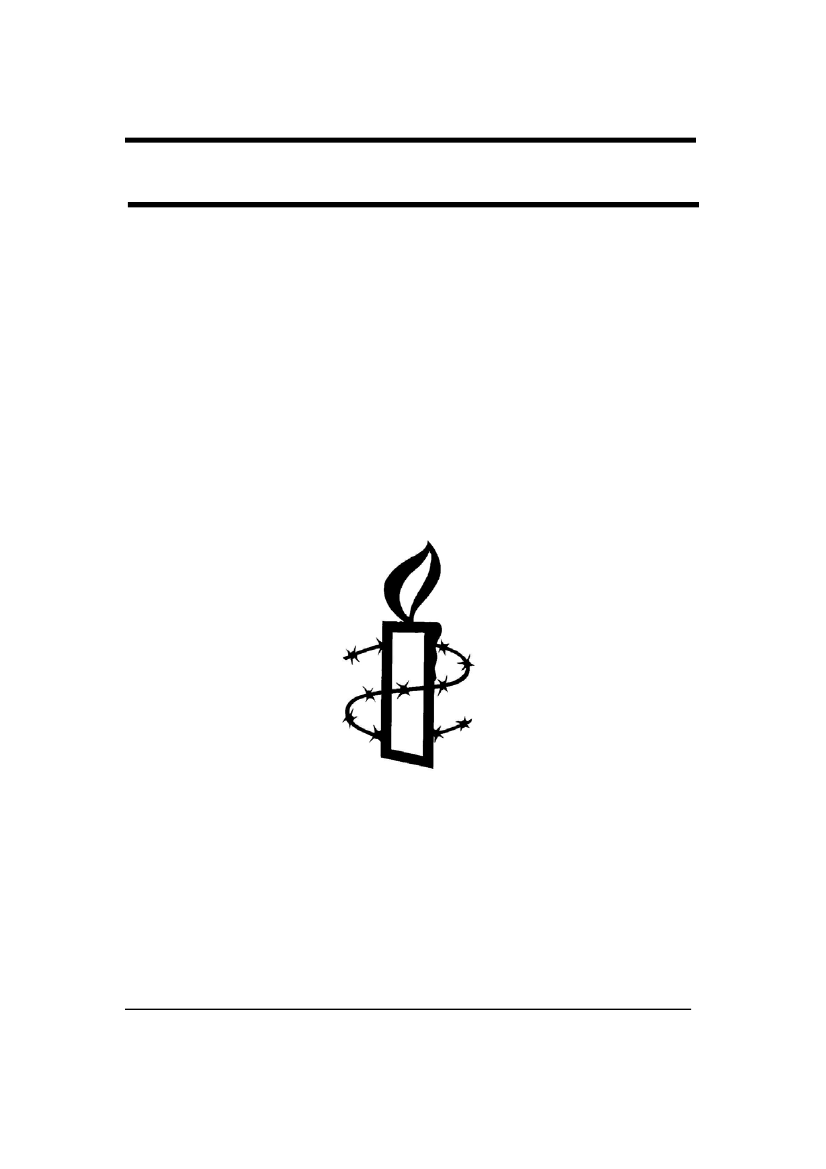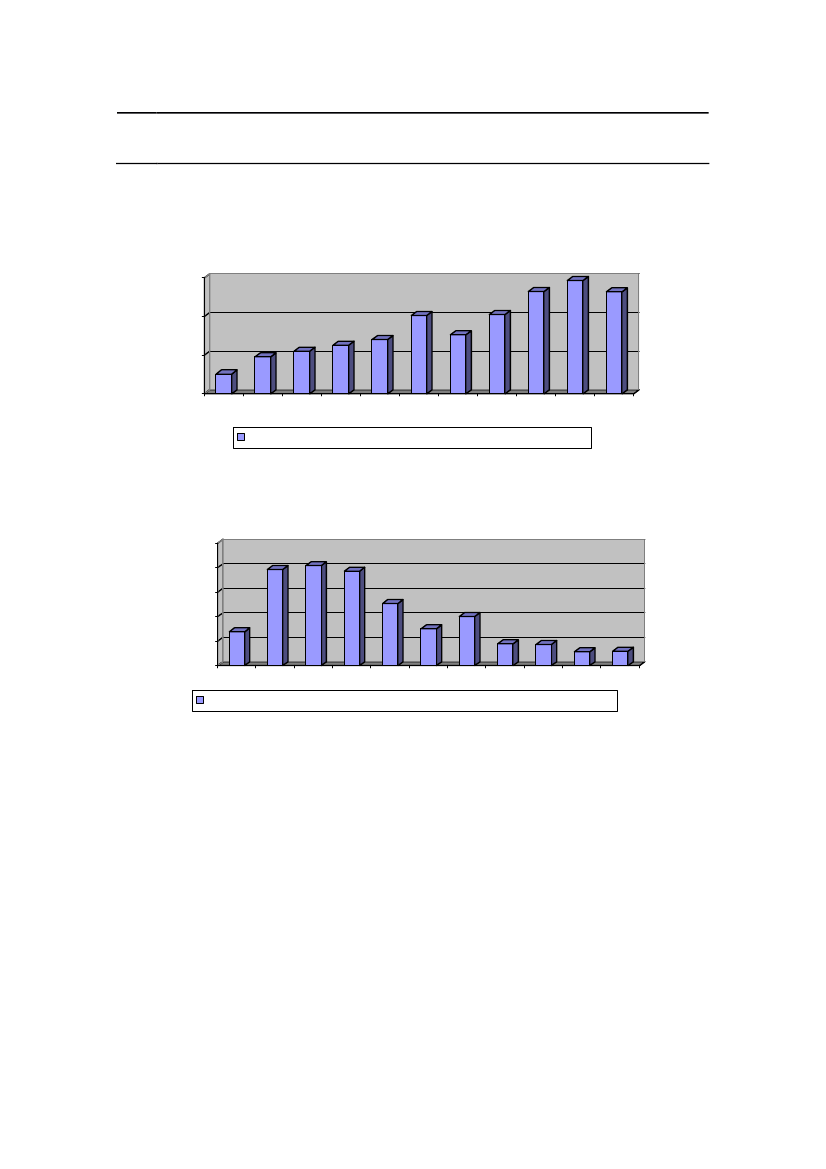Det Udenrigspolitiske Nævn 2006-07
Bilag 45
Offentligt
[EMBARGOED FOR: 22 March 2007]
Public
amnesty international
UNITED STATES OFAMERICAJustice delayedandjusticedenied?
Trials under the Military Commissions Act
March 2007AI Index: AMR 51/044/2007INTERNATIONAL SECRETARIAT, 1 EASTON STREET, LONDON WC1X 0DW, UNITED KINGDOM
2
Embargoed: 22 March 2007
Public
amnesty internationalUNITED STATES OF AMERICAJustice delayedandjustice denied?Trials under the Military Commissions Act22 March 2007AMR 51/044/2007
The Constitution of the United States stands as a bar against the conviction of anyindividual in an American court by means of a coerced confession. There havebeen, and are now, certain foreign nations with governments dedicated to anopposite policy: governments which convict individuals with testimony obtained bypolice organizations possessed of an unrestrained power to seize persons suspectedof crimes against the state, hold them in secret custody, and wring from themconfessions by physical or mental torture. So long as the Constitution remains thebasic law of our Republic, America will not have that kind of government.US Supreme Court, 1944
SummaryIn the “war on terror”, detainees in US custody have been treated as potential sources ofinformation first and potential criminal defendants a distant second. Now, more than fiveyears after detentions began, trials of a selected few detainees, plucked from years of secret orvirtually incommunicado detention and interrogations, are looming.These trials cannot be divorced from the context in which such proceedings would occur. Thiscontext is one of practices pursued in the absence of independent judicial oversight that havesystematically violated international law. A thread through the “war on terror” has been thepursuit of unchecked executive power and efforts to keep detainees captured and held outsidethe USA away from the ordinary courts. Under the government’s war paradigm, judicialconsideration ofhabeas corpuspetitions from “unlawful enemy combatants” is seen asunwarranted interference in military operations. In the absence of this basic safeguard againstenforced disappearance, arbitrary detention and torture, such violations have occurred.The government has also rejected the federal courts as the forum in which to bring any suchdetainees to trial. Instead, military commissions have been developed to fit the policyframework. Under the Military Commissions Act (MCA), signed into law on 17 October2006, the government may introduce evidence while keeping secret the methods used toobtain it. The military judge can close the proceedings in order to prevent the disclosure ofclassified intelligence activities. The right to trial within a reasonable time, guaranteed in USfederal courts and courts-martial, is denied to “unlawful enemy combatants”. Indeed, a
1. Overview: Trials set against a backdrop of unlawful practices ...... 1
AI Index: AMR 51/044/2007
Amnesty International March 2007
2
USA: Justice delayed and justice denied? Trials under the Military Commissions Act
previously secret 2003 Pentagon report on interrogations advised that not only the opennessof military commission trials, but also the timing of the prosecutions themselves, would haveto be weighed against “the need not to publicize interrogation techniques”.Whenprosecutionsare eventually brought, coerced evidence will be admissible.At any such trials, the defendants will be individuals who have been subjected to years ofindefinite detention, whose right to the presumption of innocence has been systematicallyundermined by a pattern of official commentary on their presumed guilt, including on the partof the President, who is given the power under the MCA to establish the commissions and actas final clemency authority. Among the defendants will be victims of enforced disappearance,secret detention, secret transfer (rendition), torture or other cruel, inhuman or degradingtreatment. Their treatment has not only been arbitrary and unlawful, it has been highlycoercive in terms of the interrogation methods and detention conditions employed.The USA faces challenges in bringing to trial anyone whom there are grounds to believe hasbeen involved in acts of transnational terrorism. However, a detainee’s right to a fair trial – tobe able to effectively challenge the state’s evidence in a trial conducted within a reasonabletime in a court that has jurisdiction over both defendant and crime – should not be prejudicedby any unlawful treatment to which the defendant or any other detainee has been subjected.These military commissions will be convened following a trail of illegality, with those to betried arbitrarily detained and ill-treated for years, and under the flawed provisions of the MCAand procedures in the Manual for Military Commissions (MMC). Given this context,Amnesty International does not believe that the trials will meet international standards offairness. Indeed, at least in the cases of some detainees, perhaps a majority of the 24 identifiedat the time of writing as potential defendants (listed in Appendices 1 and 2), the organizationquestions whether the commissions will be competent – in the sense of having the jurisdictionunder international law and standards – to conduct trials at all.The USA has used its global war paradigm to remove “alien unlawful enemy combatants”from the protections not only of the US Constitution, but international human rights law,including the fair trial standards enshrined in the International Covenant on Civil and PoliticalRights. It maintains that its activities outside the USA in the “war on terror” are exclusivelyregulated by the law of war, as it defines it. This contradicts the views of the InternationalCourt of Justice, the UN Human Rights Committee, the UN Committee against Torture, theUN Independent Expert on the Protection of Human Rights and Fundamental Freedoms whileCountering Terrorism, and the International Committee of the Red Cross, among others.Not only has the MCA in effect endorsed the war paradigm, it has backdated the “war” tobefore 11 September 2001 to allow the prosecution of individuals by military commission forcrimes committed before that date. The US government has suggested that the setting up ofmilitary commissions will allow the prosecution of individuals for acts that did not violate UScriminal laws at the time they were committed, in potential violation of a non-derogableprovision of international law. Application of the war paradigm also raises questions of theinconsistent or arbitrary application of trial rights given the USA’s intention to try individualsbefore military commissions for their alleged involvement in the same or similar crimes forwhich the US government has already tried others in federal court. These crimes include thebombing of the US embassies in Kenya and Tanzania in 1998, the bombing of the USS Colein Yemen in 2000, as well as the attacks in the USA of 11 September 2001.Amnesty International March 2007AI Index: AMR 51/044/2007
2. Fair trial standards do not evaporate in ‘war’............................... 12
USA: Justice delayed and justice denied? Trials under the Military Commissions Act
3
The US authorities have indicated that they may turn to civilian prosecutors in some instancesin military commissions because the experience gained by the Justice Department “in some ofthe earlier terrorist cases would make it logical for them to be part of a prosecution team”.Thus, when the government decides that it is favourable to its objectives, it may turn tocomponents of the criminal justice system, while denying that the system itself can be theappropriate forum for prosecutions. The defendant, by contrast, is denied the opportunity toseek the protections of the criminal justice system. Instead he must rely on the militarycommission process with its rules both unfavourable to the fair administration of justice andgenerating concern that the process has been developed to “launder” human rights violationsand to facilitate trials that would otherwise have been jeopardized by government misconduct.
3. One size fits all? The right to a ‘competent’ tribunal .................... 17
The right to a trial before a competent tribunal requires that the tribunal has jurisdiction overboth the individual and the offence in question. If a defendant is tried by a tribunal that doesnot have jurisdiction over them or the crime, the trial cannot be fair.Under the MCA, both the category of individuals and the offences that fall under thejurisdiction of commissions are over-broadly defined. The offences could include any numberof actions unrelated to international or non-international armed conflict. The individual neednot have been engaged directly in armed hostilities, or to have been near a zone ofinternational or non-international conflict.The question of the competence of military commissions arises as a result of the USA’sattempt to squeeze anyone it labels as “alien unlawful enemy combatant” into thejurisdictional remit of the commissions. Not only is this status unrecognized in internationallaw, the detainees comprise individuals taken into custody in different locations andcircumstances, governed by varying legal regimes under international law. They includepeople captured in international armed conflict who should have been presumed to beprisoners of war unless a promptly convened competent tribunal decided otherwise; civilianstaken into custody outside of zones of armed conflict; and some who were detained when theywere children.It is now nearly five years since the international armed conflict in Afghanistan ended andbecame non-international. Amnesty International believes that the failure of the USA toprovide those detained during the international conflict with prompt adjudication of theirstatus by a competent tribunal -- including David Hicks and Salim Hamdan, now facingcharges under the MCA -- rendered their detention arbitrary, in violation of internationalhuman rights law. In the absence of such determinations, their presumed status as prisonersof war would render their trials by commission unlawful under the Geneva Conventions.Five of the 10 people designated for trial by military commission under the Military Order ofNovember 2001, and likely to be the first charged under the MCA, were originally detained inPakistan. There was no state of international or non-international armed conflict in or betweenPakistan and the USA. The 14 individuals transferred in September 2006 from secret CIAcustody to military custody and possible trial in Guantánamo are all believed to have been
3.1 Individuals detained in international armed conflict.............................. 203.2 Individuals detained in non-international armed conflict ...................... 223.3 Civilians detained outside zones of armed conflict ................................. 223.4 No military trials for those detained as children..................................... 25
Amnesty International March 2007
AI Index: AMR 51/044/2007
4
USA: Justice delayed and justice denied? Trials under the Military Commissions Act
captured outside zones of armed conflict, including Pakistan, Thailand and United ArabEmirates. Other detainees currently in Guantánamo were captured in countries that haveincluded Pakistan, Bosnia-Herzegovina, Mauritania, Gambia and Egypt.Amnesty International considers that, under international law, such individuals should alwayshave been treated as criminal suspects, and therefore subject to international human rights lawand principles of criminal law. The organization believes that they should not be tried in frontof military tribunals of any kind. Having examined the jurisprudence of the UN HumanRights Committee and regional human rights bodies, the UN Special Rapporteur on theindependence of judges and lawyers has maintained that using military or emergency courtsto try civilians in the name of national security, a state of emergency or counter-terrorism runscounter to all international and regional standards and established case law.In March 2007, Omar Khadr was facing charges under the MCA. This Canadian national isaccused of offences committed in 2002 during the armed conflict in Afghanistan when he was15 years old. The USA has ratified the Optional Protocol to the Convention on the Rights ofthe Child on the involvement of children in armed conflict. Under its provisions, in the case ofchildren held because they participated in the international or non-international armed conflictin Afghanistan, the USA has an obligation to provide them with “all appropriate assistance fortheir physical and psychological recovery and their social reintegration”. Detaining childrenin indefinite military custody in Guantánamo Bay cannot meet this obligation. Neither cantrying such individuals in front of a military commission.
4. The right to an independent and impartial tribunal ..................... 27
The independence and impartiality of the tribunal is essential to a fair trial, indeed is so basicas to be an absolute right that may suffer no exception. The fact that there is no civiliancomponent to the military commissions raises concern as to whether they can meet therequirements of independence and impartiality.The MCA provides for a military judge – a serving officer of the US armed forces on activeduty – to preside over each military commission and to decide on questions of law, includingthe admissibility of evidence. The military judge must be certified as qualified to act as ajudge, in accordance with the Uniform Code of Military Justice (UCMJ).In promoting the military commissions, the US State Department has suggested that thejudges in a military system are more independent and less political than federal judges.Nevertheless, in the USA, unlike the ordinary trial-level federal courts, military tribunals,whether courts-martial or military commissions, are part of the political branches, rather thanthe judicial branch of government (Article III of the Constitution). They are established underArticle I of the Constitution (the legislative branch), and the decision-makers are under thecommand authority of the executive. Judges on Article III courts are appointed for life by thePresident with the “advice and consent” of the Senate. Military judges on Article 1 tribunalsdo not have the equivalent independence conferred by security and length of tenure. In 2001,an expert Commission pointed to a critical need to increase the independence of militaryjudges by establishing fixed terms of office for them. Its recommendation was not adopted.The other members of the military commission – at least five, but 12 if the case might resultin the death penalty – would be members of the US armed forces on active duty. They woulddecide questions of fact. The Secretary of Defense’s designee, the convening authority, is theperson who appoints to military commissions members of the US armed forces on active duty.
Amnesty International March 2007
AI Index: AMR 51/044/2007
USA: Justice delayed and justice denied? Trials under the Military Commissions Act
5
Amnesty International is concerned that the convening authority’s overarching role in theselection of commission members creates a condition of real or perceived lack ofindependence from the executive.The executive continues to control the detention universe in which the detainees findthemselves. It can decide when, if ever, to charge the detainees for trial by militarycommission. If the executive decides not to bring the detainee to trial or to drop theprosecution after the trial has started – whether for lack of evidence or for fear that the trialwould reveal unlawful government policies – the commission has no say in the continuingdetention. The detainee cannot bring ahabeas corpuspetition, either to the commission or toany other court. The absence of a framework of law upon which either the defendant or thecommission can draw leaves the defendant’s ability to prepare a defence in jeopardy andraises further questions about the independence of the commission.The military commissions will be called upon to make many decisions which will test theinstitution’s independence and impartiality and public perceptions of this crucial aspect of thetrials. Amnesty International is concerned that the military commissions will lack theindependence and impartiality necessary to subject to searching inquiry and reject thepoisonous fruits of internationally unlawful activities that have been carried out under the‘war powers’ of the Commander in Chief of the Armed Forces, the President.Only non-US nationals will be tried by military commission. Indeed, promoting the MCA, theWhite House emphasized that “Americans cannot by tried by the military commissions theadministration has proposed. Americans accused of war crimes and terrorism-related offenceswill continue to be tried through our [civilian] courts or courts-martial.”If the US authorities constitute a tribunal which hands down to a foreign national standards ofjustice which are inadequate and lower than a US citizen accused of the same offence wouldreceive in an already constituted court, the trials before it would fail to meet the test offairness; they would clearly be discriminatory, in violation of international law.As under the November 2001 Military Order, there are signs that the decision-making processdetermining whether and when people are to be charged for trial by military commission maybe influenced by the position adopted by the detainee' home government. In a detention andsmilitary commission system already marked by arbitrariness, discrimination, and lack ofindependent judicial involvement, any such disparate treatment would suggest anotherdimension to such flaws. Whether a defendant is brought to trial and whether that trial is fairshould not depend on the state of diplomatic relations between his government and thegovernment that is detaining him. In full equality, regardless of national origin, all detaineesfacing criminal charges have the right to a fair trial within a reasonable time conducted inaccordance with international law and standards.Once again the backdrop against which these trials will occur cannot be ignored. Although theMCA provides that “the accused must be presumed to be innocent until his guilt is establishedby legal and competent evidence beyond a reasonable doubt”, the right of all those detained inGuantánamo and elsewhere to be presumed innocent, including the 14 men transferred fromsecret CIA custody to Guantánamo for the stated purpose of trial by commission, has alreadybeen systematically undermined by a persistent official commentary on their presumed guilt,
5. Discriminatory application of fair trial rights ............................... 31
6. Damage done: Right to presumption of innocence ........................ 34
Amnesty International March 2007
AI Index: AMR 51/044/2007
6
USA: Justice delayed and justice denied? Trials under the Military Commissions Act
including by the President (the Commander in Chief of the Armed Forces), the official giventhe authority under the MCA to establish the commissions and act as final clemency authorityin any case. The prejudicial commentary contrasts with official comments in cases of allegedwar crimes and human rights violations committed by US troops.Under international law, persons who are detained pending trial on criminal charges must betried within a reasonable time or released pending trial. Furthermore, international lawrequires that proceedings in criminal cases be completed without undue delay. This right isalso recognized in the Sixth Amendment to the US Constitution. The right to a speedy trialunder the UCMJ stems from the Sixth Amendment right, and is similarly seen as essential toprotecting the “command and societal interest in the prompt administration of justice”. If theaccused is denied his or her constitutional right to a speedy trial, “the only possible remedy”is dismissal of the indictment and release of the detainee.The question arises as to how the right to a trial within a reasonable time fits into thedetention regime developed by the US government. After all, the question of trials has beenturned into a peripheral issue by this detention regime, demoted by the priority given tointelligence-gathering and protection of national security as the stated purposes of detention.The MCA makes no provision guaranteeing the right to trial within a reasonable time. Indeed,the Act expressly states that “any rule of courts-martial relating to speedy trial” under theUCMJ “shall not apply to trial by military commission”. Nevertheless, there are someguidelines for timing in the MMC.If the speedy trial procedures, such as they are, are violated, the military judge has the powerto dismiss the charges against the detainee. However, even if the judge were to dismiss thecharges with prejudice to the government, the remedy that would be available to someonecharged with a criminal offence in the USA – release from custody – is unavailable to the“alien unlawful enemy combatant”. In his case, the government could simply return him toindefinite detention. Indeed, even if a detainee is tried by a military commission and acquitted,he may be returned to indefinite detention. Clearly, the right to a trial within a reasonable timein such a case would have little meaning to the individual in question, and have done nothingto meet society’s interest in the prompt and fair administration of justice.Everyone arrested or detained - whether or not on a criminal charge - and everyone facing acriminal charge - whether or not detained - has the right to the assistance of legal counsel.Everyone charged with a criminal offence has the right to defend him or herself in person orthrough a lawyer.Detainees held in Guantánamo have been interrogated prior to their transfer to the base,including in Afghanistan or other countries, and by US agents and agents of other countries.Five years ago the USA began the process of interrogating detainees in Guantánamo with aview to possible prosecution. A previously secret 2003 Pentagon report noted that thegovernment intended to use detainee statements in support of prosecutions.Despite the use of "aggressive" interrogation techniques for possible prosecutorial purposes,no detainee was or has been provided legal representation during interrogations. By March2007, the 14 detainees transferred six months earlier from secret CIA custody for the statedpurpose of trial still had no access to legal counsel. Indeed, the administration was denyingAmnesty International March 2007AI Index: AMR 51/044/2007
7. A fiction: The right to trial within a reasonable time .................... 35
8. The right to counsel before, at and after trial ................................ 38
USA: Justice delayed and justice denied? Trials under the Military Commissions Act
7
legal representation to the 14 on the grounds that they possess and could relate to counseldetails of the secret CIA detention program, including interrogation techniques.At the same time, the criminal cases against these 14 detainees are being developed bygovernment lawyers. The authorities have said that it will take some time before the 14 casescome to trial because of their complexity. Similar complexity will be faced by the defence,and to deny legal representation even as the prosecution is developing the case is not only todeny the detainee’s right to counsel but to jeopardize his right to adequate time and resourcesfor the preparation of his defence. It constitutes a clear breach of the fundamental principle of“equality of arms”, sometimes referred to as the most important criterion of a fair trial.The right to a lawyer of choice for detainees charged for trial by military commission isrestricted under the MCA. A defendant may retain a civilian lawyer, but would have to bearthe cost unless that person offered their servicespro bono.The civilian lawyer must be a UScitizen and have passed stringent security clearance. A defendant is not able to choose as alawyer a non-US national, for example, a lawyer from his own country. According to thewording of the MCA, even if the defendant retains a US civilian lawyer with the necessarysecurity clearance, he will still be represented by a US military lawyer as associate counsel,even if that goes against the defendant’s wishes.The right to be defended by a lawyer of one’s choice recognizes the importance of trust andconfidence between the accused and their lawyer. This has been heightened in the case ofdetainees held in Guantánamo where the authorities have reportedly sought to undermine therelationships between detainees and theirhabeascounsel. One possible outcome of anybreakdown in trust as a result of such occurrences might be expected to be that somedefendants may choose to represent themselves. If this were the case, it would raise questionsof whether such a choice was genuinely voluntary.A defendant must be mentally competent to stand trial or to represent himself if he so chooses.Under the MCA, the military judge may order a mental examination if there are doubts aboutthe detainee' competence. The matter would then be referred to a board consisting of one orsmore health professionals who will report on the mental capacity of the defendant. It is notclear who these individuals will be, and whether they will be attached to the military detainingauthorities. Again questions of trust may arise. Medical personnel have been involved in theinterrogation of detainees in Guantánamo and elsewhere. Amnesty International believes thatany medical or mental health evaluation of defendants in the context of military commissiontrials should be culturally appropriate and conducted by independent health professionals.
9. The right to call and examine witnesses ......................................... 42
International law requires that a criminal defendant must be allowed to examine, or haveexamined, the witnesses against him and to obtain the attendance and examination ofwitnesses on his behalf under the same conditions as witnesses against him.The location and the circumstances in which the detainees are held, as well as the length oftime they have been detained, conspire against the capacity of a military commissiondefendant to locate and call witnesses who could testify in his defence. The record of theCSRT process also calls into question the willingness of the US military authorities to permitdetainees to call witnesses on their behalf.
9.1 Hearsay evidence...................................................................................... 439.2 Classified evidence ................................................................................... 46
Amnesty International March 2007
AI Index: AMR 51/044/2007
8
USA: Justice delayed and justice denied? Trials under the Military Commissions Act
Some provisions of the MMC give rise to serious concern. For example, a witness whoseidentity or appearance is classified or otherwise protected from disclosure can be allowed bythe military judge to be identified by a pseudonym and to testify from behind a protectivescreen. The witness would be out of the view of the defendant and his counsel, but within theview of the military judge and the commission members. Amnesty International is concernedthat, in the context of military commissions, to the extent that it would be the government thatwould offer and be allowed to offer such an anonymous witness, the defence would be leftconsiderably impaired in its capacity to assess or impeach the witness’s credibility.The use of hearsay evidence and classified evidence has particular potential to come intoconflict with the fair trial right of any defendant to be able to challenge the evidence. Inpromoting the MCA, the administration explained that the need to resort to such evidence waswhy the administration favoured military commissions over courts-martial.Hearsay evidence.The MCA provides for a more permissive use of hearsay than would beallowed in the US federal courts and in courts-martial. Under the MCA, evidence which themilitary judge determines has "probative value to a reasonable person" is admissible.Amnesty International believes that hearsay evidence, apart from limited categories and thensubject to appropriate safeguards and weighting, should be excluded. Hearsay evidenceshould never be the sole or principal evidence on which either conviction or sentence is based.The MCA not only allows the use of hearsay evidence with lower safeguards, the rules in theMMC may actually encourage its use. For example, if there is particular evidence that is “ofsuch central importance to an issue that it is essential to a fair trial”, but it is destroyed, lost orotherwise unavailable, the military judge can stop the proceedings, but only after finding thatthe government was in possession of the evidence and it was lost or destroyed in bad faith.Especially if the judge takes a permissive approach to the loss of evidence, first-handevidence may thus become second-hand hearsay. The same concern arises in relation towitness testimony. If a witness whose testimony “is of central importance to the resolution ofan issue essential to a fair trial” is deemed unavailable, the judge can allow the trial tocontinue if the government is not responsible for the unavailability. This is a broader standardthan exists in courts-martial under the UCMJ.The administration has accused critics of ignoring the fact that international tribunals allowthe use of hearsay evidence. This argument comes from a de-contextualized and selectivepostulation of international jurisprudence and ignores the fact that the use of hearsay evidenceby any international tribunal is part of a whole structure, with its own built-in safeguards andworking methods. Any particular procedure cannot simply be plucked from another systemand effectively replicated in the military commission process if the structure and otherprocedures of that process are themselves flawed.Moreover, in the international tribunals, the finders of fact and law are panels of judges,entirely independent of any government, and expert in international law. In any militarycommissions convened under the MCA, the finder of law would be a single US military judgewhose independence is in doubt. The finders of fact would be US military officers, who maynot have the necessary legal training, assigned to the case by the Secretary of Defense or hisdesignee. In addition, unlike the military commissions under the MCA, the internationaltribunals never have the death penalty as a sentencing option.
Amnesty International March 2007
AI Index: AMR 51/044/2007
USA: Justice delayed and justice denied? Trials under the Military Commissions Act
9
Classified evidence.No-one should be convicted of a criminal offence on the basis ofevidence that he or she has been unable to see or to challenge effectively. This does not meanthat the state does not have legitimate interests in keeping certain information from the publicrealm, but under international standards, any closure of trial proceedings from the public mustbe “exceptional”. Amnesty International further stresses that the purpose or effect of anyclosure of proceedings must not be the removal from public scrutiny of any human rightsviolations that may have occurred, including enforced disappearance and torture. Closure ofproceedings in such circumstances would undermine the integrity of the entire process.Under the MCA, the military judge may close all or part of the commission proceedings to thepublic, including upon making a finding that such closure is necessary to “protect informationthe disclosure of which could reasonably be expected to cause damage to the national security,including intelligence or law enforcement sources, methods, or activities”. This is a matter ofpotential concern. The CIA’s interrogation techniques, for example, are classified at “topsecret” level. On 6 March 2007, the Pentagon announced that CSRT hearings for the 14detainees transferred from secret CIA detention would be held in closed session “due to thehigh likelihood that these detainees might divulge highly classified information”. Thispresumably would be the same at a trial by military commission.In the military commissions, any classified information “shall be protected and is privilegedfrom disclosure if disclosure would be detrimental to the national security”. If classifiedinformation is disclosed to the defence, the military judge can issue a protective order toensure that it is not made public. Where the classified information is not to be disclosed, thejudge may authorize, but only “to the extent practicable”, the deletion of classified parts ofdocuments to be introduced as evidence or their substitution with a summary version or a“statement of relevant facts that the classified information would tend to prove”.The prosecution may also be permitted to introduce evidence while protecting from disclosurethe sources, methods, or activities by which the government acquired it, if the military judgefinds that the evidence is “reliable”. An unclassified summary of the sources, methods, oractivities may be provided to the defence, but again only “to the extent practicable andconsistent with national security”. These provisions also apply to any classified evidence that“reasonably tends to exculpate the accused”. Thus, the defendant may be denied access tosome or all government evidence that tends to prove his innocence, if that evidence isclassified and it is deemed impracticable to give a summary version of it. The prosecutionmay object to any examination of a witness or motion to admit evidence by the defence thatcould lead to the disclosure of classified information, and following such an objection themilitary judge would take “suitable action to safeguard such classified information”.Amnesty International is concerned that defendants may face an insurmountable barrier inrelation to certain classified evidence used against them. The defence may be denied theability effectively to challenge classified information or the methods used to obtain it. Ifdeletions, summaries or substitutions are considered impracticable, the defence may be deniedthe totality of the information deemed classified. Given that US detention and interrogationpolicies in the “war on terror” have violated international law, this is a matter for particularconcern in the context of these military commissions.A fundamental minimum fair trial standard is the right not to be compelled to testify againstoneself or to confess guilt. Another is that no statement may be admitted as evidence in any
10. Use of information obtained by unlawful methods ...................... 52
Amnesty International March 2007
AI Index: AMR 51/044/2007
10
USA: Justice delayed and justice denied? Trials under the Military Commissions Act
proceedings where there is knowledge or belief that the statement has been obtained as aresult of torture or other cruel, inhuman or degrading treatment. The MCA neither guaranteesthese rights nor requires the government to abide by its international legal obligations.Whatever its origins, the admission of evidence that has been obtained by torture or othercruel, inhuman or degrading treatment is antithetical to the rule of law. When it comes totrials, prosecutors should see themselves as the first line of defence in protecting the integrityof the proceedings by preventing the use of evidence that has been obtained by torture, ill-treatment or other unlawful methods. Given that practices such as secret detention, secretrendition, and torture or other cruel, inhuman or degrading treatment have been cleared bygovernment lawyers, Amnesty International is not confident that they will be opposed bygovernment prosecutors in the context of military commissions, and is concerned that theymay not be subject to the searching inquiries that allegations of such practices would morelikely face if raised in criminal trials conducted in the federal courts.The MCA states that “no person shall be required to testify against himselfat a proceeding ofa military commission”.However, this does not expressly prohibit the admission as evidenceof information earlier coerced from the defendant during his years in custody. Indeed, theMCA allows the Secretary of Defense to prescribe procedures under which a statement madeby the accused “shall not be excluded from trial by military commission on grounds ofalleged coercion or compulsory self-incrimination”. The MCA also expressly allows an oralconfession or admission to be “proved by the testimony of anyone who heard the accusedmake it, even it was reduced to writing and the writing is not accounted for”. Nocorroboration is required, unlike in trials by US courts-martial.The MCA prohibits the admission of any statement obtained by the use of torture. However,the USA defines torture more narrowly than under international law. In addition, the MCAwould allow the admission of evidence extracted under equally prohibited cruel, inhuman ordegrading treatment. The MCA differentiates between statements obtained before 30December 2005, when the Detainee Treatment Act (DTA) came into force, and statementsobtained after that date. This betrays a position that ignores the international legalrequirement that any statement obtained under cruel, inhuman or degrading treatment shouldnot be admitted into evidence, regardless of when it was obtained.Prior to the enactment of the DTA, there were more than four years of extraterritorialdetention operations by the USA in the “war terror”. Many thousands of interrogations ofdetainees took place during this period in Afghanistan, Guantánamo and elsewhere, by agentsof the US and other countries. All 10 people charged for trial by military commission underthe 2001 Military Order – and likely to be charged for trial by military commission under theMCA – had been detained for more than three years before the DTA came into force.Similarly all of the 14 men transferred from secret CIA custody to possible trial under theMCA in Guantánamo were taken into custody prior to the enactment of the DTA, most ofthem more than two years before.The USA’s reservations to international treaties mean that, even with the passage of the DTA,it only considers itself bound by the prohibition on cruel, inhuman or degrading treatment orpunishment to the extent that it matches existing US law. Indeed, the Justice Departmentreportedly considers that constitutional law allows the courts in effect to consider a slidingscale of abuse depending on the context in which it occurs. The wording in the MMC appearsto provide scope for the military judge at a commission trial to take this approach.
Amnesty International March 2007
AI Index: AMR 51/044/2007
USA: Justice delayed and justice denied? Trials under the Military Commissions Act
11
The military commission system under the MCA leaves the determination as to whatconstitutes torture and other ill-treatment and whether information extracted under it can beintroduced at a trial to the military and the executive authorities. The possible ramification ofthis for defendants in this process is illustrated by cases in which the military haveinvestigated allegations of torture and other ill-treatment, including under techniquesauthorized by the executive, and found that they had not been unlawful even wheninternational law had clearly been breached.Apart from statements by the individual appearing as a defendant before the militarycommission, evidence obtained through torture or other ill–treatment could be introducedthrough hearsay or statements from other detainees held in the coercive detention regime atGuantánamo or elsewhere.International standards prohibit the state from taking advantage of the situation of a detaineefor the purpose of compelling him to confess, to incriminate himself otherwise or to testifyagainst any other person.As well as the many explicit allegations of torture or other ill-treatment made by detainees in US custody in Afghanistan, Guantánamo and elsewhere,Amnesty International considers that the conditions in which many of them have been heldamount to cruel, inhuman or degrading treatment and are in themselves coercive.Everyone convicted of a criminal offence has the right to have the conviction and sentencereviewed by a higher tribunal according to law.Under the MCA, anyone convicted by a commission may have its findings and sentencereviewed by the convening authority. In addition, the Secretary of Defense “shall establish” aCourt of Military Commission Review made up of panels of not less than three appellatemilitary judges. The Secretary of Defense will appoint the judges, including the Chief Judge,to this Court, which would reside within the Office of the Secretary of Defense. Anyoneconvicted by a commission can appeal to this Court “in accordance with proceduresprescribed under regulations of the Secretary of Defense”. This review process would notfulfil the requirements that any appeal court be independent.The Court of Military Commission Review “may act only with respect to matters of law”, thatis, not of fact. The Court may only grant relief if “an error of law prejudiced a substantialtrial right of the accused”. The MCA reiterates that the limited right of appeal under the DTAwould apply. Under this, the US Court of Appeals for the DC Circuit would only be able toact “with respect to matters of law”, and the scope of its review is limited to consideration ofwhether the final decision was consistent with the standards and procedures specified by theMCA and, to the extent applicable, the Constitution and the laws of the United States. Inaddition, the MCA states that the US Supreme Court “may” review decisions of the DCCircuit Court of Appeals if it decides to do so. In the ordinary criminal justice system, theSupreme Court agrees to hear appeals in only a tiny percentage of cases that come before it.The limitations in scope of appellate review provided under the MCA may fall foul of therequirement of international law. The UN Human Rights Committee has stressed that anappeal solely on questions of law, without the opportunity for the appellate court to conductan evaluation of the evidence presented at trial is insufficient.Except for this limited right of appeal, the MCA states that no other “court, justice, or judgeshall have jurisdiction to hear or consider any claim or cause of action whatsoever,… relating
11. The right to appeal and the right to remedy ................................ 61
Amnesty International March 2007
AI Index: AMR 51/044/2007
12
USA: Justice delayed and justice denied? Trials under the Military Commissions Act
to the prosecution, trial, or judgment of a military commission…, including challenges to thelawfulness of the procedures of military commissions…”. Given the abuses to whichdetainees have been subjected during their detentions, this curtailment of post-convictionremedies is a serious problem.Under international law, a state must ensure that any person whose rights are violated has aneffective remedy. This is non-derogable, even in times of emergency. The militarycommissions, including the appeals process, are part of the universe of irremediableness anddiscrimination in which the detainees find themselves. The fact that they only apply to foreignnationals, and the fact that the MCA curtails the right of judicial review of the lawfulness andconditions of detentions and the right to remedy for human rights violations, but only in thecases of non-US citizens, renders both the commission process and the law itselfdiscriminatory, in violation of international law.Despite world trends towards abolition of the death penalty, despite the fact that theinternational community has agreed that capital punishment is not an option even for theworst crimes tried by international criminal tribunals, and despite growing opposition in theUSA to the death penalty in the face of evidence of its unreliability and unfairness even undera sophisticated judicial system, the MCA provides for the death penalty for a number ofoffences after trials of less rigorous standards.Amnesty International calls on states not to provide information for use in judicialproceedings taking place abroad in any case where the death penalty is being sought or mightbe imposed, unless they obtain satisfactory guarantees that a death sentence will not beimposed. No such assurances should be accepted as sufficiently reliable in the case of theUSA’s military commission trials, given that they operate in a near legal vacuum, and havebeen preceded by a trail of unlawfulness. Moreover, because of the likelihood of theunfairness of trials under the MCA and the context in which such proceedings would occur,Amnesty International calls on states not to provide any information to assist the prosecutionin military commission trials, even in cases where the death penalty is not sought.
12. The death penalty is not justice..................................................... 64
13. Conclusion...................................................................................... 6814. Framework for fair trials and ending unlawful detentions……..69Appendix 1: Guantánamo detainees charged………………………..72Appendix 2: From secret CIA custody to possible trial……………..74Appendix 3: Detainees captured outside zones of armed conflict…..76Endnotes………………………………………………………………..80
Amnesty International March 2007
AI Index: AMR 51/044/2007
Justice delayedandjustice denied?Trials under the Military Commissions Act1. Overview: A backdrop of unlawful practicesA brief government email dated 4 October 2002, entitledCamp Delta Update,speaksvolumes. It said that the next “Air Flow” – military-speak for detainees being transferred byplane from Afghanistan to the US Naval Base in Guantánamo Bay, Cuba – was set to becarried out between 2 and 10 November 2002. It continued: “There will be between 20 and 34new detainees on the flight. We strongly suggested total isolation for as long as possible forthese individuals to keep them away from the ‘veterans’ until all available information isobtained from them.”1A later Federal Bureau of Investigation (FBI) email, referring to thesame time period, reveals that “extreme interrogation techniques were planned andimplemented” against certain detainees held in Guantánamo.2When Khalid Sheikh Mohammed, described by the US government as the“mastermind” behind the attacks of 11 September 2001 was arrested in Pakistan in March2003, he was not brought to trial in US federal court (where he had previously been indicted)3,but instead put into secret Central Intelligence Agency (CIA) detention for the next three anda half years. Three days after his arrest, the US Attorney General said that “Khalid SheikhMohammed’s capture is first and foremost an intelligence opportunity”.4The CIA’sinterrogation techniques remain classified “top secret”, but among the methods reportedlyused against this and other detainees has been “water-boarding”, in effect mock execution bydrowning.5Now in Guantánamo, his own allegations of torture have not been made public.6In the “war on terror”, detainees in US custody have been treated as potential sourcesof information first and potential criminal defendants a distant second. Now, more than fiveyears after detentions began, trials of a selected few detainees are looming. Plucked fromyears of secret or virtually incommunicado detention and interrogations, these detainees willbe tried not by the ordinary courts, but by military commissions tailored to fit this broaderpolicy framework. The government may introduce evidence while keeping secret the methodsused to obtain it. The military judge will be able to close the proceedings in order to preventthe disclosure of classified intelligence activities. The right to trial within a reasonable time,guaranteed in US federal courts and courts-martial, is denied to “alien unlawful enemycombatants”. Indeed, a previously secret 2003 Pentagon report on interrogations advised thatnot only the openness of military commission trials, but also the timing of the prosecutionsthemselves, would have to be weighed against “the need not to publicize interrogationtechniques”.7Whenprosecutions are eventually brought, coerced evidence will be admissible.It is clear that any examination of the fairness of these forthcoming trials cannotignore the backdrop of international law-breaking practices against which they would occur.Even a far from exhaustive overview of this background is instructive.
UNITED STATES OF AMERICA
AI Index: AMR 51/044/2007
Amnesty International March 2007
2
USA: Justice delayed and justice denied? Trials under the Military Commissions Act
GlossaryCAT– UN Convention Against Torture andOther Cruel, Inhuman or Degrading Treatment orPunishment, ratified by the USA in 1992Committee against Torture– the expert bodyestablished by the CAT to monitor itsimplementationCIA– Central Intelligence AgencyCommon Article 3– Article 3 common to thefour Geneva Conventions of 1949Convening authority– The US Secretary ofDefense or his designee; responsible foroverseeing aspects of the military commissionprocess, including reviewing and approvingcharges,appointingmilitary commissionmembers, and reviewing verdicts and sentences.CSRT– Combatant Status Review TribunalDTA– Detainee Treatment Act of 2005FBI– Federal Bureau of Investigation
Five days after the attacks of 11September 2001, the Director of the CIAsent a confidential memorandum to his staffheaded “We’re at war”, stating that “All therules have changed”.8On the same day,Vice-President Dick Cheney said that in this“war”, US forces would have to operate on“the dark side” – the means, he suggested,including working with human rightsviolators, would justify the ends.9Thefollowing day, 17 September 2001, PresidentGeorge W. Bush signed a newly confirmedbut still-classified 14-page memorandum tothe CIA Director relating to the agency’s“authorization to detain terrorists”, andcontaining information on the methods bywhich this covert activity would take place,including in collaboration with othergovernments.10
A week later, the Justice Departmentadvised the White House that there wereICCPR– International Covenant on Civil andessentially no limits on the President’sauthority to respond to terrorist threats; thePolitical Rights, ratified by the USA in 1994“method, timing, and nature of the response”Human Rights Committee– the expert bodyestablished by the ICCPR to monitor itswas his to determine and did not have to belimited to “those individuals, groups, orimplementationstates that participated in the attacks on theICERD– International Convention on theWorld Trade Center and the Pentagon”.11OnElimination of All Forms of Racial13 November 2001, a week after the JusticeDiscrimination, ratified by the USA in 1994.Department had advised the White House onICRC– International Committee of the Red“the legality of the use of militaryCrosscommissions to try terrorists”12, PresidentBush signed a Military Order on theMCA– Military Commissions Act of 2006Detention, Treatment, and Trial of CertainMMC– Manual for Military CommissionsNon-Citizens in the War against Terrorism.UCMJ– Uniform Code of Military Justice, theThe Order not only provided for trials byUS military’s criminal codemilitary commission of foreign nationals, butalso detention without trial and denial ofhabeas corpus.The Justice Department advised the Pentagon that holding “enemy aliens” atGuantánamo should keep their detentions from the scrutiny of the US federal courts.13Thefirst detainees were transferred to the base two weeks later, on 10/11 January 2002, shackled,hooded, and tied down like cargo.
Amnesty International March 2007
AI Index: AMR 51/044/2007
USA: Justice delayed and justice denied? Trials under the Military Commissions Act
3
The White House Counsel drafted advice to the President that not applying theGeneva Conventions toal-Qa’idaand Taliban suspects would “preserve flexibility” in this“new kind of war”, including the “ability to quickly obtain information from capturedterrorists and their sponsors”, and would also “substantially reduce” the risk that USpersonnel would later be prosecuted for war crimes under the USA’s War Crimes Act.14TheUS Attorney General endorsed this approach as lawful.15A presidential memorandum, dated7 February 2002, said that “humane treatment” was “a matter of policy” (not law) andsuggested that there were detainees “who are not legally entitled to such treatment”.16Laterthat month, the Justice Department advised the Pentagon that the constitutional protectionsagainst self-incrimination did not apply to trials by military commission; as “entirely creaturesof the President’s authority as Commander-in-Chief”, such commissions were “notconstrained by the strictures placed on ‘criminal cases’ by…the Bill of Rights”.17A leaked Justice Department memorandum from 1 August 2002 concluded that“under the current circumstances, necessity or self-defense may justify interrogationmethods” amounting to torture under the USA’s extraterritorial anti-torture law.18Meanwhile,a recently confirmed but still-classified Justice Department memorandum of the same dateadvised the CIA on the legality of “alternative interrogation methods by which the CIA seeksto collect critical foreign intelligence to disrupt terrorist attacks”.19A leaked November 2002memorandum from the General Counsel of the Pentagon suggested that interrogationtechniques such as “the use of scenarios designed to convince the detainee that death orseverely painful consequences are imminent for him and/or his family”; “exposure to coldweather or water”; and “use of a wet towel and dripping water to induce the misperception ofsuffocation” were “legally available”.20An accompanying military document noted that suchtechniques were used by “other US government agencies”, a term used to include the CIA.21Four years and tens of thousands of detentions and interrogations later, on 17 October2006, President Bush signed into law the Military Commissions Act (MCA). Drafted mainlyby the administration before being approved by Congress, the Act was the legislative responseto the US Supreme Court’s ruling of 29 June 2006,Hamdan v. Rumsfeld.That case concernedSalim Ahmed Hamdan, a Yemeni national captured in November 2001 during theinternational armed conflict in Afghanistan and detained since June 2002 at the Guantánamodetention camp. He remains there with more than 350 other foreign nationals. In the words ofa federal judge in December 2006, their “lengthy detention beyond American borders butwithin the jurisdictional authority of the United States is historically unique”.22In the samemonth, another federal judge noted that the detainees had been “detained for many years inthe terrible conditions at Guantánamo Bay”. She continued: “It is often said that ‘justicedelayed is justice denied’. Nothing could be closer to the truth with reference to theGuantánamo Bay cases”.23Salim Hamdan was one of 10 Guantánamo detainees charged for trial by militarycommission under President Bush’s November 2001 Military Order. TheHamdanrulingconcluded that the military commissions were unlawful, as they had not been expresslyauthorized by Congress, and violated international law and US military law. By findingArticle 3 common to the four Geneva Conventions of 1949 to be applicable, the Supreme
Amnesty International March 2007
AI Index: AMR 51/044/2007
4
USA: Justice delayed and justice denied? Trials under the Military Commissions Act
Court also reversed President Bush’s determination that common Article 3 would not apply toal-Qa’idaor Taleban detainees taken into US custody. Common Article 3 – which reflectscustomary international law applicable to international and non-international armed conflicts(but does not apply where there is no such conflict) – guarantees minimum standards ofhumane treatment and fair trial.24The 2003 Pentagon report on interrogations, classified as “secret” by the Secretary ofDefense, noted that “the stated purpose of detainee interrogations is to obtain information ofintelligence value”, but added that “information obtained as a result of interrogations maylater be used in criminal prosecutions”.25Contradicting the government’s later claim thatmilitary commissions are the only practicable forum for trials of “enemy combatants”, itnoted that the US could prosecute detainees in the federal civilian courts, courts-martial ormilitary commission, and that “depending on the techniques employed, the admissibility ofany information may depend on the forum considering the evidence”. Trials in US federalcourts or courts-martial, it noted, would be “conducted pursuant to statutory or constitutionalstandards and limitations”. Under these protections, statements found to have been madeinvoluntarily, including under torture or other cruel, inhuman or degrading treatment orpunishment, would be inadmissible. In contrast, the report noted, the standard in militarycommissions was “simply whether the evidence has probative value to a reasonable person”.The USA prides itself on its constitutional protections. More than 60 years ago, twoand a half years after the USA entered World War II, the US Supreme Court wrote:“The Constitution of the United States stands as a bar against the conviction of anyindividual in an American court by means of a coerced confession. There have been,and are now, certain foreign nations with governments dedicated to an oppositepolicy: governments which convict individuals with testimony obtained by policeorganizations possessed of an unrestrained power to seize persons suspected ofcrimes against the state, hold them in secret custody, and wring from themconfessions by physical or mental torture. So long as the Constitution remains thebasic law of our Republic, America will not have that kind of government”.26In a major speech on 6 September 2006, President Bush responded to the SupremeCourt’sHamdan v. Rumsfeldruling. He confirmed what had long been reported – that theCIA had been operating a policy of secret detentions and “alternative” interrogationtechniques.27These techniques, used against individuals denied the protections of the USConstitution and international law, are reported to have included methods that violate theprohibition on torture or other cruel, inhuman or degrading treatment.28They have beenconducted against detainees in “secret, off-shore facilities… in order to help prevent terroristattacks”.29The fruits of these interrogations may yet be used in military commission trials.In the charged climate of the fifth anniversary of the 9/11 attacks, President Bush saidthat the Supreme Court’sHamdanruling had put the future of the secret CIA program indoubt, and legislation was needed to save it. He announced that he had that same day sent toCongress the “Military Commissions Act of 2006”. President Bush, whose administration’spolicies have been the primary obstacle to trials and judicial review, said that “families of
Amnesty International March 2007
AI Index: AMR 51/044/2007
USA: Justice delayed and justice denied? Trials under the Military Commissions Act
5
those murdered that day have waited patiently for justice” and “should have to wait nolonger”. If Congress would authorize the military commissions bill, the President continued,the 14 “high-value” detainees (see Appendix 2) he revealed had just been transferred toGuantánamo from the secret custody in which they had been held for up to four and a halfyears – including “the men our intelligence officials believe orchestrated the deaths of nearly3,000 Americans on September 11, 2001” – could “face justice”. With crucial mid-termcongressional elections looming, Congress passed the Military Commissions Act. In its haste,it passed a bad law, provisions of which are incompatible with international law.30Although secret detention is not expressly provided for in the MCA, President Bushemphasised – over and above the question of trials – that the legislation would allow thesecret program to continue:“The Military Commissions Act of 2006 is one of the most important pieces oflegislation in the war on terror. This bill will allow the Central Intelligence Agency tocontinue its program for questioning key terrorist leaders…When I proposed thislegislation, I explained that I would have one test for the bill Congress introduced:Will it allow the CIA program to continue? This bill meets that test.”31Vice-President Cheney also said that by passing the MCA, Congress had voted on“our authority to continue the interrogation program”, again emphasizing this over and abovethe question of trials. In the same interview, the Vice President appeared to endorse theinterrogation technique of “water-boarding”.32Only a matter of months earlier, the UNCommittee against Torture and the UN Human Rights Committee had made clear to the USgovernment that secret detention violates the USA’s international obligations and called forany unlawful interrogation techniques to be terminated. Then, on 20 December 2006, theInternational Convention for the Protection of All Persons from Enforced Disappearance wasadopted by the UN General Assembly. Among other things, this treaty serves to reinforce theinternational law prohibition against secret detention.33Fifty-seven countries signed theConvention when it opened for signature on 6 February 2007. The USA was not among them.Signing the MCA into law, President Bush claimed that it “complies with both thespirit and the letter of our international obligations”.34Yet this discriminatory legislationleaves the USA squarely on the wrong side of international law, both in its letter andaccording to the administration’s interpretation of its provisions. At its heart is the denial ofhabeas corpus– a basic safeguard against detainee abuse – coupled with other measuresfacilitating a lack of official accountability for human rights violations committed in the “waron terror”.35The other principal consequence of the MCA threatens to be the commencementof trials of “alien unlawful enemy combatants” by military commissions with the power toadmit coerced evidence, to keep secret the methods used to obtain evidence, and to handdown death sentences. This report focuses on these proposed military trials.In 1951, a US Supreme Court Justice wrote that “[t]he requirement of ‘due process’ isnot a fair-weather or timid assurance. It must be respected in periods of calm and in times oftrouble; it protects aliens as well as citizens…”36In a speech in London over half a century
Amnesty International March 2007
AI Index: AMR 51/044/2007
6
USA: Justice delayed and justice denied? Trials under the Military Commissions Act
later, the Director of Public Prosecutions, who is responsible for ensuring the independentreview and prosecution of criminal proceedings initiated by police in England and Wales, said:“Terrorism is designed to put pressure on some of our most cherished beliefs andinstitutions. So it demands a proactive and comprehensive response on the part of lawenforcement agencies. But this should be a response whose fundamental effect is toprotect those beliefs and institutions. Not to undermine them… We wouldn’t get farin promoting a civilizing culture of respect for rights amongst and between citizens ifwe set about undermining fair trials in the simple pursuit of greater numbers ofinevitably less safe convictions. On the contrary, it is obvious that the process ofwinning convictions ought to be in keeping with a consensual rule of law and notdetached from it. Otherwise we sacrifice fundamental values critical to themaintenance of the rule of law – upon which everything else depends.”37Government prosecutors – whether civilian or military lawyers, either of whom maybe appointed to prosecutions under the MCA – are required by international standards toreject evidence they “know or believe on reasonable grounds was obtained through recourseto unlawful methods”, including interrogation techniques or detention conditions thatamounted to torture or other cruel, inhuman or degrading treatment or punishment.38TheMCA, however, contains no such provision. Moreover, as already indicated, the record ofsenior US government lawyers in the “war on terror” does not inspire confidence thatinternational standards will be respected at military commission trials. These lawyers haveadvised, among other things, that secret detention is lawful; that the President can authorizetorture; that there are a wide array of acts that would “only” constitute cruel, inhuman ordegrading treatment and therefore would not be criminalized by the USA’s extraterritorialanti-torture statute; that the international ban on cruel, inhuman or degrading treatment did notapply to foreign nationals in US custody outside the USA; and that the Convention AgainstTorture’s Article 3 ban on transferring detainees to countries where they would face torturedid not apply to foreign detainees in US custody outside the USA.39Can we expect thatprosecutors at the military commissions will take a different view in line with internationallaw? If they, and the military judge, do not, it is highly unlikely that the trials will be fair.At trials by military commission, the defendants will be individuals who have beensubjected to years of indefinite and virtually incommunicado detention, whose right to thepresumption of innocence has been systematically undermined by a pattern of prejudicialofficial commentary on their presumed guilt, including on the part of the President, who underthe MCA is given the authority to establish the commissions and act as final clemencyauthority. Among the defendants will be victims of enforced disappearance, secret detention,secret transfer (rendition), torture or other cruel, inhuman or degrading treatment. Theirtreatment has not only been arbitrary and unlawful, it has been highly coercive in terms of theinterrogation methods and detention conditions employed. Half a century ago, the USSupreme Court stated:“Coerced confessions are not more stained with illegality than other evidenceobtained in violation of law. But reliance on a coerced confession vitiates aconviction because such a confession combines the persuasiveness of apparentAmnesty International March 2007AI Index: AMR 51/044/2007
USA: Justice delayed and justice denied? Trials under the Military Commissions Act
7
conclusiveness with what judicial experience shows to be illusory and deceptiveevidence. A forced confession is a false foundation for any conviction, whileevidence obtained by illegal search and seizure, wire tapping, or larceny may be andoften is of the utmost verity. Such police lawlessness therefore may not void stateconvictions while forced confessions will do so.”40A leaked FBI email dated 5 December 2003 referred to “torture techniques” that hadbeen employed by Department of Defense interrogators against a detainee at Guantánamo,and noted that the FBI’s Criminal Investigation Task Force believed that the techniques had“destroyed any chance of prosecuting this detainee”.41While this might be true in relation tothe normal federal courts, the disturbing reality is that the less exacting standards of the MCAcould yet allow military commissions to turn a blind eye to evidence of torture or other cruel,inhuman or degrading treatment. The April 2003 Pentagon report on interrogations discussedvarious interrogation techniques in relation to “unlawful combatants” held outside the USA,and noted the potential effect of the use of such techniques on future prosecutions. It noted,for example, that “environmental manipulation”, isolation, sleep deprivation, “sleepadjustment”, threatening a detainee with transfer to possible torture or death in a third country,forced prolonged standing, face or stomach slaps, and increasing “anxiety” through the “useof aversions”, such as the presence of a dog, could affect or “significantly” affect theadmissibility of statements. In each case, however, the report noted that this would be a“lesser issue for military commissions” than it would in the federal courts or courts-martial.42The Pentagon report was written at a time when the military commissions envisagedwere those established under the Military Order of November 2001. The MCA perpetuatesthis flaw, however. Under the MCA, a statement obtained by cruel, inhuman or degradingtreatment before 30 December 2005, when the Detainee Treatment Act (DTA) was signedinto law, is admissible if it is “reliable and possessing sufficient probative value”, and “theinterests of justice” would best be served by its admission.43While statements obtained undertorture, or statements obtained after the passage of the DTA and deemed to have violated it,are inadmissible under the MCA, the USA’s narrow definition of torture, together with theadmissibility of hearsay evidence with limited safeguards and the fact that the governmentcan keep secret the methods used to obtain evidence, limit even this partial protection.At the same time, most of those held in US custody outside the United States in the“war on terror” will not face trial by the USA. This was never the administration’s intention.Under its global “war” paradigm, under which international humanitarian law (the law of war)is only selectively applied and international human rights law disregarded, those detained as“unlawful enemy combatants” are held indefinitely in military detention for intelligence-gathering purposes and to prevent them returning to the global “battlefield”.44The status of“unlawful enemy combatant”, as a status with the legal consequences ascribed by the USA, isunknown in international law. Under the USA’s conception, access to lawyers is perceived asdetrimental to the interrogation process, external influences that break the “continuous”interrogation cycle.45Access to the courts is similarly seen as intruding on military operations.As the US Attorney General put it in January 2007, “the MCA’s [habeascorpus]restrictionsprevent terrorists captured on the battlefield from continuing to fight us in our courts.”46
Amnesty International March 2007
AI Index: AMR 51/044/2007
8
USA: Justice delayed and justice denied? Trials under the Military Commissions Act
Instead ofhabeas corpus,detainees are given clearly inadequate and ineffectiveadministrative review by Combatant Status Review Tribunals (CSRTs) which can rely oncoerced and classified evidence against an unrepresented detainee presumed to be an “enemycombatant”, broadly defined, unless he can prove otherwise. CSRT decisions are onlynarrowly reviewable by federal court. Indefinite detention may continue even after a CSRTdetermination that the detainee is “No Longer Enemy Combatant” (NLEC). Detainees havebeen held in Guantánamo for 20 months or more after an NLEC determination.47Thegovernment has argued that such delays are justifiable as part of “the Executive’s necessarypower to wind up wartime detentions in an orderly fashion”.48The CSRT’s determination of adetainee as an “unlawful enemy combatant” renders the detainee eligible for trial by militarycommission. Even those who are tried and acquitted by military commission can be returnedto indefinite detention.49The military commissions are part of a universe absent of judicialremedy for detainees and their families.At a press briefing on 18 January 2007, Brigadier General Thomas Hemingway, thelegal adviser to the Office of Military Commissions, reiterated that of the thousands ofdetainees who have been held by the USA in the “war on terror”, some 60 to 80 individualsmight eventually be tried by military commission, although he suggested that even this mightbe an overestimate.50He indicated that Salim Ahmed Hamdan and the other nineGuantánamo detainees who had been charged for trial under the military commission systemstruck down by theHamdanruling would likely “be in the initial queue” for charging andprosecution under the MCA. This suggestion was partly borne out in February 2007 whenthree of the 10 – Salim Hamdan, Canadian national Omar Khadr, and David Hicks, who isAustralian – became the first persons to face charges under the MCA. On 1 March 2007,David Hicks became the first of them to actually be charged for trial.The cases of the 14 detainees sent to Guantánamo from secret CIA custody wouldtake longer, Brigadier General Hemingway said, “because they are extraordinarily complex”.Part of this complexity is that, while the administration was successful in exploiting these 14cases to gain congressional approval for the MCA, the 14 also present the government with aproblem. Its treatment of them over the years has transformed them from individuals withallegedly high intelligence value to detainees with information about possible governmentcrimes, including enforced disappearance. The government has argued in court that what the14 know about the CIA program – such as the location of secret detention facilities,conditions of confinement in them, or what interrogation techniques have been used – neversees the light of day. Its case is that such information is classified as top secret, and wouldcause “exceptionally grave damage” to national security if revealed.51This may leave these14 particularly vulnerable to being returned to indefinite detention even if they were to beacquitted by military commission. If they were released, they would take knowledge of theCIA’s secret program with them. In March 2007, the Pentagon announced that CSRThearings for these 14 detainees would be held in closed session because the men “mightdivulge highly classified information”.52This could be the same at their trials.The government’s resort to national security justifications in preventing revelationsabout detention and interrogation policies that violate international law has profound
Amnesty International March 2007
AI Index: AMR 51/044/2007
USA: Justice delayed and justice denied? Trials under the Military Commissions Act
9
implications for the fairness of military commission trials. Under the MCA, not only cancoerced evidence be admitted, but any classified information “shall be protected and isprivileged from disclosure if disclosure would be detrimental to the national security”. Theprosecution may be permitted to introduce evidence while protecting from disclosure “thesources, methods, or activities by which the United States acquired the evidence”. Theprosecution may also object to any examination of a witness that could lead to the disclosureof classified information. It seems clear that the government will seek to prevent anydisclosure of what has gone on in the secret detention program or may occur in the future.53This may be extended to what has gone on in US custody in Guantánamo and in Bagram andKandahar airbases, forward operating bases and elsewhere in Afghanistan, where detaineeshave been interrogated incommunicado by various agencies amidst allegations of torture andill-treatment and where the CIA has conducted interrogations in secret facilities. Not onlymay certain defendants thus face an insurmountable barrier in relation to certain classifiedevidence used against them, the MCA facilitates the admission of evidence that has beenobtained by unlawful methods. This is antithetical to the rule of law.The USA faces challenges in bringing to trial anyone whom there are grounds tobelieve has been involved in acts of transnational terrorism. However, a detainee’s right to afair trial – to be able to effectively challenge the state’s evidence in a trial conducted within areasonable time in a court that has jurisdiction over both defendant and crime – should not beprejudiced by any unlawful treatment to which the defendant or any other detainee has beensubjected. Whether tried in civilian court, court-martial or military commission, anyonecharged with a criminal offence, including war crimes, must be tried before an independentand impartial tribunal established by law in proceedings which meet international standards offairness. These standards include:All persons must be equal before the courts and tribunals; there must be nodiscriminatory application of fair trial rights, including on the basis of nationality;Charges must be for internationally recognisable criminal offences;No one shall be held guilty of any criminal offence for an act that did not constitute acriminal offence under national or international law at the time it was committed;All persons are entitled to a fair and public hearing by a competent, independent andimpartial tribunal established by law;Trials must take place within a reasonable time;All persons must be presumed innocent until proven guilty; this also applies beforecriminal charges are filed;All persons must have full access to legal counsel of their own choosing, and haveadequate time and facilities to prepare their defence;All persons must be informed promptly and in detail in a language which theyunderstand of the nature and cause of the charge against them;All persons must be tried in their presence;
Amnesty International March 2007
AI Index: AMR 51/044/2007
10
USA: Justice delayed and justice denied? Trials under the Military Commissions Act
All persons must be able to examine, or have examined, the witnesses against themand to obtain the attendance and examination of witnesses on their behalf under thesame conditions as witnesses against them;No persons must be compelled to testify against themselves or to confess guilt;Statements or any other material obtained by torture or by cruel, inhuman ordegrading treatment or punishment must be excluded as evidence (except as evidencethat such treatment took place);All persons convicted of a crime must have the right to have their conviction andsentence reviewed by a higher tribunal according to law. Reviews must be made bycompetent, independent and impartial tribunals, be genuine and go beyond formalverifications of procedural requirements.On 18 January 2007, US Secretary of Defense Robert Gates released the Manual forMilitary Commissions (MMC), setting out rules for trials by military commission under theMCA, based on the rules for court-martial under the Uniform Code of Military Justice(UCMJ), the US military’s criminal code.54It was also announced that the Secretary ofDefense had designated Susan Crawford, a former judge on the US Court of Appeals for theArmed Forces, as the “convening authority” for military commissions.55The MMC assertsthat the “Manual will have an historic impact for our military and our country”.56While military commissions convened under the MCA would be an improved versionof their fundamentally flawed predecessors established under President Bush’s November2001 Military Order, in the words of the UK Attorney General “the changes made are toolittle and too late”.57These military commissions will be convened following a trail ofillegality, with those to be tried arbitrarily detained and ill-treated for years, and under theflawed provisions of the MCA and procedures in the MMC. Given this context, AmnestyInternational does not believe that the trials will meet international standards of fairness.Indeed, at least in the cases of some detainees, perhaps a majority of the 24 identified at thetime of writing as potential defendants (see Appendices 1 and 2), the organization questionswhether the commissions will be competent – in the sense of having the jurisdiction underinternational law and standards – to conduct trials at all.Amnesty International considers the attacks of 11 September 2001 to constitute acrime against humanity. As a matter of principle across all countries, the organization takesthe position that justice is best served by prosecuting all persons accused of war crimes,crimes against humanity, and other grave violations of international law, such as torture,enforced disappearance and unlawful killings, in independent and impartial civilian courtsrather than in military tribunals. There is an emerging international consensus for thisposition.58As described below, the UN Human Rights Committee has consistently stated thatthe jurisdiction of military courts should be restricted to trial of military personnel accused ofpurely military or disciplinary offences, and it has raised particular concern about cases wheremilitary courts exercised jurisdiction over “terrorism” offences.Civilians arrested outside of zones of international or non-international armed conflictshould not be tried by military tribunals of any kind. In addition, criminal offences such asAmnesty International March 2007AI Index: AMR 51/044/2007
USA: Justice delayed and justice denied? Trials under the Military Commissions Act
11
terrorism or conspiracy to commit terrorism should not be categorized as war crimes or madesubject to trial by military tribunal, if they did not occur in such an armed conflict. Simplylabelling the context as a “war” does not justify bypassing civilian jurisdiction.The right to trial before a competent, independent and impartial tribunal establishedby law requires that justice must not only be done, but must be seen to be done.59AmnestyInternational questions whether this can be achieved via military commission trials in thecontext of the US government’s sweeping war paradigm in which international human rightslaw has been bypassed and international humanitarian law selectively applied by the USA,and in which the military and other government agencies have been tainted by abuses and alack of independent investigations and accountability up the chain of command all the way tothe Commander in Chief of the Armed Forces, the President.On 14 February 2007, President Bush issued an executive order establishing militarycommissions under the MCA.60The order “supersedes any provision” of the November 2001Military Order “that relates to trial by military commission” (the remainder of the Order ondetention without trial remains in force).61Nevertheless, Amnesty International urges theUSA to reflect upon the positive benefits that would be gained by turning to the ordinarycivilian courts – even at this late stage – in the case of the relatively small number ofdetainees who are likely to face charges. Given that both before and since 11 September 2001,defendants, including foreign nationals, have been tried in the federal courts on chargesrelating to international terrorism, it would bring a consistency of approach.62Under theMMC, “unlawful enemy combatants may be delivered upon request to civilian authorities,foreign or domestic, for trial”.63Such a “demilitarization” of the USA’s prosecutorialresponse should herald a greater respect for human rights in the pursuit of security, a promisethe US government has made throughout the “war on terror”, but so far has failed to meet.In December 2001, 700 US law professors and lawyers signed a letter protesting themilitary commissions under the Military Order. They asserted that “the untested institutionscontemplated by the Order are legally deficient, unnecessary, and unwise”, and suggested that“the United States has a constitutional court system of which we are rightly proud. Time andagain, it has shown itself able to adapt to complex and novel problems, both criminal and civil.Its functioning is a worldwide emblem of the workings of justice in a democratic society.”64Five years later, the US government is still showing, in effect, a lack of confidence inthe ability of the federal judiciary to deal with this challenge. Instead it continues to advocatethe use of untested institutions operating in a near legal vacuum. Trials under the MCAthreaten to cut corners in the pursuit of a few convictions and to add to the injustice that theGuantánamo detention facility has come to symbolize.65The right to a fair trial, which includes the right to equality before the courts, is a keyelement of human rights protection that serves to safeguard the rule of law. AmnestyInternational once again urges the US authorities to abandon trials by military commissionsand to turn to the existing US courts to try detainees. Anyone who is not to be promptlycharged and tried in full accordance with international standards should be released with fullprotections against further abuse (see Section 14 for full framework of recommendations).
Amnesty International March 2007
AI Index: AMR 51/044/2007
12
USA: Justice delayed and justice denied? Trials under the Military Commissions Act
2. Fair trial standards do not evaporate in ‘war’A war paradigm, the underpinnings of which the US Supreme Court has acknowledged are“broad and malleable”66, has characterized the USA’s response to the attacks of 11 September2001. According to Vice-President Cheney, the administration “made a fundamental choiceafter 9/11 that we were going to go on the offence – that we had to treat this as a war, that9/11 wasn’t a criminal act or a law enforcement problem, it was a war.”67The past five yearshave shown this war paradigm to be dangerous for human rights, as the government hasextended it to cover areas more appropriately addressed by law enforcement measures, andeven then claimed that existing laws of war do not cover this “new paradigm.68International concern about the use of this war paradigm has grown. For example, inJanuary 2007, the Director of Public Prosecutions (DPP) for England and Wales said that“London is not a battlefield.” The people who were killed in the London bombings of 7 July2005 “were not victims of war” and the perpetrators were not “soldiers” as they claimed. “Weneed to be very clear about this”, the DPP continued, “On the streets of London, there is nosuch thing as a ‘war on terror’, just as there can be no such thing as a ‘war on drugs’.” He said:“Acts of unlawful violence are proscribed by the criminal law. They are criminal offences.We should hold it as an article of faith that crimes of terrorism are dealt with by criminaljustice.”69Meanwhile, the International Committee of the Red Cross (ICRC), the authoritativeinterpreter of the Geneva Conventions and other international humanitarian law (IHL), does“not believe that IHL is the overarching legal framework” applicable to the “war on terror”.70US officials have begun to acknowledge international misgivings.71Amnesty International fully acknowledges that there have been international and non-international armed conflicts in which the USA has been involved since launching the “waron terror”. The US-led interventions in Afghanistan in October 2001 and Iraq in March 2003were international armed conflicts and subsequently, after June 2002 and June 2004respectively, became non-international armed conflicts (as noted below, not all those held bythe USA in the “war on terror” were detained in the context of those armed conflicts).However, as the ICRC has said:“Whether or not an international or non-international armed conflict is part of the‘global war on terror’ is not a legal, but a political question. The designation ‘globalwar on terror’ does not extend the applicability of humanitarian law to all eventsincluded in this notion, but only to those which involve armed conflict”;72and:“Irrespective of the motives of their perpetrators, terrorist acts committed outside ofarmed conflict should be addressed by means of domestic or international lawenforcement, but not by application of the laws of war.”73A February 2006 report by five UN experts stressed that the legal regime applied tothe Guantánamo detainees “seriously undermines the rule of law and a number offundamental universally recognized human rights, which are the essence of democraticsocieties”. They noted that “the global struggle against international terrorism does not, as
Amnesty International March 2007
AI Index: AMR 51/044/2007
USA: Justice delayed and justice denied? Trials under the Military Commissions Act
13
such, constitute an armed conflict for the purposes of the applicability of internationalhumanitarian law”.74The US administration, however, has used its war paradigm to remove “alienunlawful enemy combatants” from the protections not only of the US Constitution, but also ofinternational human rights law. It has abused the already overbroad Authorization for the Useof Military Force passed by Congress on 14 September 2001.75It maintains that its activitiesoutside the USA in the “war on terror” are exclusively regulated by the law of war, as itdefines it, and that human rights law is inapplicable in this global armed conflict.76However,contrary to this assertion, it is widely agreed by international experts that “the two bodies oflaw, far from being mutually exclusive, are complementary.”77The International Court ofJustice (ICJ) has stated that:“The protection of the International Covenant on Civil and Political Rights does notcease in times of war, except by operation of Article 4 of the Covenant wherebycertain provisions may be derogated from in a time of national emergency.”78More recently, the ICJ has reiterated that:“More generally, the Court considers that the protection offered by human rightsconventions does not cease in case of armed conflict, save through the effect ofprovisions for derogation…”79The USA has made no such derogation, and even if it had, a number of fundamentalhuman rights provisions are explicitly non-derogable. Other international experts have alsomade clear that, whether or not there is a situation of armed conflict, international humanrights law does apply. For example, The UN Independent Expert on the Protection of HumanRights and Fundamental Freedoms while Countering Terrorism has said:“Human rights law does not cease to apply when the struggle against terrorisminvolves armed conflict. Rather, it applies cumulatively with internationalhumanitarian law… Despite their different origins, international human rights lawand humanitarian law share a common purpose of upholding human life anddignity”.80In January 2007, the UN Special Rapporteur on extrajudicial, summary or arbitraryexecutions stated that acceptance of the USA’s position “would have far reachingconsequences”. Indeed, he has said that it places “all actions taken in the so-called ‘global waron terror’ in a public accountability void, in which no international monitoring body wouldexercise public oversight. Creating such a vacuum would set back the development of theinternational human rights regime by several decades”.81One of the treaty monitoring bodies, the UN Human Rights Committee, has stated:“The [ICCPR] applies also in situations of armed conflict to which the rules ofinternational humanitarian law are applicable. While, in respect of certain Covenantrights, more specific rules of international humanitarian law may be specially relevantfor the purposes of the interpretation of Covenant rights, both spheres of law arecomplementary, not mutually exclusive.”82
Amnesty International March 2007
AI Index: AMR 51/044/2007
14
USA: Justice delayed and justice denied? Trials under the Military Commissions Act
The USA asserts that the ICCPR “is the most important human rights instrumentadopted since the UN Charter and the Universal Declaration of Human Rights, as it sets fortha comprehensive body of human rights protections.”83These protections include fair trialstandards, the right to equality before the law, and the right to challenge the lawfulness ofone’s detention in a court of law. In the “war on terror”, however, those the USA detainsoutside its territory are deemed not deserving of such protections. The USA maintains that theICCPR and at least Article 3 of the Convention against Torture and Other Cruel, Inhuman orDegrading Treatment or Punishment (CAT) do not apply to individuals in US custody outsideof the USA.84The UN expert bodies tasked with overseeing compliance with these twotreaties have rejected the USA’s position and called for change. In May 2006, the UNCommittee Against Torture urged the USA to:“recognize and ensure that the Convention [against Torture] applies at all times,whether in peace, war or armed conflict, in any territory under its jurisdiction”.85In July 2006, the UN Human Rights Committee called upon the USA to “review itsapproach and interpret the ICCPR in good faith” and in particular to:“acknowledge the applicability of the Covenant in respect of individuals under itsjurisdiction and outside its territory, as well as in times of war”.86Not only has the MCA in effect endorsed the administration’s war paradigm, it hasbackdated this “war” to before 11 September 2001 to allow the prosecution of individuals bymilitary commission for crimes committed before that date. Although the MCA states that it“does not establish new crimes that did not exist before its enactment, but rather codifiesthose crimes for trial by military commission”87, the State Department’s legal advisor hassuggested that the setting up of military commissions will allow the prosecution of individualsfor acts that did not violate US criminal laws at the time they were committed, in possibleviolation of the prohibition against the retroactive application of criminal liability, a non-derogable provision of the ICCPR and a fundamental general principle of international law.88The government has suggested, in addition to the fact that it is not holding mostdetainees with the intention of subjecting them to criminal prosecution, that one reason whymilitary commissions are necessary for those who are tried is that “our criminal courts simplydo not have extraterritorial jurisdiction” over the detainees it has in its custody; “These peoplehad never set foot in the United States or planned specific criminal acts in violation of ourfederal criminal statutes”.89This justification does not stand up to scrutiny. Signing the MCAinto law, President Bush said that it would be used to try by military commission not only9/11 conspirators, but also those believed responsible for the attack on theUSS ColeinYemen in October 2000 and “an operative” suspected of involvement in the bombings of theUS embassies in Kenya and Tanzania in August 1998.90Yet individuals have already beenindicted or tried in US federal court for their alleged involvement in these crimes.On 19 March 2007, the Pentagon announced that Walid bin Attash had admitted athis CSRT hearing in Guantánamo a week earlier to having been involved in the bombing ofthe US embassy in Nairobi and of theUSS Cole.91He was described in the 9/11 CommissionReport in 2004 as “a senior al Qaeda operative connected to the US embassy bombings, the
Amnesty International March 2007
AI Index: AMR 51/044/2007
USA: Justice delayed and justice denied? Trials under the Military Commissions Act
15
USS Coleattack, and the 9/11 attacks”, and ‘Abd al-Rahim al-Nashiri as “the mastermind oftheColebombing”.92Walid bin Attash was arrested in April 2003 in Karachi and ‘Abd al-Nashiri was arrested in the United Arab Emirates in November 2002. Rather than beingbrought to trial, they were hidden away in secret US detention. In September 2006, both menwere transferred from secret CIA custody to possible trial by military commission inGuantánamo. In May 2003,afterboth these arrests, the USA charged two Yemeni nationals –who were not in US custody – in connection with theUSS Colebombing. Jamal AhmedMohammed Ali al-Badawi and Fahd al-Quso (aka Abu Hathayfah al-Adani) were indicted inUS federal court in New York – not in a military commission in Guantánamo – with variousoffences, including conspiracy to murder and the murder of US nationals; conspiracy to use,using and attempting to use weapons of mass destruction; conspiracy to destroy, attempting todestroy and destroying US property and US defense facilities; using and carrying bombs anddangerous devices; and providing material support to a terrorist organization. In theindictment, ‘Abd al-Nashiri and Walid bin Attash were named as “un-indicted co-conspirators”.93The USA’s secret detention of ‘Abd al-Nashiri meant that he was triedinabsentiain Yemen in 2004. He was sentenced to death (along with Jamal Mohammed al-Badawi, whose death sentence was reduced to 15 years in prison in 2005). In 2003, theYemen authorities had indicated to Amnesty International that the reason the case had notcome to trial earlier had been the strong objection at that time by the US authorities.94Ahmed Khalfan Ghailani, a Tanzanian national arrested in Pakistan in July 2002, wasalso among the 14 detainees transferred to Guantánamo in early September 2006. He hadspent two years in secret CIA custody. Ahmed Khalfan Ghailani was indicted in 1998 – notfor trial in a military commission but in US federal court in New York – on numerous countsin relation to the embassy bombings in Kenya and Tanzania, including murder, attemptedmurder, conspiracy to murder, conspiracy to kill US nationals, conspiracy to use weapons ofmass destruction, and conspiracy to destroy building and property of the United States.95TheUSA has already tried and convicted four men in relation to the embassy bombings. Theywere sentenced to life imprisonment after being convicted trials in US federal court in 2001.At that time, the Director of the Federal Bureau of Investigation (FBI) stated that “Throughskill and perseverance, FBI personnel overcame major logistical challenges, which areinherent to crime scenes located in foreign countries, to conduct a thorough investigation thatled to the verdict rendered today.”96Presumably, neither the skill nor perseverance of the FBIhas diminished; only the policy has changed, in turn raising questions of inconsistent orarbitrary application of trial rights.In January 2003, UK citizen and allegedal-Qa’idaoperative, Richard Reid, wassentenced to life in prison in a federal court in the USA for attempting to blow up acommercial airliner over the Atlantic. At his sentencing, Richard Reid said to the federaljudge “I am at war with your country”. Judge William Young said: “You are not an enemycombatant. You are a terrorist. You are not a soldier in any war. You are a terrorist. To giveyou that reference, to call you a soldier gives you far too much stature. Whether it is theofficers of government who do it or your attorney who does it, or that happens to be yourview, you are a terrorist.”97Yet the US government is proposing to try other alleged non-USal-Qa’idamembers, labeled as “alien unlawful enemy combatants”, in military commissions.
Amnesty International March 2007
AI Index: AMR 51/044/2007
16
USA: Justice delayed and justice denied? Trials under the Military Commissions Act
The government waived its “right” to label John Walker Lindh as an “unlawfulenemy combatant” as part of a plea arrangement in 2002.98This US national was captured inlate 2001 during the international armed conflict in Afghanistan and charged in US federalcourt with, among other offences, conspiring withal-Qa’idato murder US citizens andproviding and conspiring to provide material support and resources to foreign terroristorganizations. Eventually, under a plea agreement, the government dismissed most of thecharges and Lindh pled guilty to supplying services to the Taliban and carrying explosiveswhile supplying such services. He was sentenced to 20 years in prison. US Attorney Paul J.McNulty, now US Deputy Attorney General, the second most senior law enforcement officialin the country, said: “[T]his case proves that the criminal justice system can be an effectivetool in combating terrorism”.99The government is still intending to try foreign nationals,including those captured in Afghanistan around the same time, in similar circumstances, andaccused of similar crimes as John Walker Lindh was originally charged with, in front ofmilitary commissions employing lower standards.John Walker Lindh’s plea agreement noted that if he wished to persist in his notguilty plea, he would “have the right to a speedy jury trial with the assistance of counsel… Ifa jury trial is conducted, the jury would be composed of twelve laypersons selected atrandom...The jury would have to agree unanimously before it could return a verdict of eitherguilty or not guilty.”100By contrast, foreign nationals selected for trial by military commissionafter years in detention without charge will face “juries” not of laypersons but of serving USsoldiers who can convict a defendant by a two-thirds concurrence of those members of thecommission present at the time the vote is taken.101In May 2006, Zacarias Moussaoui was sentenced in federal court in Virginia to lifeimprisonment after pleading guilty to six charges relating to the conspiracy of 11 September2001.102Yet when Khalid Sheikh Mohammed, described by the US government as the“mastermind” of the 9/11 attacks, was arrested in Pakistan in March 2003, he was put intosecret CIA detention for the next three and a half years and subjected to “alternative”interrogation techniques. Khalid Sheikh Mohammed, who spent several years at school andcollege in the USA in the 1980s, was indicted in 1996 in US federal court for his alleged rolein the Manila air (or “Bojinka”) plot to blow up a dozen US airliners over the Pacific, and wasthe subject of a reported US plan at the time of the indictment for the FBI to arrest him inQatar and transfer him to the USA for trial.103The government has said that it now intends totry Khalid Sheikh Mohammed before a military commission in Guantánamo.104The US authorities have indicated that they may turn to civilian prosecutors in someinstances in military commission trials because “the expertise may reside in the Departmentof Justice” and the experience gained “in some of the earlier terrorist cases would make itlogical for them to be part of a prosecution team”.105Thus, when the government decides thatit is favourable to its objectives, it may turn to components of the criminal justice system,while denying that the system itself can be the appropriate forum for prosecutions. Thedefendant, by contrast, is denied the opportunity to seek the protections of the criminal justicesystem. Instead he must rely on the military commission process with its rules bothunfavourable to the fair administration of justice and generating reasonable international
Amnesty International March 2007
AI Index: AMR 51/044/2007
USA: Justice delayed and justice denied? Trials under the Military Commissions Act
17
concern that the process has been developed to “launder” human rights violations and tofacilitate trials that would otherwise have been jeopardized by unlawful government activities.In his speech on 23 January 2007, the Director of Public Prosecutions in England andWales said that the Guantánamo detainees were “in purgatory”, denied the protections ofeither the Geneva Conventions or the US Constitution. He challenged the notion that it can beacceptable to compromise fundamental freedoms, including the right to a fair trial, in thestruggle against terrorism:“One of the worst manifestations of this approach around the world has been theincreasing resort to parallel jurisdictions… Here, quite deliberately, standardprotections are no longer available. Suspects are removed from the protections ofcriminal justice and placed, instead, in quasi-judicial or even non-judicial foradeliberately hostile to due process.”106“It is during our most challenging and uncertain moments that our Nation’scommitment to due process is most severely tested”, noted the US Supreme Court in 2004.107Four decades earlier it had said that “implicit in the term ‘national defence’ is the notion ofdefending those values and ideals which set this Nation apart.”108The US government hasfailed to uphold human rights in the “war on terror”, and has trodden on due process in thename of a “war” for national security. Trials by military commission threaten to deepen thedamage done. Discussing the military commissions in late 2006, the State Department LegalAdvisor said: “Have we gotten this right? I can tell you with certainty that our internationalpartners don’t think we have.”109He suggested, however, that “when our critics see how therecently signed Military Commissions Act works in practice, I believe they will realize that itoffers an appropriate framework for these trials. The Act provides all of the fundamentalguarantees of fairness and due process…”110Amnesty International strongly disagrees.
3. One size fits all? The right to a ‘competent’ tribunalThe primary institutional guarantee of a fair trial is that decisions will be made not by politicalinstitutions but by competent, independent and impartial tribunals established by law.A tribunal by nature must be formally or functionally independent of the executiveand legislative branches (see Section 4 below). The right to a trial before acompetenttribunalrequires that the tribunal has jurisdiction over both the individual and the offence in question.If a defendant is tried by a tribunal that does not have jurisdiction over them or the crime, thetrial cannot be fair.The MMC provides that the defendant and the offence must be subject to militarycommission jurisdiction, and states that “the judgment of a military commission withoutjurisdiction is void and is entitled to no legal effect”.111However, under the MCA, both thecategory of individuals and the offences that fall under the jurisdiction of commissions areover-broadly defined. As already noted, the MCA in effect also backdates the “war on terror”to before 11 September 2001, and allows the prosecution of “alien unlawful enemycombatants” for offences committed “before, on, or after” that date.112The USA considersthat any such detainees, if charged, can be tried by a one-size-fits-all military commission.
Amnesty International March 2007
AI Index: AMR 51/044/2007
18
USA: Justice delayed and justice denied? Trials under the Military Commissions Act
Regarding the crimes over which the military commissions are to be givenjurisdiction, the MCA states in open-ended wording that the commissions have jurisdictionover “violations of the law of war and other offences triable by military commission”.113Among the crimes that apparently fall into the latter category are the broadly-defined offencesof “providing material support for terrorism” and offences such as “conspiracy” [to commitone or more substantive offences triable by military commission] and “obstruction of justice”.These could include any number of actions unrelated to international or non-internationalarmed conflict.Amnesty International considers that offences that were not committed in aninternational or non-international armed conflict cannot, consistently with internationalstandards, be tried by military tribunals of any kind. Moreover, the existence of an armedconflict, such as occurred in Afghanistan after the US-led invasion on 7 October 2001, cannotbe used retroactively to designate as war crimes offences committed before that date. In theUS Supreme Court’sHamdan v. Rumsfeldruling, a plurality of the Justices affirmed that themilitary commissions formulated under the 2001 Military Order did not have the authority totry Salim Hamdan because the offence with which he was charged – conspiracy to violate thelaw of war – was not a recognized violation of the law of war. In February 2007, charges weresworn in the case of Salim Hamdan under the MCA, namely “conspiracy” and “providingmaterial support for terrorism”. Meanwhile, the MCA had stripped the courts of jurisdictionto hearhabeas corpusappeals from “alien unlawful enemy combatants”, the route taken byHamdan in his successful challenge to commissions under the 2001 Military Order.The US Attorney General has said that those who question “why terrorists should betried as war criminals” rather than “in civilian courts just like any other individual whocommits a crime” are ignoring the “existence and the practicalities of this armed conflict”. Inthe “war on terrorism”, he said, “members of al Qaeda are not merely commoncriminals…Their members continue to fight our Armed Forces on battlefields across theworld, and they will continue to do so until we stop them. Their crimes are nothing less thanwar crimes.”114Indeed, “we believe that as al Qaeda has scattered, the battlefield haswidened.”115Such a view, if accepted, would allow any government unilaterally to labelanywhere as a “battlefield” and apply the laws of war as it saw fit.The USA’s view of the world as the battlefield is reflected in the fact that detainees inGuantánamo have included people taken into custody in, for example, Bosnia, Mauritania,Thailand, Gambia, Zambia and Indonesia. It is also reflected in the broad definition that theMCA gives for who qualifies as an “unlawful enemy combatant”. To earn such a label, anindividual need not have been engaged directly in armed hostilities, or to have committed aterrorist act, or to have been near a zone of international or non-international conflict. Thedefinition is:“(i) a person who has engaged in hostilities or who has purposefully and materiallysupported hostilities against the United States or its co-belligerents who is not alawful enemy combatant (including a person who is part of the Taliban, al Qaeda, orassociated forces); or
Amnesty International March 2007
AI Index: AMR 51/044/2007
USA: Justice delayed and justice denied? Trials under the Military Commissions Act
19
(ii) a person who, before, on, or after the date of the enactment of the MilitaryCommissions Act of 2006, has been determined to be an unlawful enemy combatantby a Combatant Status Review Tribunal or another competent tribunal establishedunder the authority of the President or the Secretary of Defense”.116The MCA’s endorsement of the Combatant Status Review Tribunal (CSRT) meansthat it is the executive that determines who is an “unlawful enemy combatant” and thereforewho is eligible for trial by military commission. The CSRTs were devised by theadministration in response to theRasul v. BushandHamdi v. Rumsfelddecisions of the USSupreme Court in June 2004. These tribunals consist of three military officers who can relyon secret evidence or evidence coerced under torture or other ill-treatment in making theirdeterminations. The burden is on the detainee, without legal representation and generallydenied the possibility of obtaining witnesses or evidence, to disprove his “enemy combatant”status.Although the government is now describing the CSRTs as “Article 5-like” tribunals117(Article 5 of the Third Geneva Convention requires a prompt determination of whether aperson is entitled to protected status by a “competent tribunal”), they do not, in function orobjective, serve as such tribunals. Set up thousands of miles from Afghanistan, more than twoyears after detentions began, the CSRT does not have the power to determine prisoner of war(PoW) status. In early 2002, President Bush had determined categorically that no Taleban oral-Qa’idadetainee would qualify for PoW status (this followed advice drafted by the WhiteHouse Counsel that such a determination would “eliminate any argument regarding the needfor case-by-case determinations of PoW status”).118Detainees appearing before the CSRTswere told that the tribunals did not have the authority to make such a determination.119TheCSRT only determines whether or not a person is an “unlawful enemy combatant”, a statusunknown to article 5 and unrecognized under international humanitarian law generally. Underthe DTA, the CSRT determination of status can be challenged in the US Court of Appeals forthe District of Columbia (DC) Circuit, but only on seemingly narrow procedural grounds.120Indeed, in the words of one judge on that Court, the DTA “imposes a series of hurdles, whilesaddling each Guantánamo detainee with an assortment of handicaps that make the obstaclesinsurmountable”, in a process that is “inimical to the nature of habeas review”.121The UN Special Rapporteur on the promotion and protection of human rights andfundamental freedoms while countering terrorism has also raised his concern that under theMCA, the President has the power to determine who is an “unlawful enemy combatant”,“resulting in these detainees being subject to the jurisdiction of a military commissioncomposed of commissioned military officers. At the same time, the material scope of crimesto be tried by military commissions is much broader than war crimes in the meaning of theGeneva Conventions.”122Before any detainee can be brought to trial by military commission, the legal advisorto the convening authority must advise the latter as to whether a commission would havejurisdiction over the defendant and the crime alleged.123The convening authority is theSecretary of Defense or his designee. The legal advisor is appointed by the Secretary ofDefense, and may be civilian or military.124Once the convening authority has referred the
Amnesty International March 2007
AI Index: AMR 51/044/2007
20
USA: Justice delayed and justice denied? Trials under the Military Commissions Act
charges on for prosecution, there appears to be little or no meaningful opportunity fordefendant to challenge the jurisdiction of the commission to try them.The MMC states that a case against a charged detainee can be dismissed upon afinding that the military commission “lacks jurisdiction to try the accused for the offence”.125At the same time, the MCA “does not require that an individual receive a status determinationby a CSRT or other competent tribunal before the beginning of a military commissionproceeding. If, however, the accused has not received such a determination, he may challengethe personal jurisdiction of the commission through a motion to dismiss”.126The governmenthas indicated that all defendants will have had a CSRT determination by the time they cometo trial.127At the same time, if a detainee set for trial by military commission has an appeal ofthe CSRT’s finding that he is an “unlawful enemy combatant” pending in the DC CircuitCourt of Appeals, this will not be considered a reason to delay the trial.128In other words, thetrial of the defendant can proceed, even though judicial consideration, to the extent that it isprovided for under the MCA, is still pending as to whether he is even lawfully before thecommission.Under the MCA, the detainee cannot challenge the jurisdiction of the militarycommissions in ahabeas corpuspetition to the US courts, as the courts are stripped ofcompetency to considerhabeas corpuspetitions. The failure to provide for habeas corpuscontravenes the fundamental right to “take proceedings before a court, in order that that courtmay decide without delay on the lawfulness of his detention and order his release if thedetention is not lawful”(ICCPR, article 9(4)). In addition, only the US Court of Appeals forthe DC Circuit can consider challenges, but only after the military commission trial isfinalized, and only then on the same narrow procedural grounds that apply to its review ofCSRT determinations.129In summary, the question of the competence of military commissions arises as a resultof the USA’s attempt under its global war paradigm to squeeze anyone it labels as “alienunlawful enemy combatant” into the jurisdictional remit of the commissions. Not only is thisstatus unrecognized in international law, the detainees comprise individuals taken intocustody in different locations and circumstances, governed by varying legal regimes underinternational law. They include people captured in international armed conflict who shouldhave been presumed to be prisoners of war unless a promptly convened competent tribunaldecided otherwise; civilians taken into custody outside of zones of armed conflict; and somewho were detained when they were children.
3.1 Individuals detained in international armed conflictSalim Ahmed Hamdan, the Yemeni national whose case was at the centre of theHamdan v.Rumsfeldruling, and who was one of the first three detainees to face charges under the MCA,was captured in Afghanistan in November 2001. His capture occurred during the internationalarmed conflict that occurred in Afghanistan following the US-led intervention in October2001 until the establishment of a Transitional Authority on 19 June 2002. He was handed overto the US military by his Afghan captors in return for a bounty of thousands of US dollars.
Amnesty International March 2007
AI Index: AMR 51/044/2007
USA: Justice delayed and justice denied? Trials under the Military Commissions Act
21
The US took custody in a similar manner in respect of dozens of cases of individuals pickedup by Pakistan and Afghan forces.Under the Third Geneva Convention, Salim Hamdan and all other persons detained inthe context of the international armed conflict in Afghanistan – including David Hicks, AliHamza al Bahlul and Ibrahim Ahmed al Qosi, who were also charged under the 2001 MilitaryOrder and are likely to face trial under the MCA – should have been presumed to be prisonersof war and treated as such unless and until a “competent tribunal” determined otherwise(Article 5).130The burden is on the detaining authority to show that a detainee does notqualify for PoW status, on a case by case basis before a competent tribunal, not bypresidential fiat. Prisoners of war must be released and repatriated without delay after thecessation of hostilities unless they are to be tried for war crimes or other criminal offences.131As combatants, PoWs cannot be prosecuted for simply taking part in hostilities.132International humanitarian law imposes strict equality of treatment: PoWs held byone party to the conflict are entitled to the same rights guaranteed to members of that party’sforces or nationals. This means that PoWs held by the USA:Must be tried before the same courts and according to the same procedures as USpersonnel (Third Geneva Convention, article 102). They must be tried by militarycourts, unless members of the US armed forces could be tried for the same crimes incivilian courts (Third Geneva Convention, article 84). Although US soldiers aregenerally tried by military courts-martial, they can be tried in the civilian courts foroffences not of a purely military nature.Cannot be subjected to punishments for criminal offences which do not apply to themilitary personnel of the state detaining them and must not receive more severesentences (Third Geneva Convention, articles 82 and 102).133If Salim Hamdan or anyone else captured during the international armed conflict inAfghanistan had been found by a competent tribunal not to be entitled to PoW status, theywould necessarily have had the status of a civilian, protected under the Fourth GenevaConvention. They, too, should have been released at the end of that conflict unless chargedwith recognizably criminal offences (Fourth Geneva Convention, Article 133). Unlike PoWs,such persons may be tried under the law of the detaining state for taking up arms, as well asany criminal acts they may have committed.Denial of the right to a “fair and regular trial” for a PoW who is charged with a crimeor for a civilian protected person under the Fourth Geneva Convention can amount to a warcrime.134It is now nearly five years since the international armed conflict in Afghanistan ended.Amnesty International believes that the failure of the USA to provide Salim Hamdan andothers prompt adjudication of their status by a competent tribunal during that conflictrendered their detention arbitrary, in violation of international human rights law. In theabsence of such determinations, their presumed status as PoWs would render their trials bymilitary commission unlawful under the Geneva Conventions.
Amnesty International March 2007
AI Index: AMR 51/044/2007
22
USA: Justice delayed and justice denied? Trials under the Military Commissions Act
3.2 Individuals detained in non-international armed conflictAn unknown number of people held in Guantánamo, and hundreds in US custody inAfghanistan (the ICRC reported on 31 December 2006 that there were approximately 630detainees held in Bagram air base – all are held without charge or access to lawyers, thecourts, or relatives)135were taken into custody during the non-international armed conflict inAfghanistan, ongoing since the transfer of power to the Transitional Authority on 19 June2002. Common Article 3 of the 1949 Geneva Conventions, as well as the relevant rules ofcustomary international humanitarian law, applies to this conflict. International human rightslaw is also applicable.The ICRC has stated that if brought to trial for any crimes they may have committed,anyone detained in the non-international armed conflict in Afghanistan is “entitled to the fairtrial guarantees of international humanitarian and human rights law”.136TheHamdanrulingdeclared that common Article 3’s requirement for fair trial must be interpreted as broadly aspossible, and four of the Justices drew particular attention to the protections contained inArticle 75 of Additional Protocol 1 as well as in Article 14 of the ICCPR. Welcoming theHamdandecision, the UN Human Rights Committee noted that common Article 3 “reflectsfundamental rights guaranteed by the [ICCPR], in any armed conflict.”137Violations of common Article 3, including the “passing of sentences and the carryingout of executions without previous judgment pronounced by a regularly constituted court,affording all judicial guarantees which are generally recognized as indispensable by civilizedpeoples”, can amount to war crimes under international law.138Such a violation used to beprosecutable under the USA’s War Crimes Act until the MCA narrowed the scope of that Act.
3.3 Civilians detained outside zones of armed conflictAn unknown number of detainees were taken into custody outside a zone of international ornon-international conflict and subject to unlawful transfers to Afghanistan, Guantánamo andelsewhere (see Appendix 3). In such cases it is solely international human rights law that isapplicable; international humanitarian law does not apply. The situation is one of criminal lawenforcement, not war.For example, Pakistan national Muhammad Saad Iqbal al-Madni has said that he wasarrested in Jakarta, Indonesia, on 9 January 2002, taken to Egypt two days later and held thereuntil 12 April 2002. Thereafter he was flown to Afghanistan where he was held in US custodybetween 13 April 2002 and 22 March 2003, when he was transferred to Guantánamo where heremains. In other words, he was in Afghanistan at a time of international and then non-international armed conflictonlybecause he was taken and held there by the USA.Many detainees subsequently transferred to Guantánamo were originally taken intocustody in Pakistan. The US government has said that “the vast majority of the people whoare being held in Guantánamo… were captured around the end of 2001 and the beginning of2002, in or around Afghanistan and Pakistan.”139Some of the detainees arrested in Pakistanwere picked up on the Afghanistan/Pakistan border, having fled the conflict in Afghanistan.Even these individuals, however, were not necessarily combatants. For example, a group of
Amnesty International March 2007
AI Index: AMR 51/044/2007
USA: Justice delayed and justice denied? Trials under the Military Commissions Act
23
18 members of the Uighur community from China who ended up in Guantánamo had fled toPakistan from Afghanistan after their camp was bombed by the USA. They were reportedlysold into US custody after being held in custody in Pakistan for about two weeks. The Uighurdetainees have told their CSRTs that they had neither seen nor been involved in any combat inAfghanistan, and as far as Amnesty International is aware, the USA has produced no credibleevidence to the contrary. As one of the Uighur detainees, Abdul Razak, told his CSRThearing, “You accused me of being an enemy combatant. Did you get me from a combat zoneor from another country, Pakistan?” To which the CSRT President responded: “It doesn’tmatter in our definition. Location of the capture is not part of our definition”. Another of theUighurs, Abu Bakker Qassim, told the CSRT: “In my knowledge, an enemy combatant issomeone in a battle with a rifle in your hands captured from there; or a person retreating fromhis position. But I was captured in Pakistan without any weapons and arrested by localpeople”.140Other people detained in Afghanistan had not been in Afghanistan either during theconflict or at any other time, meaning that international humanitarian law is inapplicable totheir cases. In CSRT hearings, several of these detainees have also said that they were handedover to the USA by Pakistan forces in exchange for payments. In his recent memoirs,President Musharraf wrote that the CIA had paid millions of dollars in “bounties” and “prizemoney” for 369 suspects handed over by Pakistan to the United States.In seeking to explain their authority to hold individuals captured during the armedconflict in Afghanistan, including in Pakistan, the USA has said that “if a country is unwillingor unable to do something about the aggressors, another country has a right underinternational law to take action to defend itself…That is what our coalition forces were doingin Afghanistan. They were not there as policemen… There was a legal state of armed conflictin Afghanistan, where we were fighting the Taliban and Al Qaeda. As a result, we did havethe legal right to pick these people up… Our soldiers picked them up in a time of war.”141Yet,this was not the case with Pakistan. As shown above, Pakistan engaged in substantialcooperation with the USA.142There was no state of international or non-international armedconflict in or between Pakistan and the USA.Five of the 10 people designated for trial by military commission under the MilitaryOrder of November 2001, and likely to be charged under the MCA, were originally detainedin Pakistan, with only one of them apparently having recently crossed from Afghanistan.They include Binyam Muhammad, an Ethiopian national and British resident detained atKarachi airport and transferred to Morocco before being taken to Guantánamo.143The 14individuals transferred in September 2006 from secret CIA custody to military custody andpossible trial in Guantánamo are all believed to have been captured outside zones of armedconflict, including in Pakistan, Thailand and United Arab Emirates. Other detainees currentlyin Guantánamo were taken into custody in countries that have included Bosnia-Herzegovina,Pakistan, Mauritania, Gambia and Egypt.Amnesty International considers that, under international law, such individuals shouldalways have been treated as criminal suspects, and therefore subject to international humanrights law and principles of criminal law, including the right to prompt judicial review of the
Amnesty International March 2007
AI Index: AMR 51/044/2007
24
USA: Justice delayed and justice denied? Trials under the Military Commissions Act
lawfulness of their detention and to release if that detention was deemed unlawful. Theorganization believes that they should not be tried before military tribunals of any kind.The UN Human Rights Committee has consistently expressed concern at the broadjurisdiction of military courts, stating that the trials of non-military persons should beconducted in civilian courts before an independent and impartial judiciary, while thejurisdiction of military courts should be restricted to trial of military personnel accused ofpurely military or disciplinary offences.144The Committee has concluded that “thejurisdiction of military courts over civilians is not consistent with the fair, impartial andindependent administration of justice.”145The Committee has raised particular concern aboutcases where military courts exercised jurisdiction over “terrorism” offences or offencesagainst the security of the state, and has “deplored” the jurisdiction of military courts overcivilians accused of treason.146The Committee against Torture has expressed similar concernsand made similar recommendations.147Such concerns directly implicate the USA’s resort tomilitary commissions in the “war on terror”.The evolving international standards on this issue are also reflected in the draft UNPrinciples governing the administration of justice through military tribunals, submitted in2006 by the UN Special Rapporteur on this issue to the Sub-Commission on the Promotionand Protection of Human Rights. Principle 5 states that:“Military courts should, in principle, have no jurisdiction to try civilians. In allcircumstances, the State shall ensure that civilians accused of a criminal offence ofany nature are tried by civilian courts”.Principle 8 states:“The jurisdiction of military courts should be limited to offences of a strictly militarynature committed by military personnel. Military courts may try persons treated asmilitary personnel for infractions strictly related to their military status.”And Principle 9 states:“In all circumstances, the jurisdiction of military courts should be set aside in favourof the jurisdiction of the ordinary courts to conduct inquiries into serious humanrights violations such as extrajudicial executions, enforced disappearances and torture,and to prosecute and try persons accused of such crimes”.148The Inter-American Commission on Human Rights has stated that placing civiliansunder the jurisdiction of the military courts is contrary to article 8 of the Inter-AmericanConvention on Human Rights (the right to a hearing by a competent, independent andimpartial tribunal) and that military courts are special and purely functional courts designed tomaintain discipline in the military and police and ought therefore to apply exclusively to thoseforces.149The Inter-American Court of Human Rights reasoned as follows:“Transferring jurisdiction from civilian courts to military courts, thus allowingmilitary courts to try civilians accused of treason, means that the competent,independent and impartial tribunal previously established by law is precluded fromhearing these cases. In effect, military tribunals are not the tribunals previouslyAmnesty International March 2007AI Index: AMR 51/044/2007
USA: Justice delayed and justice denied? Trials under the Military Commissions Act
25
established by law for civilians. Having no military functions or duties, civilianscannot engage in behaviors that violate military duties. When a military court takesjurisdiction over a matter that regular courts should hear, the individual’s right to ahearing by a competent, independent and impartial tribunal previously established bylaw and, a fortiori, his right to due process are violated. That right to due process, inturn, is intimately linked to the very right of access to the courts.”150The African Commission on Human and People’s Rights has consistently maintainedthat the only purpose of military courts is to “determine offences of a purely military naturecommitted by military personnel” and that “military courts should not in any circumstanceswhatsoever have jurisdiction over civilians. Similarly, Special Tribunals should not tryoffences that fall within the jurisdiction of regular courts.”151Having examined the jurisprudence of the Human Rights Committee, the Inter-American Court of Human Rights, the European Court of Human Rights and the AfricanCommission on Human and Peoples’ Rights, the UN Special Rapporteur on the independenceof judges and lawyers, Leandro Despuy, maintained that using military or emergency courtsto try civilians in the name of national security, a state of emergency or counter-terrorism runscounter to all international and regional standards and established case law.152
3.4 No military trials for those detained as childrenIn February 2007, Omar Khadr became one of the first three detainees charged under theMCA. This Canadian national is accused of offences committed in 2002 during the armedconflict in Afghanistan when he was 15 years old.In the “war on terror”, the US authorities have detained a number of people who wereunder 18 years old at the time of being taken into custody. The Pentagon has said that “age isnot a determining factor in detention.”153There may have been at least 17 people held inGuantánamo who were under 18 years old at the time they were taken into custody. TheICRC has repeatedly said that it “does not consider Guantánamo an appropriate place todetain juveniles”, and has expressed particular concern “about the possible psychologicalimpact this experience could have at such an important stage in their development.”154Liketheir adult counterparts, some were detained outside zones of armed conflict. For example,Chadian national Muhammad Hamid al Qarani was arrested in a mosque in Karachi inPakistan in October 2001 at the reported age of 14 and held in prison for three weeks, wherehe was allegedly tortured. He was subsequently transferred to Peshawar, held there for 10days, and then transferred to US custody in late November 2001. He has alleged that he wassubjected to torture in US custody in the US air base at Kandahar in Afghanistan before beingtransferred to Guantánamo in early January 2002. Now 20 years old, he remains inGuantánamo, where he could yet face trial by military commission.The detention and interrogation of unrepresented children contravenes principlesreflecting a broad international consensus that the vulnerabilities of under-18-year-oldsrequire special protection. For example, international standards provide that detention shouldonly be used as a last resort. When detention is resorted to, Article 37 of the Convention onthe Rights of the Child (CRC) states that “every child deprived of his or her liberty shall have
Amnesty International March 2007
AI Index: AMR 51/044/2007
26
USA: Justice delayed and justice denied? Trials under the Military Commissions Act
the right to prompt access to legal and other appropriate assistance, as well as the right tochallenge the legality of the deprivation of his or her liberty before a court or other competent,independent and impartial authority, and to a prompt decision on any such action.” UnderArticle 40, if the child is alleged to have violated the law, they should be “treated in a mannerconsistent with the promotion of the child’s sense of dignity and worth, which reinforces thechild’s respect for the human rights and fundamental freedoms of others and which takes intoaccount the child’s age and the desirability of promoting the child’s reintegration and thechild’s assuming a constructive role in society”. The USA has signed the CRC and istherefore obliged under international law not to do anything that would undermine the objectand purpose of the treaty pending its decision on whether to ratify it.155The USA has ratified the Optional Protocol to the CRC on the involvement ofchildren in armed conflict. Under Article 6(3), in the case of children held because theyparticipated in the international or non-international armed conflict in Afghanistan, the USAhas an obligation to provide them with “all appropriate assistance for their physical andpsychological recovery and their social reintegration”. Detaining children in indefinitemilitary custody in Guantánamo Bay cannot meet this obligation. Neither can trying suchindividuals in front of a military commission.Article 4.1 of the Optional Protocol prohibits non-state armed groups from recruitingor using in hostilities anyone under the age of 18 years. Article 4.2 requires state parties to“take all feasible measures to prevent such recruitment”. While the USA was not in a positionto prevent the recruitment or use of children either by the Taliban oral-Qa’ida,its subsequenttreatment of Omar Khadr and other children alleged to have been used as combatants in theconflict in Afghanistan contravenes the spirit of Article 4 of the Optional Protocol.Principle 7 of the draft UN Principles governing the administration of justice throughmilitary tribunals states that:“Strict respect for the guarantees provided in the Convention on the Rights of theChild and the United Nations Standard Minimum Rules for the Administration ofJuvenile Justice (Beijing Rules) should govern the prosecution and punishment ofminors, who fall within the category of vulnerable persons. In no case, therefore,should minors be placed under the jurisdiction of military courts”.156In November 2005, Guantánamo detainee Omar Khadr was charged for trial bymilitary commission under the 2001 Military Order. The charges were laid more than threeyears after he was detained in Afghanistan at the age of 15. He has now been charged underthe MCA with murder and attempted murder in violation of the law of war, conspiracy,providing material support for terrorism, and spying. The charge of murder relates to theallegation that on or around 27 July 2002 (during the non-international armed conflict inAfghanistan), he threw a grenade which killed a US soldier, Sergeant Christopher Speer. Thecharge of attempted murder alleges that between June and July 2002, he converted land minesinto improvised explosive devices for use against US forces.Omar Khadr is no longer a child – after five years in military detention he is 20 yearsold – but the principle should still stand (otherwise governments could simply hold children in
Amnesty International March 2007
AI Index: AMR 51/044/2007
USA: Justice delayed and justice denied? Trials under the Military Commissions Act
27
custody until they became adults in order to treat them as adults). Neither he nor anyone elsewho was a child when taken into detention should be tried by military commission.
4. The right to an independent and impartial tribunalThe independence and impartiality of the tribunal is essential to a fair trial, as provided inarticle 14 of the ICCPR and other international standards. The UN Human Rights Committeehas clarified that the right to trial by an independent and impartial tribunal is so basic as to be“an absolute right that may suffer no exception”.157The UN Basic Principles on the Independence of the Judiciary provide that “everyoneshall have the right to be tried by ordinary courts or tribunals using established legalprocedures. Tribunals that do not use the duly established procedures of the legal processshall not be created to displace the jurisdiction belonging to the ordinary courts or judicialtribunals”. In addition, the Human Rights Committee has expressed concern that “quite oftenthe reason for the establishment of [special] courts is to enable exceptional procedures to beapplied which do not comply with normal standards of justice”.158The requirement of independence means that decision-makers administering justicemust be free to decide matters before them impartially on the basis of the facts and inaccordance with the law, without any interference, pressures or improper influence from anygovernment officials in any branch or elsewhere and for any reason.159It also means that thepeople appointed as judges are selected on the basis of objective criteria, including their legalexpertise and integrity.160The principle of impartiality demands that each of the decision-makers, whetherjudge or juror, be unbiased. Actual impartiality and the appearance of impartiality are bothindispensable for the effective administration of justice and ensuring the right to a fair trial.The Human Rights Committee has emphasised that the competence, independenceand impartiality of the courts must be “established by law and guaranteed in practice”. TheCommittee placed particular emphasis on “the manner in which judges are appointed, thequalifications for appointment, and the duration of their terms of office”.161The UN BasicPrinciples on the Independence of the Judiciary, which sets out the minimum conditionsnecessary to ensure judicial independence, requires that “judges, whether appointed or elected,shall have guaranteed tenure until a mandatory retirement age or the expiry of their term ofoffice, where such exists”. Principle 13 of the 2006 draft UN Principles on the administrationof justice through military tribunals emphasizes that “the organization and operation ofmilitary courts should fully ensure the right of everyone to a competent, independent andimpartial tribunal at every stage of legal proceedings from initial investigation to trial.” It alsostates that “military judges should have a status guaranteeing their independence andimpartiality, in particular vis-à-vis the military hierarchy”.162Amnesty International again emphasises the overall context in which the MCAmilitary commission trials will occur, and underscores the pressing need for strict adherenceto international standards and transparency if justice is to be done and seen to be done. Inrespect of military judges, they are subject to command discipline and so may lack certain
Amnesty International March 2007
AI Index: AMR 51/044/2007
28
USA: Justice delayed and justice denied? Trials under the Military Commissions Act
protections that would insulate ordinary judges from undue influence, such as length andsecurity of tenure.The commentary that accompanies Principle 13 of the draft UN Principles notes thelarge body of case law that “has spelled out the subjective as well as the objective content ofindependence and impartiality”. Bearing in mind the adage “justice should not only be donebut should be seen to be done”, the Special Rapporteur on the administration of justicethrough military tribunals notes that the concept of impartiality becomes more complex inrelation to military tribunals “as the parties have good reason to view the military judge as anofficer who is capable of being ‘judge in his own cause’ in any case involving the armedforces as an institution, rather than a specialist judge on the same footing as any other”. Thepresence of civilian judges within military tribunals, therefore, at a minimum could onlyreinforce the appearance of impartiality of such tribunals.163A notable improvement from the trials envisaged under the 2001 Military Order isthat a military judge, rather than no judge, will preside over military commissions under theMCA. The Act provides for a military judge – a serving officer of the US armed forces onactive duty – to preside over each military commission and to decide on questions of law,including the admissibility of evidence.164The military judge must be certified as qualified toact as a judge, in accordance with Article 26 of the Uniform Code of Military Justice.165Thejudge must have at least two years’ experience as a military judge after having been socertified.166The MCA provides that the Secretary of Defense “shall prescribe regulationsproviding for the manner in which military judges are detailed to such commissions”.167TheManual for Military Commissions submitted by the Secretary of Defense in January 2007describes these procedures. As under the UCMJ, the responsibility for assigning judges tospecific commissions will reside in judicial channels.168According to the MMC, a pool ofmilitary judges for military commissions is nominated by the Judge Advocates General of theUS Army, Navy and Air Force. From this pool, the convening authority (the Secretary ofDefense or his designee) selects an individual with “extensive experience as a military judge”to serve as the Chief Judge of the Military Commissions Trial Judiciary (Chief Trial Judge).169The Chief Trial Judge will assign military judges to each military commission.In promoting the military commissions, the US State Department has suggested that“the judges in a military system are more independent and less political than federal judges.Federal judges are selected by a partisan President, while judges on military courts areindividuals who have had ten, twenty, thirty years of training in military law and are, inessence, independent military lawyers.”170Nevertheless, in the USA, unlike the ordinary trial-level federal courts (District Courts), military tribunals, whether courts-martial or militarycommissions, are part of the political branches, rather than the judicial branch of government(Article III of the Constitution). They are established under Article I of the Constitution (thelegislative branch), and the decision-makers are under the command authority of theexecutive. Judges on Article III courts are appointed for life by the President with the “adviceand consent” of the Senate. Military judges on Article 1 tribunals do not have the equivalentindependence conferred by security and length of tenure.
Amnesty International March 2007
AI Index: AMR 51/044/2007
USA: Justice delayed and justice denied? Trials under the Military Commissions Act
29
In 1994, the US Supreme Court upheld the constitutionality of the method by whichmilitary judges are appointed under the UCMJ. The Court looked to history and traditionrather than to settled or evolving international standards. It noted that “although a fixed termof office is a traditional component of the Anglo-American civilian judicial system, it hasnever been a part of the military justice tradition”. It noted that, although Congress had madechanges to the US military justice system to make it “more like the American system ofcivilian justice”, it had rejected tenure for military judges.171The Court nonetheless concludedthat the lack of a fixed term of office for military judges did not violate the due process clauseof the US Constitution’s Fifth Amendment, and that under the UCMJ, military judges weresufficiently insulated from the effects of command influence to preserve judicial impartiality.In 2001, the Report of the expert Commission on the 50thAnniversary of the UniformCode of Military Justice noted that since its creation in 1951 the UCMJ had “failed to keeppace with the standards of procedural justice adhered to not only in the United States, but in agrowing number of countries around the world”. While acknowledging that the UCMJ hadbeen significantly revised in 1968 and 1983, the Commission emphasized that in recent years,“countries around the world have modernized their military justice systems, moving wellbeyond the framework created by the UCMJ fifty years ago.” The Commission identifiedareas “in need of immediate attention”. One recommendation, not implemented, was toincrease the independence of military judges by establishing fixed terms of office for them.The Commission concluded that while many military judges now possessed “at least somemodicum of judicial independence”, measures to increase this independence were “critical”,given the “central role of judges in upholding the standards of due process, preserving publicconfidence in the fairness of courts-martial, and bringing United States military justice closerto the standards being set by other military criminal justice systems around the world”.172In past human rights reports, the US State Department has criticized the lack ofindependence of military tribunals in other countries.173In contrast, the US government hasasserted that the military commissions under the MCA will be “sufficiently independent”.174Certainly, the rules contained in the MMC, mirroring the rules for courts-martial, prohibitanyone, including the convening authority, from applying inappropriate pressure on anymilitary judge, commission member, or prosecuting or defence counsel involved in thecommissions. Nevertheless, the fact that there is no civilian component to the commissionsthemselves raises concern as to whether they can meet the requirements of independence andimpartiality.The military judge will be called upon to make many decisions during militarycommissions which will test the institution’s independence and impartiality and publicperceptions of this crucial aspect of the trials. These decisions include areas that couldimplicate the executive in violations of international law, including on questions relating toenforced disappearance, secret detention, torture or cruel, inhuman or degrading treatment andarbitrary detention. In addition, the military judge will have to make decisions on questionsrelating to classified information in a context in which the administration has been widelycriticized for its over-use of classification, including in circumstances where classification is,by design or effect, concealing human rights violations. Amnesty International is concerned
Amnesty International March 2007
AI Index: AMR 51/044/2007
30
USA: Justice delayed and justice denied? Trials under the Military Commissions Act
that the military commissions would lack the independence and impartiality necessary tosubject to searching inquiry and reject the poisonous fruits of internationally unlawfulactivities that have been carried out under the ‘war powers’ of the Commander in Chief of theArmed Forces, the President.The other members of the commission – at least five members, but 12 (or no fewerthan nine if 12 individuals are not available) if the case in one in which the death penaltymight be applied – would be members of the US armed forces on active duty. They woulddecide questions of fact. The Secretary of Defense or his designee, the convening authority, isthe person who appoints to military commissions members of the US armed forces on activeduty, who “in the opinion of the convening authority, are best qualified for the duty by reasonof age, education, training, experience, length of service, and judicial temperament”.175As incourts-martial, commission members may be challenged for cause by either defense orprosecution, and each party may have one peremptory challenge (removal of commissionmember without giving a reason)Under the UCMJ, the convening authority is a military commander, whereas underthe MCA it is the Secretary of Defense or his designee. The Report of the Commission on the50thAnniversary of the Uniform Code of Military Justice, concluded that the “far-reachingrole of commanding officers in the court-martial process remains the greatest barrier tooperating a fair system of criminal justice within the armed forces.” The Commissionrecommended that one measure that should be taken immediately was to prohibit conveningauthorities from selecting the members of the court-martial. This recommendation was notimplemented. It added that “there is no aspect of military criminal procedures that divergesfurther from civilian practice, or creates a greater impression of improper influence, than theantiquated process of panel selection”. In the case of military commissions convened underthe MCA, Amnesty International is concerned that the convening authority’s overarching rolein the selection of commission members creates a condition of real or perceived lack ofindependence from the executive.By endorsing the CSRT process, the MCA also calls into question both theindependence and competence of the military commissions. Under the MCA, it will be theexecutive, through its flawed CSRT process, which will retain the power to determine whowill be subjected to trial by commission. If the military commissions accept without testingthe findings of the CSRTs – which the government argues are “entitled to a strongpresumption of regularity”176– they will effectively be approving torture and other ill-treatment, raising further doubts about the independence of these tribunals if they can provideno remedial action. A federal judge has said that the CSRTs “did not sufficiently considerwhether the evidence upon which the tribunal relied in making its ‘enemy combatant’determinations was coerced from the detainees”. She noted evidence that “abuse of detaineesoccurred during interrogations not only in foreign countries but also in Guantánamo itself.”177Six retired federal judges, in a brief submitted before the US Court of Appeals for the Districtof Columbia, have also emphasized that, according to the publicly available record:“The CSRT panels did little to evaluate the probity of allegedly coerced evidence,even when evidence such as medical records was readily available. Some CSRTsAmnesty International March 2007AI Index: AMR 51/044/2007
USA: Justice delayed and justice denied? Trials under the Military Commissions Act
31
found the torture allegations credible enough to warrant investigation by othermilitary authorities, but the panels nevertheless found the detainees to be enemycombatants without awaiting the outcome of the investigation… A number of CSRTssimply ignored testimony that the detainee’s prior statements to interrogators were theresult of torture… On occasion, CSRTs probed the torture allegations, but todemonstrate that US forces did not participate in the torture, not to determine whetherthe ‘confession’ was reliable or the product of coercion.”178The six judges said that they were not aware of a single CSRT that permitted thedetainee “to develop an evidentiary record regarding statements allegedly obtained by torture”.The government takes the view that under the MCA, the US Court of Appeals for the Districtof Columbia Circuit cannot consider facts outside the CSRT record when consideringchallenges to CSRT determinations, leaving the CSRT’s comprehensive neglect in relation tothe torture issue without remedy for the detainee.The executive continues to fully control the detention universe in which the detaineesfind themselves. It can decide when, if ever, to charge the detainees for trial by militarycommission. If the executive decides not to bring the detainee to trial or to drop theprosecution after the trial has started – whether for lack of evidence or for fear that the trialwould reveal unlawful government policies – the commission has no say in the continuingdetention. The detainee cannot bring ahabeas corpuspetition, either to the commission or toany other court. Under the MCA, apart from a limited right of appeal (see below) no “court,justice, or judge shall have jurisdiction to hear or consider any claim or cause of actionwhatsoever,… relating to the prosecution, trial, or judgment of a military commission…,including challenges to the lawfulness of the procedures of military commissions…”.179The US Attorney General has said that “what is extraordinary is how much – nothow little – our law protects enemy combatants.”180However, although the militarycommissions are “established by law” through the passage of the MCA, they will neverthelessoperate in something approaching a legal vacuum. Trials will be held outside US territory andonly non-US nationals will be subject to them. The US government will continue to take theposition that neither the ICCPR, nor the US Constitution will apply to these detainees. Neithercan any defendant turn to the Geneva Conventions; under the MCA any “alien unlawfulenemy combatant subject to trial by military commission” is prohibited from “invok[ing] theGeneva Conventions as a source of rights.”181Although, the rules for military commissionare based upon the procedures for trial by courts martial under the UCMJ, neither the UCMJnor its precedents are binding on trials by military commission.182The absence of aframework of law upon which either the defendant or the commission can draw leaves thedefendant’s ability to prepare a defence in jeopardy and raises further questions about theindependence of the commission.
5. Discriminatory application of fair trial rightsUnder the MCA, only foreign nationals designated as “unlawful enemy combatants” can besubjected to trial by military commission. In promoting the Act, the White House stressedthat “Americans cannot by tried by the military commissions the administration has proposed.
Amnesty International March 2007
AI Index: AMR 51/044/2007
32
USA: Justice delayed and justice denied? Trials under the Military Commissions Act
Americans accused of war crimes and terrorism-related offences will continue to be triedthrough our [civilian] courts or courts-martial.”183Extraordinary courts may not be created to try groups of people for criminal offenceson the basis of a distinction of any kind, including their national origin. Such courts wouldcontravene the principle of equality before the courts and the principle of non-discrimination,a fundamental principle of international law, and one which runs through all human rightslaw.184If the US authorities constitute a tribunal which hands down to a foreign nationalstandards of justice which are inadequate and lower than a US citizen accused of the sameoffence would receive in an already constituted court, the trials before it would fail to meetthe test of fairness; they would clearly be discriminatory.Under the ICCPR, all persons are equal before the law, entitled without anydiscrimination to the equal protection of the law (Article 26), and “shall be equal before thecourts and tribunals” (Article 14). Each state party to the ICCPR undertakes to respect and toensure to all individuals within its territory and subject to its jurisdiction the rights enshrinedin the treaty, without distinction of any kind, including on the basis of national origin (Article2). The Human Rights Committee has stated the general rule that “each one of the rights ofthe [ICCPR] must be guaranteed without discrimination between citizens and aliens.”185Similarly under ICERD, everyone has the right to “equal treatment before thetribunals and all other organs administering justice” (Article 5). The Committee onElimination of Racial Discrimination has called on parties to ICERD, of which the USA isone, to ensure in the administration of justice “that non-citizens enjoy equal protection andrecognition before the law” and any “non-citizens detained or arrested in the fight againstterrorism are properly protected by domestic law that complies with international humanrights, refugee and humanitarian law”.186The Committee has stressed that although Article1.2 provides for the possibility of differentiating between citizens and non-citizens, that articleshould not be interpreted to undermine the “basic prohibition on discrimination” or to “detractin any way from the rights and freedoms enshrined in international human rights law,including the ICCPR.187In 2002, after John Walker Lindh, a US national captured during the armed conflict inAfghanistan was charged in federal court while foreign detainees were left in legal limbo inGuantánamo, a Pentagon spokesperson said that “as we’ve shown with John Walker, the UScitizenship does make it a different case and a different kind of treatment”.188AlthoughPresident Bush has repeatedly stated that “equal justice” is one of the “non-negotiabledemands of human dignity”, the USA is still intending to try foreign nationals, includingthose detained around the same time, in similar circumstances, and accused of similar crimesas John Walker Lindh originally was, in front of military commissions employing lowerstandards than apply either in the civilian courts or courts-martial.As part of his plea agreement, John Walker Lindh agreed to testify at future trials,including military tribunals. The government agreed to forego “any right it has to treat thedefendant as an unlawful enemy combatant based on the conduct alleged in the [original]
Amnesty International March 2007
AI Index: AMR 51/044/2007
USA: Justice delayed and justice denied? Trials under the Military Commissions Act
33
indictment”.189The government recommended that Lindh be given credit for theapproximately seven weeks he had been in the custody of the US military before beinghanded over to civilian jurisdiction. In contrast, military commission defendants could bereturned to indefinite executive detention after acquittal or after having served a sentence afterconviction. There is no express provision in the MCA to credit time spent in untried detention.Under the November 2001 Military Order, the decision-making process determiningwhether and when people were to be charged for trial by military commission appeared to beinfluenced by the position adopted by the detainees’ home governments. British nationalsFeroz Abbasi and Moazzam Begg, for example, were made eligible for trial by militarycommission in July 2003, but were transferred to the UK and released without charge after theUK government strongly opposed the proposed commissions as unfair. In contrast, theAustralian government supported the USA’s intention to try David Hicks by militarycommission under the Military Order and he remained charged for trial until theHamdanruling struck the process down. Although the Australian authorities have continued to remaingenerally supportive of the US government’s revised military commission system under theMCA, in the face of domestic public concern they have begun to express disquiet about thelength of time that Hicks has been held without trial. Prime Minister John Howard, who hassaid that “five years is far too long” for someone to be detained untried, indicated on 20February 2007 that in a telephone call that day, President Bush had given a “very directassurance” that Hicks’ prosecution would be expedited. Amnesty International is not awareof any other government having been given such assurances. On 1 March 2007, the Pentagonannounced that David Hicks was the first detainee to be charged under the MCA, and hisarraignment was subsequently set for 26 March 2007.190On 2 March, the Australian Ministerfor Foreign Affairs, Alexander Downer, asserted:“It’s a tribute to the degree of influence that the Australian Government has inWashington, and the strength of the relationship that, of all the people held inGuantánamo Bay, the one Australian there is the first person to be tried…I can’tbelieve that an Australian Government which was anti-American would have anyhope of achieving that. Our Government has got Hicks to be the first person to betried… We’ve got an Australian citizen here… [of] the 300 to 400 people I believe[are] in Guantánamo Bay, there’s one Australian. And we’ve got this Australian tothe head of the queue in terms of trial. And that’s a good achievement.”191In a detention and military commission system already marked by arbitrariness,discrimination, and lack of independent judicial involvement, the disparate treatment amongdetainees as described above suggests another dimension to such flaws. AmnestyInternational reiterates that whether a defendant is brought to trial and whether that trial is fairshould not depend on the state of diplomatic relations between his government and thegovernment that is detaining him. In full equality, regardless of national origin, all detaineesfacing criminal charges have the right to a fair trial within a reasonable time conducted inaccordance with international law and standards. The detaining authority has the primaryresponsibility to safeguard this guarantee, but the detainee’s home government should do all itcan to ensure a fair trial for or release of the detainee in question.
Amnesty International March 2007
AI Index: AMR 51/044/2007
34
USA: Justice delayed and justice denied? Trials under the Military Commissions Act
6. Damage done: Right to presumption of innocenceEveryone has the right to be presumed innocent, and treated as innocent, unless and until theyare convicted according to law in the course of proceedings which meet internationallyprescribed requirements of fairness.192The Human Rights Committee has identified thisfundamental principle of fair trial as a peremptory norm of international law from whichstates may never deviate, even in an emergency situation.193The presumption of innocenceattaches to an accused even before he or she is criminally charged and lasts until the chargeagainst the defendant is proved beyond a reasonable doubt.194The right to the presumption of innocence requires that judges and juries refrain fromprejudging any case. It also governs the conduct of all other public officials. Public authorities,particularly prosecutors and police, may not make statements about the guilt or innocence ofan accused before the outcome of the trial.195It also means that the authorities have a duty toseek to prevent the news media or other powerful social groups from influencing the outcomeof a case by pronouncing on its merits.The MCA provides that “the accused must be presumed to be innocent until his guiltis established by legal and competent evidence beyond a reasonable doubt”. The real litmustest, however, is how this right is guaranteed in the course of pre-trial and trial proceedings.The CSRT process presumes the “guilt” of the detainees as “enemy combatants”unless the detainee can prove otherwise. In the words of Yemeni detainee Sharaf AhmadMuhammad Masud to his CSRT proceeding: “All the rules in the United States and in theworld, the person is innocent until you prove he is guilty not innocent. But, here with theAmericans, the detainees are guilty until proven innocent”. Affirmation of “enemycombatant” status renders the detainee eligible for trial by military commission.As well as labelling Guantánamo detainees as loosely-defined “enemy combatants” ina broadly-defined global “war”, the US administration, including the President in his role asthe Commander in Chief of the Armed Forces, has repeatedly labeled the detainees as“killers”, “terrorists”, and “bad people”, in violation of the presumption of innocence.President Bush has continued the prejudicial labelling of Guantánamo detainees. He said ofthem in June 2006: “They’re cold-blooded killers. They will murder somebody if they’re letout on the street.”196Again in September 2006, he referred to those held in Guantánamo as“terrorists” who were being held in the base “so they cannot murder our people”.197Othersenior officials have echoed this sentiment throughout the “war on terror”. For example, Vice-President Cheney said in 2005 of the 520 detainees then held of Guantánamo:“[H]ard-core terrorists is the only way to describe them. They’re unlawful combatants.They’re out to kill Americans. And if you put them back on the streets, that’s exactlywhat they’ll do… [W]e absolutely need to have a facility like that to house some veryviolent and evil people.”198Given that even the USA’s National Security Strategy cites President Bush’s statedaim of the “war on terror” as being “to rid the world of evil”, and given the President’srepeated references to the “war on terror” as being a struggle between “good and evil”, and
Amnesty International March 2007
AI Index: AMR 51/044/2007
USA: Justice delayed and justice denied? Trials under the Military Commissions Act
35
one in which “either you are with us, or you are with the terrorists”, it is clear that suchManichean labels fall into a disturbing and broad pattern of commentary on the presumedguilt of the detainees. This labelling violates the presumption of innocence and damages theprospect of a fair trial, particularly in view of doubts about the independence from theadministration of the military commissions set to conduct such trials.The government has characterized the recent transfer of 14 detainees from secretcustody to Guantánamo as the outcome of President Bush’s “determination to bring the CIAdetainees to trial”.199Yet even as he revealed the transfers, President Bush undermined theright of these detainees to the presumption of innocence. In his address, although he said thatdefendants in military commission trials would be presumed innocent, at the same time hereferred to the 14 as “dangerous men” and “terrorists”. A number of these 14, and otherindividuals currently held in Guantánamo, were also in effect presumed guilty in thecongressional 9/11 Commission Report. Sections of this report “relied heavily on informationcaptured from al Qaeda members” in identifying alleged conspirators in the attacks of 11September 2001. In other words, echoing the subsequent CSRT process, coerced informationwas used against the detainees to prejudge their guilt outside of any judicial proceeding. The9/11 report acknowledged that “assessing the truth of statements by these witnesses” was“challenging”, noting that the 9/11 Commission had had access neither to the detainees northeir interrogators. It failed at the same time to denounce either the secret detention or theinterrogation techniques used to extract the information from such detainees. AmnestyInternational fears the same failure will be a feature of military commissions.The prejudicial official commentary contrasts with official comments followingevidence of war crimes and human rights violations committed by US troops. For example,questioned in 2004 after the revelations about the torture and ill-treatment of detainees by USpersonnel in Abu Ghraib prison in Iraq, President Bush stressed that there were investigationsunderway, “some of them related to any criminal charges that may be filed”. He continued:“in our system of law, it’s essential that those criminal charges go forward without prejudice.In other words, people need to be – are treated innocent until proven guilty”.200Amnesty International is deeply concerned by the failure of the President, theCommander-in-Chief of the Armed Forces, to ensure respect for the presumption ofinnocence equally in the case of all those potentially facing criminal trials.
7. A fiction: The right to trial within a reasonable timeUnder the ICCPR and other international instruments, persons who are detained pending trialon criminal charges must be tried within a reasonable time or released pending trial.201Furthermore, international law requires that proceedings in criminal cases be completedwithout undue delay.202This extends not just to the trial itself, but also to periods of pre-trialdetention.This right is recognized in the Sixth Amendment to the US Constitution which statesthat “In all criminal prosecutions, the accused shall enjoy the right to a speedy and publictrial”. According to the US Supreme Court,
Amnesty International March 2007
AI Index: AMR 51/044/2007
36
USA: Justice delayed and justice denied? Trials under the Military Commissions Act
“In addition to the general concern that all accused persons be treated according todecent and fair procedures, there is a societal interest in providing a speedy trial…[O]bviously the disadvantages for the accused who cannot obtain his release are evenmore serious. The time spent in jail awaiting trial has a detrimental impact on theindividual.”203The right to a speedy trial under the Uniform Code of Military Justice stems from theSixth Amendment right, and is similarly seen as essential to protecting the “command andsocietal interest in the prompt administration of justice”.204If the accused is denied his or herconstitutional right to a speedy trial, “the only possible remedy” is dismissal of the indictmentand release of the detainee.205According to the US government, however, neither the US Constitution, nor theUCMJ, nor the ICCPR, applies to foreign nationals held as “enemy combatants” inGuantánamo or elsewhere outside the USA. Although President Bush used the right to justiceof the families of the victims of 9/11 in urging Congress to pass the MCA, his administrationhas apparently taken the view for five years that society has no interest in the promptadministration of justice in the case of detainees held in the “war on terror”.206The detaineeshave been left to the whim of the executive, with some held, for example, for more than fouryears in secret custody. A 2003 Pentagon report on interrogations advised that the timing ofprosecutions by military commission would have to be considered against the need to keepinterrogation methods secret.207In the case of the 10 detainees charged for trial by militarycommission under the November 2001 Military Order, part of the reason why their right to aprompt trial was not met was because the administration established and defended to the end apatently unlawful military commission process, as was pointed out by many organizations,jurists and other individuals – including 700 US law professors and lawyers – well before theUS Supreme Court struck the commissions down in June 2006.208The question arises as to how the right to a trial within a reasonable time fits into thedetention regime developed by the US government. After all, the question of trials has beenmade a peripheral issue by this regime, demoted by the priority given to intelligence-gathering and protection of national security as the stated purposes of detention. As alreadynoted, the vast majority of those held as “enemy combatants” will never face trials by theUSA. Instead they are held in indefinite detention without charge, their plight in the hands ofthe executive, presumed and found “guilty” of being “enemy combatants” by CSRTs relyingon secret and coerced evidence, collectively labelled as “terrorists” and “killers”, and keptfrom being able to challenge the lawfulness or conditions of detention viahabeas corpuspetitions. Their detention is, in Amnesty International’s opinion, arbitrary and unlawful,violating international human rights law. For these detainees, many of whom have been heldfor more than five years, the question of trials within a reasonable time has been renderedwholly inoperative to their plight.Admiral John D. Hutson, a former Judge Advocate General of the US Navy, told theSenate Armed Services Committee on 13 July 2006 that if the military commissions beingenvisioned for a selected few “war on terror” detainees were to be based on the UCMJ, some“modification” would have to be made in relation to the right to a speedy trial. He added thatAmnesty International March 2007AI Index: AMR 51/044/2007
USA: Justice delayed and justice denied? Trials under the Military Commissions Act
37
“somebody who’s been in a dark, dank hole for, you know, four years, you’re going to runinto speedy trial issues, I suppose so that would have to be addressed”. Since the passage ofthe MCA, the State Department Legal Advisor said that “even following as many of the courtmartial rules as we can, we simply cannot have speedy trials.”209Under Rule 707 of the Manual for Courts-Martial, a court-martial must occur within120 days of arrest or summons. This period was selected “as a reasonable outside limit giventhe wide variety of locations and conditions in which courts-martial occur”. US courts haveruled that when a defendant has been held in pre-trial detention for more than 90 days, there isa presumption that speedy trial rights have been violated and the government mustdemonstrate due diligence in bringing the case to trial.210More than 1,300 days have passed,for example, since Salim Ahmed Hamdan was pronounced eligible for trial by militarycommission under the 2001 Military Order, and more than 900 days have passed since thegovernment announced that he had been charged.The MCA makes no provision guaranteeing the right to trial within a reasonable time.Indeed, the Act expressly states that “any rule of courts-martial relating to speedy trial” underthe UCMJ “shall not apply to trial by military commission”. Nevertheless, there are someguidelines for timing in the MMC, not enshrined in law, given the wording of the MCA.Once the convening authority has issued the order that charges against a detainee willbe tried by a specified military commission, the prosecutor assigned to the case has theresponsibility to ensure that a copy of the charges is provided to the accused and to themilitary defence lawyer assigned to the case. This service of charges must be made“sufficiently in advance of the trial to prepare a defense”.211Within 30 days of the service ofcharges, “the accused shall be brought to trial.”212This means that the accused will bebrought to a military commission session where the charges will be read and the detainee willbe asked to plead.Within 120 days of the service of charges, “the military judge shall announce theassembly of the military commission”.213This does not necessarily mean that the trial begins,only that beyond this point the members of the commission may not be changed without“good cause”.214Under the military commission rules, “as soon as practicable after theservice of charges”, the military judge sets “an appropriate” schedule for discovery (the pre-trial disclosure of information to the opposing party).215The military judge can delay militarycommission proceedings “only upon finding that the interests of justice served by taking suchan action outweigh the best interests of both the public and the accused in a prompt trial of theaccused”.216If the speedy trial provisions under the MCA, such as they are, are violated, themilitary judge has the power to dismiss the charges against the detainee with or withoutprejudice to the government’s right to reinstitute military commission proceedings at a laterdate.217However, even if the judge were to dismiss the charges with prejudice to thegovernment, the remedy that would be available to someone charged with a criminal offencein the USA – release from custody – is unavailable to the “alien unlawful enemy combatant”.In his case, the government could simply return him to indefinite detention.
Amnesty International March 2007
AI Index: AMR 51/044/2007
38
USA: Justice delayed and justice denied? Trials under the Military Commissions Act
Even if a detainee is tried by a military commission and acquitted, he may be returnedto indefinite detention as an “enemy combatant”.218Clearly, the right to a trial within areasonable time in such a case would have little meaning to the individual in question, andhave done nothing to meet society’s interest in the prompt and fair administration of justice.
8. The right to counsel before, at and after trialEveryone arrested or detained – whether or not on a criminal charge – and everyone facing acriminal charge – whether or not detained – has the right to the assistance of legal counsel.219The right to a lawyer generally means that a person has the right to legal counsel of theirchoice.220Everyone charged with a criminal offence has the right to defend him or herself inperson or through a lawyer.221The US Supreme Court has said that “even without employing brutality, the very factof custodial interrogation exacts a heavy toll on individual liberty and trades on the weaknessof individuals”.222The practice of incommunicado detention, it said, “is at odds with one ofour Nation’s most cherished principles – that the individual may not be compelled toincriminate himself.”223In early 2002, the Justice Department advised the Pentagon that thisconstitutional protection would not be applicable to defendants facing trial by militarycommission: “US military tribunals convened abroad are not required to grant aliens rightsunder Self-Incrimination Clause” [of the Fifth Amendment to the US Constitution].224In the“war on terror”, detainees have been repeatedly interrogated in incommunicado or secretdetention, without access to a lawyer, over a period of years. Some of them now face trial bymilitary commission.Detainees held in Guantánamo have been interrogated prior to their transfer to thebase, including in Afghanistan or other countries, and by US agents and agents of othercountries. Interrogations began in Guantánamo in January 2002. On 27 February 2002 – fiveyears ago – the Secretary of Defense said that the USA was beginning the process ofinterrogating with a view to possible prosecution.225An April 2003 Pentagon report oninterrogations noted that “one of the Department of Defense’s stated objectives is to use thedetainees’ statements in support of ongoing and future prosecutions”.226The following month,a classified FBI memorandum stated that “FBI agents and DOD [Department of Defense]investigators at Guantánamo conduct interviews on a daily basis in response to a steadynumber of criminal and intelligence-related leads. Some of the information gathered fromthese interviews is likely to be used in military tribunals and, possibly, in federal court.” Thesame document notes that members of the Defense Intelligence Agency’s Defense HUMINTService were “being encouraged at times to use aggressive interrogation tactics” inGuantánamo. It continued:“Not only are these tactics at odds with legally permissible interviewing techniquesused by US law enforcement agencies in the United States, but they are beingemployed by personnel in GTMO who appear to have little, if any, experienceeliciting information for judicial purposes. The continued use of these techniques hasthe potential of negatively impacting future interviews by FBI agents as they attemptto gather intelligence and prepare cases for prosecution”.227Amnesty International March 2007AI Index: AMR 51/044/2007
USA: Justice delayed and justice denied? Trials under the Military Commissions Act
39
Despite the use of aggressive interrogations for possible prosecutorial purposes, nodetainee was provided legal representation. Although detainees were given access to lawyersfor the purpose of filinghabeas corpuspetitions following theRasul v. Bushruling by the USSupreme Court in June 2004, detainees continued to be subjected to interrogation in theabsence of counsel. Agents of other governments, including China, Egypt and Libya, are alsoreported to have participated in interrogations of unrepresented detainees held in Guantánamo,amidst allegations of ill-treatment.228By March 2007, the 14 detainees who were transferred in September 2006 fromsecret CIA custody for the stated purpose of trial by military commission still had no access tolegal counsel, even as the administration continued to undermine their right to be presumedinnocent. For example, the US Attorney General, the country’s chief law enforcement officer,said in November 2006, “Architects of the September 11thattacks have been captured andinterrogated … and we have learned vital information from them which has enabled us toprevent further attacks. Khalid Sheikh Mohammed, Abu Zubaydah, and Ramzi bin al Shibhtoday await justice before a military commission at Guantánamo Bay.”229Abu Zubaydah, forexample, has been held since March 2002 without access to counsel. He had been shot severaltimes during his arrest, and it is alleged that painkillers were used “selectively” to obtain hiscooperation during interrogation.230Not only would this qualify as torture, any statementsobtained as a result of such treatment should be inadmissible as evidence in any legalproceedings, except against those responsible for the torture. Thirty years ago, the USSupreme Court said that “due process of law” requires that statements extracted under“virtually continuous questioning of a seriously and painfully wounded man on the edge ofconsciousness…cannot be used in any way against a defendant at his trial”.231Interrogating aman being treated for serious gunshot wounds in this way has been said by a US SupremeCourt Justice to be “the functional equivalent of an attempt to obtain an involuntaryconfession from a prisoner by torturous methods” constituting “an immediate deprivation” ofthe inmate’s rights.232President Bush has stated that “we knew that Zubaydah had more information thatcould save innocent lives, but he stopped talking.”233As a result, the CIA designed andimplemented a new interrogation program which allegedly proved to be “highly effective” onAbu Zubaydah held incommunicado in secret detention without a lawyer.234More than fouryears later, Abu Zubaydah is still being denied access to legal representation on the groundsthat because of his “involvement in the high-value terrorist detainee program, it is highlylikely he will possess, and may be able to transmit to counsel, information that would beclassified at the TOP SECRET//SCI [Sensitive Compartmented Information] level”.235AbuZubaydah was the victim of an enforced disappearance. The information that he possessesincludes details of interrogation techniques, detention conditions and facilities in the CIA’ssecret program. Amnesty International is concerned that Abu Zubaydah and the other 13recent transferees are being denied legal representation on the grounds that they might relay tocounsel allegations of serious governmental government conduct.Once any individual has been identified as a suspect in a crime, that person has theright to be informed that he is a suspect, to be informed of his rights – including the right to
Amnesty International March 2007
AI Index: AMR 51/044/2007
40
USA: Justice delayed and justice denied? Trials under the Military Commissions Act
remain silent without such silence being a consideration in the determination of guilt orinnocence, to have counsel of his own choice and to have free legal assistance if unable to payfor it, and not to be questioned in the absence of counsel. As the Rules of Procedure andEvidence of the International Criminal Tribunals for the former Yugoslavia and Rwanda andthe Rome Statute of the International Criminal Court make clear, these rights apply even topersons suspected of the most serious crimes: genocide, crimes against humanity and warcrimes.236Abu Zubaydah, for one, has variously been described by the US authorities sincehis arrest as “a key terrorist recruiter, an operational planner, and a member of Usama binLaden’s inner circle”, and as a “dedicated terrorist”.The criminal cases against the 14 detainees transferred to Guantánamo from secretCIA custody in September 2006 are already being developed by government lawyers.237Asalready noted, the authorities have said that it will take some time before the cases of the 14come to trial “because they are extraordinarily complex”. Similar complexity willundoubtedly be faced by the defence, and to deny legal representation even as the prosecutionis developing the case is not only to deny the detainee’s right to counsel but to jeopardize hisright to adequate time and resources for the preparation of his defence. It constitutes a clearbreach of the fundamental principle of “equality of arms”, sometimes referred to as the mostimportant criterion of a fair trial.238As to legal representation once a detainee is charged with a crime, the rules ofmilitary commission under the MCA constitute an improvement over the rules under the pre-Hamdancommission system. For example, under the MCA the defendant will be able torepresent himself if he so chooses, as long as “his deportment and the conduct of the defense[conforms] to the rules of evidence, procedure, and decorum applicable to trials by militarycommission”. If he fails in this regard, the military judge may wholly or partially revoke thedefendant’s right to self-representation.239Nevertheless, the right to a lawyer of one’s choice is still restricted under the MCA. Adefendant charged for trial by military commission may retain a civilian lawyer, but wouldhave to bear the cost unless that person offered his or her servicespro bono.The civilianlawyer must be a US citizen and have passed stringent security clearance.240A defendant isnot able to choose as a lawyer a non-US national, for example, a lawyer from his own country.Yemeni national Ali Hamza al-Bahlul, for example, charged for trial by military commissionunder the 2001 Military Order, had wanted to represent himself. This was not provided forunder the Military Order. According to his military lawyer during pre-trial proceedings in2004, al-Bahlul’s second preference was to be represented exclusively by a Yemeni lawyer.His last preference was to be represented by a US military lawyer with a Yemeni lawyeracting as co-counsel.According to the wording of the MCA, even if the defendant retains a US civilianlawyer with the necessary security clearance, he will still be represented by a US militarylawyer as associate counsel, even if that goes against the defendant’s wishes.241Althoughdefence counsel can be excused, according to the MMC, “with the express consent of theaccused”, this appears to apply only to a case of a detainee who wishes to dismiss all counseland represent himself.242Amnesty International March 2007AI Index: AMR 51/044/2007
USA: Justice delayed and justice denied? Trials under the Military Commissions Act
41
Essentially, the same rules apply to the question of appellate counsel. The Secretaryof Defense establishes procedures for the appointment of appellate counsel, both for theappellant and the government.The right to be defended by a lawyer of one’s choice recognizes the importance oftrust and confidence between the accused and their lawyer. This has been heightened in thecase of detainees held in Guantánamo where the authorities have reportedly sought toundermine the relationships between detainees and theirhabeascounsel, in contravention ofthe UN Basic Principles on the Role of Lawyers which require governments to ensure thatlawyers are able to perform all of their professional functions without hindrance or improperinterference (Principle 16). For example, a lawyer representing Kuwaiti detainees alleged thatinterrogators in Guantánamo “have engaged in practices to destroy the trust of the Kuwaitinationals in us as their lawyers”. During his visits to the base, at least two of the detainees toldhim that interrogators have told them not to trust their lawyers, including “because they areJewish”. A Yemeni detainee has reported that another detainee had a “lawyer” who made himmultiple visits. The “lawyer” subsequently turned up in military uniform.243One possibleoutcome of any breakdown in trust as a result of such occurrences might be expected to bethat some defendants may choose to represent themselves. If this were the case, it would raisequestions of whether such a choice was genuinely voluntary.A defendant must be mentally competent to stand trial or to represent himself if he sochooses. In US criminal trials, the test for both is whether the defendant has “sufficientpresent ability to consult with his lawyer with a reasonable degree of rational understanding”and has “a rational as well as a factual understanding of the proceedings against him.”244Under the MCA, a defendant will not be brought to trial if it is established by a preponderanceof the evidence that he is incompetent to the extent that he “is unable to understand the natureof the proceedings against him or to conduct or cooperate intelligently in the defense of thecase”.245The convening authority (before or after the detainee is charged), or the militaryjudge (after the detainee is charged) may order a mental examination. If he or she does so, thematter will be referred to a board consisting of one or more physicians, psychiatrists orclinical psychologists, who will report on the mental capacity of the defendant. It is not clearwho these individuals will be, and whether they will be attached to the military detainingauthorities.Again questions of trust may arise. Medical personnel have been involved in theinterrogation of detainees in Guantánamo and elsewhere and interrogators have had access todetainee medical records, causing the ICRC to protest.246Amnesty International has recentlyagain been told, for example, that Guantánamo detainee Mohamed al-Qahtani (see box inSection 10 below) remains afraid to seek medical attention because of the involvement ofmedical personnel in his torture and ill-treatment.247Amnesty International believes that anymedical or mental health evaluation of defendants in the context of military commission trialsshould be culturally appropriate and conducted by independent health professionals.The nature of the detention regime has implications for the mental health of detainees,and their possible fitness to stand trial. It is now more than three years since the ICRCrevealed its concern that the indefinite nature of the Guantánamo detentions was having a
Amnesty International March 2007
AI Index: AMR 51/044/2007
42
USA: Justice delayed and justice denied? Trials under the Military Commissions Act
serious impact on the psychological health of a large number of the detainees held there. InJune 2006, three detainees died in the base, after apparently hanging themselves in their cells.There have been numerous other suicide attempts.
9. The right to call and examine witnessesArticle 14.3(e) of the ICCPR provides that any criminal defendant must be allowed, “in fullequality”, to be able “to examine, or have examined, the witnesses against him and to obtainthe attendance and examination of witnesses on his behalf under the same conditions aswitnesses against him”. This provision is designed to guarantee to the accused the same legalpowers of compelling the attendance of witnesses and of examining or cross-examining anywitnesses as are available to the prosecution.248The location and the circumstances in which the detainees are held, as well as thelength of time they have been detained, conspire against the capacity of a militarycommission defendant to locate and call witnesses who could testify in his defence. In ahabeas corpuspetition in US federal court in December 2005, for example, lawyers forYemeni national Ali Hamza al-Bahlul, charged in February 2004 for trial by militarycommission, raised the possibility that the government was planning to use as evidenceagainst him statements obtained from other Guantánamo detainees who had since beenreleased, and might therefore be unavailable for cross-examination.The record of the CSRT process – under which a detainee’s confirmed status as an“enemy combatant” makes him eligible for trial by military commission – calls into questionthe willingness of the US military authorities to permit detainees to call witnesses on theirbehalf. A study of the CSRT records has found that in more than half of the cases where adetainee asked to call a witness for his CSRT hearing, the witness sought was an individualwho was not a fellow detainee held at Guantánamo.Allsuch requests for a witness fromoutside the base were denied by the US authorities.249With this in mind, the followingamendment to a Department of Defense fact sheet on military commissions may herald anarea of particular concern in relation to forthcoming trials. A version of the fact sheet dated 16October 2006 states that any defendant tried by military commission has “therightto call andcross examine witnesses”. A revised version, dated 8 February 2007, states that “currentlegislation and commission rules provide…anopportunityto present evidence and callwitnesses” (emphasis added).250The MCA provides that “the accused shall be permitted to present evidence in hisdefense, to cross-examine the witnesses who testify against him, and to examine and respondto evidence admitted against him on the issue of guilt or innocence and for sentencing, asprovided for by this chapter”.251The test of whether this guarantee is meaningful will be howthe rules and procedures prescribed under the Act are implemented. However, someprovisions of the MMC give rise to concern. For example, a witness “whose identity or nameand appearance is classified, privileged, or otherwise protected from disclosure” can beallowed by the military judge “to be identified by a pseudonym during all commissionssessions, and to testify from behind a protective screen”. The witness would be out of theview of the defendant and his counsel, but within the view of the military judge and theAmnesty International March 2007AI Index: AMR 51/044/2007
USA: Justice delayed and justice denied? Trials under the Military Commissions Act
43
commission members. The anonymous witness could also testify from a remote location byclosed-circuit television, still hidden from the view of the defendant and his counsel.252Amnesty International is concerned that, in the context of military commissions, to the extentthat it would be the government that would offer and be allowed to offer such an anonymouswitness, the defence would be left considerably impaired in its capacity to assess or impeachthe witness’s credibility.The use of hearsay evidence and classified evidence has particular potential to comeinto conflict with the fair trial right of any defendant to be able to challenge the evidenceagainst him or her.253In promoting the MCA, the administration explained that the need toresort to classified and hearsay evidence were among the reasons why the administrationfavoured military commissions over courts-martial.254The consequences of admitting unreliable hearsay evidence are even direr in casesinvolving the potential application of the death penalty. International standards require thatany trial that may end in the death penalty give “all possible safeguards to ensure a fair trial”,and evidence must be “clear and convincing leaving no room for an alternative explanation ofthe facts”.255The reliance upon classified and hearsay evidence without clear and reliablecorroborating evidence threatens to undermine this safeguard.
9.1 Hearsay evidenceThe right to confront one’s accusers “is a concept that dates back to Roman times”.256Thisright is protected in the US Constitution. The Sixth Amendment’s confrontation clauseprovides that “in all criminal prosecutions, the accused shall enjoy the right… to beconfronted with the witnesses against him”.A primary reason that hearsay evidence is normally disallowed in ordinary criminalproceedings is that the party against whom the statement is introduced is unable to effectivelychallenge the statement as the person who made the statement is typically not present in courtor subject to cross-examination. In the 1969 version of the Manual for Courts Martial underthe UCMJ, for example, hearsay was considered incompetent evidence and was inadmissible.In 2004, the US Supreme Court ruled that “testimonial” statements (such as statements madeduring custodial interrogations or previous judicial proceedings) of witnesses who are absentfrom a criminal trial because of their unavailability can only be admitted “where thedefendant has had a prior opportunity to cross-examine”. The Court added that “dispensingwith confrontation because testimony is obviously reliable is akin to dispensing with jury trialbecause a defendant is obviously guilty”. It warned that “reliability is an amorphous, if notentirely subjective, concept” and that “vague standards” relating to the right to confrontationare “manipulable”. This would be of particular concern in “politically charged cases”, where“the impartiality of even those at the highest levels of the judiciary might not be so clear.”257The MCA provides for a more permissive use of hearsay than would be allowedunder the Federal Rules of Evidence used in the US federal courts, rules mirrored in theUCMJ for use in courts-martial. Indeed, the US Attorney General has said that “militarycommissions are necessary because in many cases, the use of civilian courts would simply be
Amnesty International March 2007
AI Index: AMR 51/044/2007
44
USA: Justice delayed and justice denied? Trials under the Military Commissions Act
unavailable or impractical…For example, our civilian courts in the United States strictly limitthe introduction of hearsay statements.”258The likelihood that the government will turn to hearsay evidence in trials by militarycommissions was suggested in the administration’s version of the MCA sent to Congress on 6September 2006. This sought to have Congress adopt the “finding” that “hearsay evidenceoften will be the best and most reliable evidence that the accused has committed a war crime”.An expanded rationale for this approach may be gleaned from the earlier leaked version of theAct which stated that “hearsay statements from, for example, fellow terrorists are often theonly evidence available in this conflict”. In such circumstances, it is clear that suchstatements must be treated with extreme caution. For example, the “fellow terrorist” may be aperson who has been in indefinite detention without charge for several years, possiblyincommunicado and in a secret location. That individual may have made the statement as aresult of torture or other cruel, inhuman or degrading treatment, thus making it inadmissibleunder international law. As the person making the statement is unavailable to be examined incourt, its veracity cannot be subjected to the necessary searching inquiry. Indeed, in someinstances, the “sources, methods, or activities by which the United States acquired” theinformation will remain classified. The “fellow terrorist” may equally be a person who has agrudge against the defendant, or who is unwittingly mistaken in the information he providesor who has been made promises in return for his testimony.Under the MCA, “evidence shall be admissible if the military judge determines thatthe evidence would have probative value to a reasonable person”.259Hearsay evidence thatwould not be admissible in courts-martial or ordinary US courts under the Federal Rules ofEvidence may be admitted in trial by military commission unless the party opposing its use,having been given a “fair opportunity” to challenge the evidence, “demonstrates that theevidence is unreliable or lacking in probative value”.260In addition, the military judge “shallexclude any evidence the probative value of which is substantially outweighed by the dangerof unfair prejudice, confusion of the issues, or misleading the commission”, or if theintroduction of the evidence is unnecessary or a waste of time.261The MCA not only allows the use of hearsay evidence with lower safeguards, therules in the MMC may actually encourage its use. For example, if there is particular evidencethat is “of such central importance to an issue that it is essential to a fair trial”, but it isdestroyed, lost or otherwise unavailable, the military commission judge can stop theproceedings, but “only upon a finding that the United States was in possession of the evidenceand the evidence was lost in bad faith or destroyed in bad faith”.262In such circumstances,especially if the military judge takes a permissive approach to the loss of evidence, first-handevidence may become second-hand hearsay. The same concern arises in relation to witnesstestimony. If a witness whose testimony “is of central importance to the resolution of an issueessential to a fair trial” is deemed unavailable, the military judge can allow the trial tocontinue if the government is not responsible for the unavailability. This is a broader standardthan exists in courts-martial under the UCMJ (under which the judge may stop theproceedings regardless of whether the government is to blame for the witness unavailability).
Amnesty International March 2007
AI Index: AMR 51/044/2007
USA: Justice delayed and justice denied? Trials under the Military Commissions Act
45
The MMC states that the court martial rule would be “particularly impracticable formilitary commissions” because “witnesses located in foreign countries may by unavailable formany reasons outside the control of the United States, and Congress provided for the broadadmissibility of hearsay precisely to allow for the introduction of evidence where thewitnesses are not subject to the jurisdiction of the military commission or are otherwiseunavailable”.263The Manual also states that the MCA “recognizes that hearsay evidence shallbe admitted on the same terms as other evidence because many witnesses in a militarycommission prosecution are likely to be foreign nationals who are not amenable to process,and other witnesses may be unavailable because of military necessity, incarceration, injury, ordeath.”264The rules of hearsay under the UCMJ stress that the expression “militarynecessity” is “not intended to be a general escape clause”. There is no such instruction underthe MCA. This is a cause for concern given that in the “war on terror”, the US governmenthas taken a disturbingly broad view of “military necessity”, for example, to justify holdingdetainees in prolonged incommunicado detention, during which time they have beensubjected to torture or other ill-treatment.265The MMC states that evidence that would not be admissible in courts-martial underthe UCMJ’s rules on hearsay may be admitted in trials by military commission if “theparticulars of the evidence (including information on the general circumstances under whichthe evidence was obtained, the name of the declarant, and, where available, the declarant’saddress)” is made known.266However, this protection may be undermined by the rulesgoverning the use of classified information – the government could seek to keep the identityof the witness and the methods used to obtain the evidence secret if such details are classified(see below).Amnesty International believes that hearsay evidence, apart from limited categoriesand then subject to appropriate safeguards and weighting, should be excluded. Hearsayevidence should never be the sole or principal evidence on which either conviction orsentence is based.In promoting the MCA, the administration accused critics of ignoring the fact thatinternational tribunals allow the use of hearsay evidence.267This argument comes from a de-contextualized and selective postulation of international jurisprudence and ignores the factthat the use of hearsay evidence by any international tribunal is part of a whole structure, withits own built-in safeguards and working methods. Any particular procedure cannot simply beplucked from another system and effectively replicated in the military commission process ifthe structure and other procedures of that process are themselves flawed.Furthermore, it should be noted that in the case of the international criminal tribunals,the finders of fact and law are panels of judges, entirely independent of any government, andexpert in international law. In any military commissions convened under the MCA, the finderof law would be a single US military judge assigned to the case under regulations prescribedby the Secretary of Defense. The finders of fact would be US military officers, who may nothave the necessary legal training, assigned to the case by the Secretary of Defense’s designee.In addition, unlike the military commissions under the MCA, the international tribunals neverhave the death penalty as a sentencing option.268
Amnesty International March 2007
AI Index: AMR 51/044/2007
46
USA: Justice delayed and justice denied? Trials under the Military Commissions Act
9.2 Classified evidenceNo-one should be convicted of a criminal offence on the basis of evidence that he or she hasbeen unable to see or to challenge effectively. In addition, the government’s legitimate needto protect national security must not curtail the defendant’s rights under Article 14 of theICCPR, including the right to be able effectively to challenge the evidence against him or her,and to be present at all times.This does not mean that the state does not have legitimate interests in keeping certaininformation from the public realm. Article 14.1 of the ICCPR, for example, holds that thereare limits to the right to an open public trial:“The press and the public may be excluded from all or part of a trial for reasons ofmorals, public order (ordrepublic)or national security in a democratic society, orwhen the interest of the private lives of the parties so requires, or to the extent strictlynecessary in the opinion of the court in special circumstances where publicity wouldprejudice the interests of justice...”Under international standards, any closure of trial proceedings from the public mustbe “exceptional”.269Amnesty International further stresses that the purpose or effect of anyclosure of proceedings (or the use of witnesses whose identity is kept from the defence) mustnot be the removal from public scrutiny of any human rights violations that may haveoccurred, including enforced disappearance, secret detention, torture or other cruel, inhumanor degrading treatment. Closure of proceedings in such circumstances would undermine theintegrity of the entire process.Under the MCA, the military judge may close all or part of the commissionproceedings to the public, including upon making a finding that such closure is necessary to“protect information the disclosure of which could reasonably be expected to cause damage tonational security, including intelligence or law enforcement sources, methods, oractivities”.270This is a matter of potential concern. The CIA’s interrogation techniques, forexample, are classified at “top secret” level, and according to the administration, will remainso in the future.271On 6 March 2007, the Pentagon announced the commencement of CSRThearings for the 14 detainees transferred to Guantánamo from secret CIA detention, and at thesame time revealed that they would be held in closed sessions “due to the high likelihood thatthese detainees might divulge highly classified information”.272This could be the same at amilitary commission trial. A previously secret 2003 Pentagon report on interrogations advisedthat the “military commission will be faced with balancing the stated objective of openproceedings with the need not to publicize interrogation techniques.”273Classified information can be admitted in evidence in criminal prosecution in thecivilian courts and courts-martial, as well as in immigration proceedings, in the USA. In 1980,Congress passed the Classified Information Procedures Act (CIPA) in order to deal with theproblem of “graymail”, the situation where a criminal defendant threatens to discloseclassified information during the course of a trial in the hope that the government wouldforego prosecution rather than have the information disclosed.274
Amnesty International March 2007
AI Index: AMR 51/044/2007
USA: Justice delayed and justice denied? Trials under the Military Commissions Act
47
Under CIPA, the government is allowed to substitute an unclassified summary ofclassified documents for the documents themselves or to submit a statement admitting asevidence facts that the documents would tend to prove. Courts will generally employ a two-part test, to establish if the information is relevant and material (i.e. beneficial to thedefendant’s case). Once the court “determines that an item of classified information isrelevant and material, that item must be admitted unless the government provides an adequatesubstitution. If no adequate substitution can be found, the government must decide whether itwill prohibit the disclosure of the classified information; if it does so, the district court mustimpose a sanction, which is presumptively dismissal of the indictment… CIPA thus enjoinsdistrict courts to seek a solution that neither disadvantages the defendant nor penalizes thegovernment (and the public) for protecting classified information that may be vital to nationalsecurity.”275The availability of protections to government already provided under CIPA erodesthe justification for military commissions. While CIPA applies to cases in the federal civiliancourts, Military Rule of Evidence 505 is directly based on it for use in courts-martial.However, no such provisions apply in respect of military commissions. The MCA states thatalthough the procedures for military commissions are “based upon the procedures for trial bygeneral courts-martial” under the UCMJ, those procedures only apply to trials by militarycommission “as specifically provided” under the Act. No such explicit provision is made inrelation to the use of classified evidence in military commission trials.In 2006, the US Deputy Attorney General noted that the USA had prosecutedterrorism suspects in the federal courts since the 9/11 attacks:“Foremost, we have faced and overcome unprecedented challenges – both legally andoperationally – in shepherding our cases through our criminal justice system. Let mefocus specifically on our effective use of classified information in certainprosecutions... In our prosecutions involving the use of classified information, weundertake an important and essential balance. We must balance our obligation to holddefendants accountable for criminal conduct and the defendants’ right to a fair trial,while, at the same time, not compromising our national security. The balance isdelicate and difficult, and it ultimately takes place within the protocols Congressprovided in the Classified Information Procedures Act. Article III federal judgesadminister these Congressionally-provided protocols and procedures in order tobalance the Government’s need to protect classified information with a defendant’sright to a fair trial.”276In the case of military commissions convened under the MCA, any classifiedinformation “shall be protected and is privileged from disclosure if disclosure would bedetrimental to the national security”.277This rule applies to “all stages of the proceedings ofmilitary commissions, including the discovery phase”.278If classified information is disclosedto the defence, the military judge can issue a protective order to ensure that it is not madepublic. Alternatively, where the classified information is not to be disclosed, the militaryjudge may authorize, but only “to the extent practicable”, the deletion of classified parts of
Amnesty International March 2007
AI Index: AMR 51/044/2007
48
USA: Justice delayed and justice denied? Trials under the Military Commissions Act
documents to be introduced as evidence or their substitution with a summary version or a“statement of relevant facts that the classified information would tend to prove”.279The prosecution may also be permitted to introduce evidence while protecting fromdisclosure “the sources, methods, or activities by which the United States acquired theevidence”, if the military judge finds that the evidence is “reliable” and the sources, methodsor activities classified. An unclassified summary of the “sources, methods, or activities” maybe provided to the defence, but again only “to the extent practicable and consistent withnational security”.280Of overriding concern is the applicability of these provisions even to anyclassified evidence that “reasonably tends to exculpate the accused”.281Thus, the defendantmay well be denied access to some or all government evidence that would serve to prove hisinnocence, if that evidence is classified and the government with the assent of the militaryjudge considers it “impracticable” to provide a summary version. The prosecution may alsoobject to any examination of a witness or motion to admit evidence by the defence that couldlead to the disclosure of classified information, and following such an objection the militaryjudge would take “suitable action to safeguard such classified information”.282The government may at any time request anin camerapresentation if it wishes toinvoke the national security privilege or use any classified information. In order to obtainsuch a hearing, the government can submit an affidavit to the military judge showing thatdisclosure of the information could reasonably be expected to damage national security. Thisaffidavit would be examined by the military judge only, and would not be provided to thedefence. If the judge agrees with the affidavit, anin camerapresentation is held from which,if the prosecution so requests, the defendant would be excluded. At the presentation, the judgewould hear arguments from the defence lawyer and the prosecution, before determiningwhether the information could be disclosed at the commission proceeding.283Theeffectiveness of any such arguments by the defence must be called into question in respect ofany presentation from which the defendant is excluded.Amnesty International is concerned that defendants may face a possiblyinsurmountable, barrier in relation to testing certain classified evidence used against them.The defence may be denied the ability effectively to challenge classified information or the“sources, methods, or activities” by which it was acquired by the US authorities. If deletions,summaries or substitutions are considered “impracticable”, the defence may even be deniedthe totality of the information deemed classified. The US has already engaged systematicallyin practices of unlawful detention and interrogation in the “war on terror”, in contravention ofinternational standards. These practices have included some justified under the concept of“military necessity”. This principle, lifted from the normal situation in the law of armedconflict for application to criminal justice, is used to justify the use of military commissionsand the rule under which they will be conducted.284Furthermore, given that such policieshave been cleared by government lawyers responding to the administration’s war paradigm,the likelihood of a military commission judge or prosecutor rejecting such policies may beremote.Amnesty International considers that the admission of evidence that has been ormight have been obtained by unlawful methods is antithetical to the rule of law and wouldAmnesty International March 2007AI Index: AMR 51/044/2007
USA: Justice delayed and justice denied? Trials under the Military Commissions Act
49
seriously damage the integrity of proceedings. The “national security privilege” as it isdescribed in the MCA, often known in the USA as the “state secrets privilege”, should beused neither to cover-up nor encourage government abuse.285The use of substitutions, such as in the form of unclassified summaries or statementsof facts, in any judicial proceeding raises serious concern, even more so in trials beforemilitary commissions employing lesser safeguards and in the context of a “war” in which theexecutive has relied upon secrecy and claims of “military necessity” to facilitate unlawfulactivities. As one leading commentator has noted:“Substitutions are also powerful weapons for the prosecution with a high potential forabuse. They are used where the defendant’s right to a fair trial most directly conflictswith the government’s need to protect national security information. Substitutionschange admissible evidence into a different form, without consent of the defendant,for reasons unrelated to criminal justice concerns.”286A substitution can be seen as “hearsay within hearsay – a written statement draftedout of court, summarizing other out-of-court assertions, offered to prove the truth of thematter asserted”.287Hearsay within hearsay is admissible under the MCA, but again with lessstringent safeguards than apply under the UCMJ.288At the very least, if substitutions are used, rigorous and independent judicial scrutinyis required to ensure that the prosecution does not abuse them to avoid disclosing evidencethat might benefit the defence. The Secretary of Defense may also prescribe additionalregulations at any time.289This could be a cause for concern given that the Office of theSecretary of Defense has been implicated in, but not held to account for, human rightsviolations committed by the USA in the “war on terror”. There may be a conflict between theadministration’s obligation to ensure fair trials and a temptation to prevent the disclosure ofinformation about such human rights violations.It should be noted that “over-classification is a constant pitfall and that executivebranch officials tend to exaggerate the need to keep information secret”.290According to aformer US Solicitor-General, it is apparent “to any person who has considerable experiencewith classified material that there is massive over-classification and that the principal concernof the classifiers is not with national security, but rather with governmental embarrassment ofone sort or another”.291In 2005, in a case involving CIA detentions, a US District CourtJudge noted “an unfortunate tendency of government officials to over-classify information,frequently keeping secret that which the public already know, or that which is moreembarrassing than revelatory of intelligence sources or methods”.292The current US administration is one which has resorted to secrecy more than itspredecessors.293Certainly in the context of the “war on terror”, the US administration hasresorted to a level of secrecy that has been widely criticized, including by the UN Committeeagainst Torture, the UN Human Rights Committee and Amnesty International.294Possibleunlawful fruits of this secrecy could have a direct impact on detainees in Guantánamo orelsewhere who may face trial. Classified documents authorizing interrogation techniques thatviolated the international prohibition of torture or other cruel, inhuman or degrading treatment
Amnesty International March 2007
AI Index: AMR 51/044/2007
50
USA: Justice delayed and justice denied? Trials under the Military Commissions Act
have only came to light because of leaks following the Abu Ghraib scandal and litigationpursued under the USA’s Freedom of Information Act. Much remains classified in the face ofgovernment resistance to declassification.161161
1995
1996
1997
1998
1999
2000
2001
2002
2003
2004
2005
US federal government, newly classified documents (millions)
Charts included as indicators only. Source: Information Security Oversight Office, compiled byOpenTheGovernment.org.Secrecy Report Card 2006: Indicators of Secrecy in the FederalGovernment(Does not include data from the CIA because the agency has classified that information).2502001501005001995 1996 1997 1998 1999 2000 2001 2002 2003 2004 2005
US federal government, number of document pages declassified (millions)
In the CIA detentions case in 2005 (referred to above), the US District Court judgesuggested that: “historians will evaluate, and legislators debate, how wise it is for a society togive such regard to secrecy. The practice of secrecy, to compartmentalize knowledge to thosehaving a clear need to know, makes it difficult to hold executives accountable andcompromises the basics of a free and open democratic society”.295Whatever future historians might conclude about the wisdom of such executivesecrecy, no defendant should be put in the position of being rendered unable effectively tochallenge evidence against him or to reveal human rights violations that may impact his case.Trials by military commissions under the MCA threaten to achieve precisely this result.
Amnesty International March 2007
AI Index: AMR 51/044/2007
USA: Justice delayed and justice denied? Trials under the Military Commissions Act
51
Secrecy and human rights violations – implications for trial by military commissionPrior to President Bush’s confirmation of the CIA secret detention program on 6 September 2006, thegovernment had argued in District Court that the agency must not be compelled either to confirm ordeny the existence of a presidential directive authorizing the CIA to establish detention facilitiesoutside the USA and a Justice Department memorandum on CIA interrogations. Even to acknowledgethe existence or non-existence of these documents, the CIA argued, would reveal that the CIA wasinvolved in detentions and could cause serious damage to national security.296Although there wasalready much evidence in the public domain about CIA detentions and associated human rightsviolations, in September 2005 the District Court judge ruled that he had “small scope for judicialevaluation in this area” and accepted the CIA’s position.297While an appeal of this decision was pending, President Bush confirmed the secret program whileseeking congressional approval for the Military Commissions Act. Clearly, his speech made thegovernment’s justification for not confirming or denying the existence of the documents untenable. Itbacktracked to suggest that the President’s “determination to bring the CIA detainees to trial” (adetermination hitherto not acted upon) had led the authorities to determine that the public interest indisclosing limited information about the secret detention program outweighed the need to protect298“certain limited classified information relating to the existence of the program”.The case was sent back to the District Court, where the government confirmed the existence of twodocuments “responsive” to the two raised in litigation. One is an 18-page Justice Departmentmemorandum dated 1 August 2002 containing legal advice to the CIA regarding potential interrogationmethods, including in response to the CIA raising particular methods. The other is a 14-pagememorandum from President Bush to the CIA Director dated 17 September 2001 and “pertaining to theCIA’s authorization to detain terrorists”. The latter contains “specific details” of the CIA’s secretdetention program that President Bush declined to disclose in his address of 6 September 2006.299Thedetails upon which the President had expressly declined to elaborate included location of secret300facilities, the conditions of confinement and the interrogation techniques used.In January 2007, the government declared that it was withholding the two documents in their entiretyas they contained information, including on interrogation methods, classified “top secret”, thedisclosure of which could cause “exceptionally grave damage” to national security and undermine “thecooperative relationships that the United States has developed with its critical partners in the global waron terrorism”. The effect, if not the purpose, of its decision is to conceal human rights violations.The government has asserted that no information in the two documents had been classified in order to“conceal violations of law”. Yet secret detention, in and of itself, violates the USA’s treaty obligations,as the UN Committee against Torture and the Human Rights Committee told the US government in2006. The CIA program was cleared by government lawyers. The government’s interpretation of thelaw, and by extension its assertions that no classification is concealing violations of the law, must betreated with extreme caution.In trials by military commission under the MCA, the prosecution may be permitted to introduceevidence while protecting from disclosure “the sources, methods, or activities” by which the USAacquired it, if the military judge finds that the evidence is “reliable” and the sources, methods oractivities classified. Amnesty International fears that the military commissions will lack theindependence and impartiality to proceed with the necessary skepticism and to conduct the necessarysearching inquiries into alleged government misconduct. As such, the commissions would be a forumin which human rights violations are whitewashed and trials unfair.
Amnesty International March 2007
AI Index: AMR 51/044/2007
52
USA: Justice delayed and justice denied? Trials under the Military Commissions Act
10. Use of information obtained by unlawful methodsA fundamental minimum fair trial standard is the right not to be compelled to testify againstoneself or to confess guilt.301Another is that no statement may be admitted as evidence in anyproceedings where there is knowledge or belief that the statement has been obtained as aresult of torture or other cruel, inhuman or degrading treatment or punishment.302The UNHuman Rights Committee has stated that “the law should require that evidence provided bymeans of such methods or any other form of compulsion is wholly unacceptable.”303TheMCA fails in this regard. It neither guarantees these detainee rights nor requires thegovernment to abide generally by its international legal obligations.The US Supreme Court wrote, in the case of a prisoner held forfour daysincommunicado and coerced into confessing, that “when interrogation of a prisoner is so longcontinued, with such a purpose, and under such circumstances, as to make the wholeproceeding an effective instrument for extorting an unwilling admission of guilt, due processprecludes the use of the confession thus obtained”.304In the “war on terror”, many detaineeshave been interrogated over a prolonged period, sometimes in excess of years, inincommunicado and secret detention, for the purpose of obtaining information, some of whichmay yet be used in trials by military commission.Article 15 of the Convention against Torture prohibits statements obtained as a resultof torture being used as evidence in any proceedings, except against a person accused oftorture as evidence that the statement was made. Other coercive techniques – cruel, inhumanor degrading interrogation methods or detention conditions – are similarly prohibited underinternational law and statements extracted as a result of them must be inadmissible in anycourt.305In May 2006, the UN Committee against Torture communicated to the USA that“detaining persons indefinitely without charge constitutesper sea violation of the Convention[against Torture]”. This coercive regime has been compounded by the fact that none of thedetainees has been given access to lawyers during interrogations.In its authoritative interpretation of article 7 of the ICCPR (prohibition on torture orother cruel, inhuman or degrading treatment or punishment), the UN Human RightsCommittee has stated: “It is important for the discouragement of violations under article 7 thatthe law must prohibit the use of admissibility in judicial proceedings of statements orconfessions obtained through torture or other prohibited treatment”.306In its July 2006conclusions on the USA’s compliance with its obligations under the ICCPR, the HumanRights Committee called on the USA to “refrain from relying in any proceedings on evidenceobtained by treatment incompatible with article 7”.International humanitarian law also prohibits coercion. The Third Geneva Conventionprovides: “No physical or mental torture, nor any other form of coercion, may be inflicted onprisoners of war to secure from them information of any kind whatever” (Article 17). TheFourth Geneva Convention provides: “No physical or moral coercion shall be exercisedagainst protected persons, in particular to obtain information from them or from third parties”(Article 31). Common Article 3 to the four Geneva Conventions prohibits torture, cruelty, and“outrages upon personal dignity, in particular, humiliating and degrading treatment”, and at
Amnesty International March 2007
AI Index: AMR 51/044/2007
USA: Justice delayed and justice denied? Trials under the Military Commissions Act
53
the same time prohibits trials by anything other than “a regularly constituted court, affordingall the judicial guarantees which are recognized as indispensable by civilized peoples”.The exclusionary rule is an inseparable part of the general prohibition on torture andother cruel inhuman and degrading treatment, and must include any information, not onlystatements, obtained as a result of torture or other ill-treatment. The exclusion is not limited tothe torture or ill-treatment perpetrated by agents of the prosecuting state. If the latter obtainsevidence that has been obtained by the unlawful actions of another government, that too mustbe inadmissible, except as evidence against the perpetrator of the illegality.307Whatever itsorigins, the admission of evidence that has been obtained by torture or other cruel, inhuman ordegrading treatment is antithetical to the rule of law and would seriously damage the integrityof proceedings. In 1952, the US Supreme Court stated:“Use of involuntary verbal confessions in State criminal trials is constitutionallyobnoxious not only because of their unreliability. They are inadmissible under theDue Process Clause [of the Constitution’s 14thAmendment] even though statementscontained in them may be independently established as true. Coerced confessionsoffend the community’s sense of fair play and decency. So here, to sanction the brutalconduct that naturally enough was condemned by the court whose judgment is beforeus, would be to afford brutality the cloak of law. Nothing would be more calculated todiscredit law and thereby to brutalize the temper of a society.”308And a dozen years later, the Court wrote:“It is now inescapably clear that the Fourteenth Amendment forbids the use ofinvoluntary confessions not only because of the probable unreliability of confessionsthat are obtained in a manner deemed coercive, but also because of the strongly feltattitude of our society that important human values are sacrificed where an agency ofthe government, in the course of securing a conviction, wrings a confession out of anaccused against his will, and because of the deep-rooted feeling that the police mustobey the law while enforcing the law; that in the end life and liberty can be as muchendangered from illegal methods used to convict those thought to be criminals asfrom the actual criminals themselves.”309Earlier, the Supreme Court held that a trial is a “mere pretence” where the authorities“have contrived a conviction resting solely upon confessions obtained by violence”.310Even ifa confession is shown to have been coerced, its impact on the jury may still linger.Confessions have a “profound impact on the jury, so much so that we may justifiably doubtits ability to put them out of mind even if told to do so.”311Even where a coerced confessionconstitutes only one part of the evidence that supports a conviction, “no one can say whatcredit and weight the jury gave to the confession”, and its admission “vitiates the judgment”because it violated due process.312Due process requires that “state action, whether through one agency or another, shallbe consistent with the fundamental principles of liberty and justice which lie at the base of allour civil and political institutions”.313Thus, when it comes to trials, prosecutors should seethemselves as the first line of defence in protecting the integrity of the proceedings by
Amnesty International March 2007
AI Index: AMR 51/044/2007
54
USA: Justice delayed and justice denied? Trials under the Military Commissions Act
preventing the use of evidence that has been obtained by torture, ill-treatment or otherunlawful methods. The UN Guidelines on the Role of Prosecutors require that such officialsbe fully cognizant of “human rights and fundamental freedoms recognized by national andinternational law”. The Guidelines continue that:“when prosecutors come into possession of evidence against suspects that they knowor believe on reasonable grounds was obtained through recourse to unlawful methods,which constitute a grave violation of the suspect’s human rights, especially involvingtorture or cruel, inhuman or degrading treatment or punishment, or other abuses ofhuman rights, they shall refuse to use such evidence against anyone other than thosewho used such methods…”Under the MCA, the procedures governing the appointment of military or civilianprosecutors to military commissions are prescribed by the Secretary of Defense, raisingconcern about their independence, including in relation to human rights violations that havebeen authorized or condoned by, among others, the Office of the Secretary of Defense.Recourse to methods that violate international law has been systematic in the USA’s “war onterror”. They include enforced disappearance, secret detention, prolonged incommunicadodetention, prolonged indefinite detention without charge or trial, interrogation methods anddetention conditions that amount to torture or other cruel, inhuman or degrading treatment orpunishment, denial ofhabeas corpus,and denial of legal representation. All of these practiceshave been authorized or used in a detention regime established expressly to obtaininformation from detainees so held, some of whom will face prosecution.314Given that suchpolicies and practices have been cleared by certain government lawyers, AmnestyInternational is not confident that they will be opposed by government prosecutors in thecontext of military commissions, and is concerned that they may not be subject to thesearching inquiries that allegations of such practices would more likely face if raised incriminal trials conducted in the federal District Courts.While intelligence-gathering is a legitimate and necessary exercise in the pursuit ofprotecting human security, the methods must comply with the law, including international lawon the treatment of detainees. Coercing confessions and then using them at trial has, as the USSupreme Court said in 1936, been “the curse of all countries. It was the chief iniquity, thecrowning infamy of the Star Chamber, and the Inquisition, and other similar institutions”.315The question here is whether trials by military commissions under the MCA will prove to bemore than a 21stcentury cousin of the Star Chamber.316In 1961, the Supreme Court ruled that while judicial determination of whether aconfession was coerced can turn on the facts of the particular case, cases involving “physicalbrutality, threats of physical brutality, and such convincingly terror-arousing…incidents ofinterrogation as the removal of prisoners from jail to jail, at distances from their homes, forquestioning in secluded places, the keeping of prisoners unclothed and standing on their feetfor long periods during questioning [and] deprivation of sleep…used to sap the prisoner’ssleep”, did not fall into any such ambiguous category.317This list is relevant to the array ofdetention conditions and interrogation techniques that detainees in US secret andincommunicado custody have suffered during the “war on terror”.318The names of theAmnesty International March 2007AI Index: AMR 51/044/2007
USA: Justice delayed and justice denied? Trials under the Military Commissions Act
55
techniques may have changed – for instance, extremes of temperature become “environmentalmanipulation”, sleep deprivation by moving detainees from cell to cell during the nightbecomes the “frequent flyer program”, and threatening detainees with dogs becomes anexample of “increasing anxiety by use of aversions”. Generally, in the “war on terror”, actsthat constitute torture or other cruel, inhuman or degrading treatment have been euphemizedby the USA into “stress and duress” techniques. But as the Supreme Court has recognized,“there is torture of mind as well as body; the will is as much affected by fear as by force.”319The Court has also emphasized that, “coercion can be mental as well as physical, and that theblood of the accused is not the only hallmark of an unconstitutional inquisition…[T]heefficiency of the rack and the thumbscrew can be matched, given the proper subject, by moresophisticated modes of ‘persuasion’.”320The conduct of interrogators requiring exclusion of astatement obtained by them has therefore “evolved from acts of clear physical brutality tomore refined and subtle methods of overcoming a defendant’s will”.321Recent researchinvolving survivors of torture is instructive in this regard, concluding that:“[A]ggressive interrogation techniques or detention procedures involving deprivationof basic needs, exposure to aversive environmental conditions, forced stress positions,hooding or blindfolding, isolation, restriction of movement, forced nudity, threats,humiliating treatment, and other psychological manipulations conducive to anxiety,fear, and helplessness in the detainee do not seem to be substantially different fromphysical torture in terms of the extent of mental suffering they cause, the underlyingmechanisms of traumatic stress, and their long-term traumatic effects. Such stressorssatisfy the criterion of ‘severe mental suffering’, which is central to the definition oftorture in international conventions”.322Before examining the specific provisions of the MCA on the issue of coercion, itshould again be noted that the trials would be conducted in a near legal vacuum. Accordingto the government, a foreign national subjected to trial by military commission inGuantánamo or elsewhere outside the USA, can turn neither to the US Constitution forprotection, nor to the Uniform Code of Military Justice, nor to international human rights law,nor to the Geneva Conventions. For more than four years of detentions, prior to the passage ofthe Detainee Treatment Act in December 2005, the administration took the position that theprohibition on cruel, inhuman or degrading treatment in Article 16 of the Convention againstTorture did not apply to foreign detainees captured and held outside the USA.323Until theHamdanruling in June 2006, the administration considered that common Article 3 to theGeneva Conventions, which prohibits “outrages upon personal dignity, in particularhumiliating or degrading treatment”, did not apply to these detainees either.Under the MCA, only the rules and procedures of the military commissions asprovided by the MCA apply. These leave the defendant exposed to the use of evidencecoerced from him or other detainees.Article 14(3)(g) of the ICCPR requires that “in the determination of any criminalcharge against him”, everyone has the right, in full equality, “not to be compelled to testifyagainst himself or to confess guilt”. Under the Fifth Amendment to the US Constitution, noone “shall be compelled in any criminal case to be a witness against himself”. The
Amnesty International March 2007
AI Index: AMR 51/044/2007
56
USA: Justice delayed and justice denied? Trials under the Military Commissions Act
Amendment “has its roots in the Framers’ belief that a system of justice in which the focus ison the extraction of proof of guilt from the criminal defendant himself is often an adjunct totyranny and may lead to the conviction of innocent persons.”324The protection of the Self-Incrimination Clause of the Fifth Amendment is not limited to statements compelled during acourt proceeding, but extends to prior statements subsequently introduced into evidence atsuch a proceeding.325Under the MCA, however, the protection is more limited. Although the MCA statesthat “no person shall be required to testify against himselfat a proceeding of a militarycommission”(emphasis added), this does not expressly prohibit the admission as evidence ofinformation earlier coerced from the defendant during his years in custody. On the contrary,the Act allows the Secretary of Defense to prescribe procedures under which a statementmade by the accused “shall not be excluded from trial by military commission on grounds ofalleged coercion or compulsory self-incrimination” so long as its admission would notconflict with other provisions of the Act.326Other provisions of the Act incorporate a lessthan absolute prohibition on the use of evidence extracted under torture or cruel, inhuman ordegrading treatment, as defined under international law and standards. The MCA alsoexpressly allows an oral confession or admission to be “proved by the testimony of anyonewho heard the accused make it, even it was reduced to writing and the writing is notaccounted for”.327No corroboration is required, unlike in trials by US courts-martial.The MCA states that the provisions of Article 31(a), (b) and (d) of the UCMJ, whichprohibit compulsory self-incrimination, “shall not apply to trial by military commission”.328Under these provisions at a US court-martial, the protection is greater than under the MCA,and prohibits the use in evidence against a defendant of any statement obtained through“coercion, unlawful influence, or unlawful inducement”.329In other words, a lower standardwill be applied to individuals facing trial before military commissions, who are exclusivelyforeign nationals, than would be applied to individuals facing trial by court-martial. TheManual for Military Commissions reinforces this deficiency. It states that “alien unlawfulenemy combatants have a statutory privilege against self-incrimination under [§948r of theMCA]. Other witnesses, such as United States citizens, may invoke privileges under the USConstitution or Article 31 of the UCMJ to the extent that they apply”.330As discussed above,the availability of this protection solely to US citizens reveals the discriminatory nature of theMCA and the military commissions.The MMC states that, subject to the rules concerning classified information, “prior toarraignment, the prosecution shall disclose to the defense the contents of all relevantstatements, oral, written, or recorded, made or adopted by the accused, that are within thepossession, custody or control of the Government”, and which are “material to the preparationof the defense… or are intended for use by trial counsel as evidence in the prosecution case-in-chief at trial.” However, if by the time of the trial, the prosecution intends to usestatements made by the defendant that were not disclosed prior to arraignment, the defencecan object and the military judge may use his or her discretion “in the interests of justice”.331Depending on the inclination of the judge, this opens the door to the possibility that a
Amnesty International March 2007
AI Index: AMR 51/044/2007
USA: Justice delayed and justice denied? Trials under the Military Commissions Act
57
defendant may be confronted by statements he may have made under coercion during hisyears of detention.The MCA prohibits the admission of any statement obtained by the use of torture(except as evidence against the person accused of torture).332However, the USA definestorture more narrowly than under international law. Thus, the MMC defines torture as:“an act specifically intended to inflict severe physical or mental pain or suffering(other than pain or suffering incident to lawful sanctions) upon another person withinthe actor’s custody or physical control. ‘Severe mental pain or suffering’ is defined asthe prolonged mental harm caused by or resulting from:(A) the intentional infliction or threatened infliction of severe physical pain orsuffering;(B) the administration or application, or threatened administration or application, ofmind-altering substances or other procedures calculated to disrupt profoundly thesenses or the personality;(C) the threat of imminent death; or(D) the threat that another person will imminently be subjected to death, severephysical pain or suffering, or the administration or application of mind-alteringsubstances or other procedures calculated to disrupt profoundly the senses orpersonality.”333The Committee against Torture has expressed concern at this narrow definition. InMay 2006, it called on the USA to “ensure that acts of psychological torture, prohibited by theConvention, are not limited to ‘prolonged mental harm’ as set out in the [US] understandingslodged at the time of ratification of the Convention, but constitute a wider category of acts,which cause severe mental suffering, irrespective of their prolongation or duration”.334In addition, the MCA would not prohibit the admission of evidence extracted underequally prohibited cruel, inhuman or degrading treatment (as defined under international law);or under treatment that violated the state’s obligation to treat anyone deprived of their liberty“with humanity and with respect for the inherent dignity of the human person” (ICCPR,article 10.1); or under treatment that amounted to “outrages upon personal dignity, inparticular degrading and humiliating treatment” under Article 3 common to the four GenevaConventions of 1949. At a hearing before the Senate Armed Services Committee on 13 July2006, the witnesses – six former or current members of the Judge Advocate General Corps ofthe US Army, Navy and Air Force – all agreed that some of the interrogation techniquesauthorized in the “war on terror” had violated common Article 3. However, the MCAprohibits any “alien unlawful enemy combatant subject to trial by military commission” frominvoking the Geneva Conventions “as a source of rights”.335The MCA differentiates between statements obtained before 30 December 2005,when the Detainee Treatment Act (DTA) came into force, and statements obtained after thatdate. The MMC notes that the MCA “requires military judges in military commissions totreat allegedly coerced statements differently, depending on whether the statement was made
Amnesty International March 2007
AI Index: AMR 51/044/2007
58
USA: Justice delayed and justice denied? Trials under the Military Commissions Act
before or after December 30, 2005”.336This statement alone betrays a position that ignoresthe international legal requirement that any statement obtained under cruel, inhuman ordegrading treatment should not be admitted into evidence, regardless of when it was obtained.Under the MCA, in both pre- and post-DTA cases, statements “in which the degree ofcoercion is disputed” may only be admitted if the military judge finds that the statement is“reliable” and possesses “sufficient probative value” and if “the interests of justice would bestbe served by admission of the statement into evidence”. In the case of statements obtainedafter 30 December 2005, the military judge must also find that the interrogation methods usedto obtain the statement did not amount to cruel, inhuman or degrading treatment as definedand prohibited under the DTA.Prior to the enactment of the DTA, there were more than four years of extraterritorialdetention operations by the USA in the “war terror”. Many thousands of interrogations ofdetainees took place during this period in Afghanistan, Guantánamo and elsewhere, by agentsof the US and other countries. All 10 people charged for trial by military commission underthe November 2001 Military Order – and likely to be charged for trial by military commissionunder the MCA – had been detained for more than three years before the DTA came intoforce. Similarly all of the 14 men transferred from secret CIA custody to possible trial underthe MCA in Guantánamo were taken into custody prior to the enactment of the DTA, most ofthem more than two years before. They were subject to “alternative” interrogation techniqueswhich, although cleared by administration lawyers, are widely reported to have includedmethods that violate the prohibition on torture and ill-treatment.The USA’s reservations to the CAT and the ICCPR mean that, even with the passageof the DTA, it only considers itself bound by the prohibition on cruel, inhuman or degradingtreatment or punishment to the extent that it matches existing US law. At a Senate JudiciaryCommittee hearing on 11 July 2006, to discuss the replacement to the military commissionsstruck down by theHamdanruling, acting US Assistant Attorney General Steve Bradburysaid that “there are gradations of coercion much lower than torture… So I think there’s roomfor discussion on that point.” The Justice Department reportedly considers that constitutionallaw allows the courts in effect to consider a sliding scale of abuse depending on the context inwhich it occurs.337Under US Supreme Court jurisprudence, conduct is banned that “shocksthe conscience”, but conduct “that shocks in one environment may not be so patentlyegregious in another”, thereby requiring an “exact analysis of circumstances before any abuseof power is condemned as conscience-shocking”.338The wording in the MMC appears toprovide scope for the military judge at a commission trial to take this approach:“In evaluating whether the statement is reliable and whether the admission of thestatement is consistent with the interests of justice, the military judge may consider allrelevant circumstances, including the facts and circumstances surrounding the allegedcoercion, as well as whether other evidence tends to corroborate or bring intoquestion the reliability of the proffered statement.”339As the Supreme Court ruled more than half a century ago, the rationale for excludingcoerced confessions is not just their unreliability. They should be inadmissible even if
Amnesty International March 2007
AI Index: AMR 51/044/2007
USA: Justice delayed and justice denied? Trials under the Military Commissions Act
59
“statements contained in them may be independently established as true”, because of thefundamental offence the coercive treatment of detainees causes to the notion of due processand its corrosive effect on the rule of law.340In November 2006, six retired federal judgeswrote: “We do firmly contend that Article III (federal) courts have a duty to inquire whether,in fact, evidence has been gained by torture or other cruel, inhuman or degrading treatment,and to reject that evidence if so obtained”.341They noted that in the CSRT process, no suchinquiry has taken place and those administrative military tribunals have relied on evidencealleged obtained under torture in affirming the “unlawful enemy combatant” status ofdetainees held in Guantánamo. Now some of these detainees are to face trial, by a militarycommission of questionable independence, in which there is again likely to be a less “exactanalysis” of any coerced evidence than should be conducted in federal court.The military commission system under the MCA leaves the determination as to whatconstitutes torture and other ill-treatment and whether information extracted under it can beintroduced at a trial to the military and the executive authorities. The possible ramification ofthis for defendants in this process is illustrated by cases in which the military haveinvestigated allegations of torture and other ill-treatment, including under techniquesauthorized by the executive, and found that they had not been unlawful even wheninternational law had clearly been breached. These include the case of alleged “high-value”detainees Mohammed al-Qahtani and Mohamedou Ould Slahi (see box below).Apart from statements by the individual appearing as a defendant before the militarycommission, evidence obtained through torture or other ill-treatment could be introducedthrough hearsay or statements from other detainees held in the coercive detention regime atGuantánamo or elsewhere. For example, the Pentagon has alleged that during hisinterrogation, Mohammed al-Qahtani “provided detailed information about 30 of Osama BinLaden’s bodyguards who are also held at Guantánamo”.342If any of those 30 persons were tobe charged for trial by military commission, the question arises as to whether they would beable to challenge that information (Osama bin Laden’s alleged chauffeur, Salim AhmedHamdan was one of the 10 charged for trial under the previous military commissions). Thedefence may not be in a position to question how the statement was obtained, its credibility orthe condition of the person by whom it was made. This is because access to informationwhich might enable the defence to challenge such a statement may be foreclosed if, as islikely in some instances, it has been classified. As noted above, under the MCA, theprosecution may introduce evidence “while protecting from disclosure the sources, methods,or activities by which the United States acquired the evidence”.343Much of the detail aboutMohammed al-Qahtani’s and Mohamedou Slahi’s interrogations, for example, remainsclassified as do other interrogation logs.Government memorandums, still classified, reportedly advise that US authoritiescould benefit with impunity from information extracted under torture in other countries if itcould be shown that the detainees in question were not formally in US custody.344Manydetainees have been interrogated by other governments, with the USA reportedly havingaccess to the interrogation process or its fruits. For example, Muhammad Haydar Zammar, aGerman national of Syrian descent, was reportedly “rendered” by CIA jet from Morocco to
Amnesty International March 2007
AI Index: AMR 51/044/2007
60
USA: Justice delayed and justice denied? Trials under the Military Commissions Act
Syria in December 2001. US officials said that they did not have direct access to MuhammadZammar in Syria, but reportedly provided written questions to his Syrian interrogators.Military findings on torture and other ill-treatment: implication for trials under MCASaudi national Mohammed al-Qahtani was held in isolation in Guantánamo for three months in late2002 and early 2003. He was interrogated for 18 to 20 hours per day for 48 out of 54 consecutive days.He was subjected to sexual and other humiliation, stripping, hooding, loud music, white noise, and toextremes of heat and cold through manipulation of air conditioning. From July to October 2003,another Guantánamo detainee, Mauritanian national Mohamedou Ould Slahi – held incommunicadoand kept from the ICRC on grounds of “military necessity” – was subjected to extremes of temperaturevia the air-conditioning. He was threatened with death and enforced disappearance by USinterrogators. He was told that his family, including his mother, was in US custody and in danger, andthat he should cooperate in order to help them.345Both detainees remain in Guantánamo.The US Supreme Court has in the past ruled as “inadmissible even a confession secured by so mild awhip as the refusal, under certain circumstances, to allow a suspect to call his wife until heconfessed.”346In that case the detainee was held for 16 hours incommunicado. In the above cases, thedetainees were held incommunicado for months. In Mohamedou Slahi’s case, his detention inGuantánamo followed eight months in incommunicado detention in Jordan to where he had beentransferred by the USA and allegedly subjected to torture. During his subsequent interrogation inGuantánamo, Mohamedou Slahi was taken off in a boat in circumstances “where he thought this iswhere he goes away” (i.e. to be killed or “disappeared”). In similar vein, Mohammed al-Qahtani wasallegedly subjected to a fake rendition during his interrogation period, during which he was injectedwith tranquilizers, made to wear blackened goggles, and taken out of Guantánamo in a plane.347A military investigation concluded that Mohamed al-Qahtani’s treatment “did not rise to the level ofprohibited inhumane treatment.” The Pentagon has described his interrogation as being guided by the“strict” and “unequivocal” standard of “humane treatment for all detainees” in military custody.348Similarly, a military investigation concluded that the threats against Mohamedou Slahi did “not rise tothe level of torture as defined under US law”. The investigators concluded that no disciplinary actionwas required on the question of the use of extremes of temperature as “environmental manipulation”was an interrogation technique that had been approved by the Secretary of Defense.Both men have since recanted statements they say were coerced out of them. The question arises,however, as to the likely result should either of these detainees – or others subjected to torture or otherill-treatment – be brought to trial by military commission. In the first instance, their treatment wouldnot be classified as torture by the US authorities (which would rule statements extracted under itinadmissible under the MCA). In addition, while it might be classified as cruel, inhuman or degradingtreatment under the DTA, these interrogations, as with thousands of others, took place before passageof that legislation. Finally, the incommunicado detention to which these two detainees were subjected –and the secret detention of the 14 detainees transferred to Guantánamo in September 2006 – has beenjustified by the authorities under the notion of “necessity” in the “war on terror”.349Will amilitarycommission apply the requisite critical scrutiny to such executive justification? The question of thecommission’s independence from the executive (particularly the Office of the Secretary of Defense)may be further implicated. If the military judge were to rule such statements inadmissible on thegrounds that they were obtained under torture, the question of accountability, and in particular why noofficial has been brought to account, would necessarily have to be addressed. In this regard, it shouldbe noted that former Secretary of Defense Rumsfeld authorized the “special interrogation plans”formulated for use against both of these detainees.
Amnesty International March 2007
AI Index: AMR 51/044/2007
USA: Justice delayed and justice denied? Trials under the Military Commissions Act
61
International standards prohibit the state from taking “advantage of the situation of adetained or imprisoned person for the purpose of compelling him to confess, to incriminatehimself otherwise or to testify against any other person”.350As well as the many explicitallegations of torture or other ill-treatment made by detainees in US custody in Afghanistan,Guantánamo and elsewhere, Amnesty International considers that the conditions in whichmany of them have been held amount to cruel, inhuman or degrading treatment and are inthemselves coercive. The length of detention must also be considered an element in thecoercive nature of the regime. Mohammed Abdullah Tahamuttan, a Palestinian arrested inPakistan by Pakistan and US agents and transferred to Guantánamo, wrote in late 2005 in aplea for his release that “if I have said anything incriminating, it is because of the stressfulpsychological conditions I have endured in this prison”.Ameur Maammar, an Algeriannational arrested in July 2002 by Pakistan and US agents at his home in Pakistan where hehad refugee status, was transferred to Bagram and later to Guantánamo where he remainsmore than four years later. He told his CSRT hearing in 2004 that, while he could not denythat he had been well-treated by interrogators and guards, he had by then been detained for“two and a half years for no reason”, and that “all that has happened to me and my family isreal torture and psychological agony”.In order to abide by their international obligations, all prosecutors and judges at themilitary commissions should reject any evidence obtained from a detainee held in secretdetention, in prolonged incommunicado detention, in indefinite detention without access tolegal counsel, and otherwise subject to torture or other cruel, inhuman or degrading treatmentor punishment.
11. The right to appeal and the right to remedyEveryone convicted of a criminal offence has the right to have the conviction and sentencereviewed by a higher tribunal according to law.351This ensures that there will be at least twolevels of judicial scrutiny of a case, the second of which is by a higher tribunal than the first.The UN Human Rights Committee has stated that the “provisions of article 14 [of theInternational Covenant on Civil and Political Rights] apply to all courts and tribunals” andthat proceedings must “genuinely afford the full guarantees stipulated in article 14.” UnderArticle 14, therefore, the appeal court must itself be a competent, independent and impartialtribunal established by law”, and there must be no discrimination of appeal rights, includingon the basis of nationality.Under President Bush’s November 2001 Military Order, there was no right of appealto a higher court from decisions handed down by military commissions. However, theDetainee Treatment Act (DTA) passed in December 2005, formulated a limited right ofappeal. Under this provision, the US Court of Appeals for the District of Columbia (DC)Circuit could review the military commission’s decision, but only to the extent that it was“consistent with the standards and procedures” set out in the commission rules established bythe Department of Defense and, “to the extent that the Constitution and laws of the UnitedStates are applicable, whether the use of such standards and procedures to reach the finaldecision is consistent with the Constitution and laws of the United States”.352
Amnesty International March 2007
AI Index: AMR 51/044/2007
62
USA: Justice delayed and justice denied? Trials under the Military Commissions Act
Under the MCA, anyone convicted by a military commission may have thecommission’s findings and sentence reviewed by the convening authority.353In addition, theSecretary of Defense “shall establish” a Court of Military Commission Review made up ofpanels of not less than three appellate military judges.354The Secretary of Defense willappoint the judges, including the Chief Judge, to this Court, which would reside within theOffice of the Secretary of Defense.355Anyone convicted under a military commission will beable to appeal to this Court “in accordance with procedures prescribed under regulations ofthe Secretary of Defense”. Up to this point, then, the review process, for similar reasons givenabove in the discussion of the military commissions themselves, would not fulfil therequirements that the appeal court be an independent tribunal. Like the military commissions,the contemplated Court of Military Commission Review is not a strictly judicial body.This Court “may act only with respect to matters of law”, and not questions of fact.356The Court may only grant relief if “an error of law prejudiced a substantial trial right of theaccused”.357The MCA reiterates that the DTA’s (limited) right of appeal would apply,adding that the DC Circuit Court of Appeals may not review the final judgment until thereview by the convening authority and the Court of Military Commission Review has beenexhausted or waived.358The Court of Appeals would only be able to act “with respect tomatters of law”, and the scope of its review is limited to consideration of whether the finaldecision was consistent with the standards and procedures specified by the MCA and, to theextent applicable, the Constitution and the laws of the United States.359In addition, the MCAstates that the US Supreme Court “may” review decisions of the DC Circuit Court of Appealsif it decides to do so.360In the ordinary criminal justice system, the Supreme Court agrees tohear appeals in only a very small percentage of cases that come before it.The limitations in scope of appellate review provided under the MCA may fall foul ofthe requirement of article 14(5) of the ICCPR. The UN Human Rights Committee has stressedthat an appeal solely on questions of law, without the opportunity for the appellate court toconduct an evaluation of the evidence presented at trial is insufficient.361The short time permitted for initiating appeal procedures under the MCA also raisesconcerns. The convicted person has 20 days (or a maximum of 40 days if an extension isrequested and granted) to submit “matters for consideration” to the convening authority.362The legislation does not specify a timeline for review by the Court of Military CommissionReview, but procedures for that Court will be prescribed by the Secretary of Defense. Afterthe accused or his legal counsel has received notice of that court’s final decision, a petition forreview must be filed with the DC Court of Appeals within 20 days.363Except for this limited right of appeal, the MCA states that no other “court, justice, orjudge shall have jurisdiction to hear or consider any claim or cause of action whatsoever,…relating to the prosecution, trial, or judgment of a military commission…, includingchallenges to the lawfulness of the procedures of military commissions…”.364Given theabuses to which detainees have been subjected during their detentions, including enforceddisappearance, secret detention and rendition, prolonged incommunicado detention, torture orother cruel, inhuman or degrading treatment, and lack of access to the courts and lawyers, thiscurtailment of post-conviction remedies is a serious problem.Amnesty International March 2007AI Index: AMR 51/044/2007
USA: Justice delayed and justice denied? Trials under the Military Commissions Act
63
Under Article 2.3 of the ICCPR, a state must ensure that any person whose rightsunder the treaty are violated “shall have an effective remedy, notwithstanding that theviolation has been committed by persons acting in an official capacity”. In an authoritativeinterpretation, the UN Human Rights Committee has said:“Article 2, paragraph 3, of the Covenant requires a State party to the Covenant toprovide remedies for any violation of the provisions of the Covenant. This clause isnot mentioned in the list of non-derogable provisions in article 4, paragraph 2, but itconstitutes a treaty obligation inherent in the Covenant as a whole. Even if a Stateparty, during a state of emergency, and to the extent that such measures are strictlyrequired by the exigencies of the situation, may introduce adjustments to the practicalfunctioning of its procedures governing judicial or other remedies, the State partymust comply with the fundamental obligation, under article 2, paragraph 3, of theCovenant to provide a remedy that is effective.”365The UN Basic Principles and Guidelines on the Right to a Remedy and Reparation forVictims of Gross Violations of International Human Rights Law and Serious Violations ofInternational Humanitarian Law, adopted by consensus by the UN General Assembly inDecember 2005, spell out the obligations of remedy in some detail.366States are obliged,among other things, to investigate violations effectively, promptly, thoroughly and impartiallyand, where appropriate, take action against those allegedly responsible in accordance withdomestic and international law (Principle 3(b)). They are also required to “provide those whoclaim to be victims of a human rights or humanitarian law violation with equal and effectiveaccess to justice…” and to “provide effective remedies to victims, including reparation”(Principle 3(c and d)). These reparations should take the form of “restitution, compensation,rehabilitation, satisfaction and guarantees of non-repetition” (Principle 18). The BasicPrinciples and Guidelines must be applied an interpreted “without any discrimination of anykind or on any ground, without exception” (Principle 25).As a state party to ICERD, the USA must “assure to everyone within [its] jurisdictioneffective protection and remedies” against discrimination, including on the basis of nationalorigin, as well as the right to seek “adequate reparation or satisfaction for any damagesuffered as a result of such discrimination” (Article 6). The MCA is discriminatory in relationto the right to judicial review and to remedy for violations. Article 2.1 of the ICCPR requiresthe state party “to respect and to ensure to all individuals within its territory and subject to itsjurisdiction the rights recognized in the present Covenant, without distinction of any kind”including on the basis of national origin. Two of the rights recognized in the ICCPR are theright of anyone deprived of their liberty to be able to challenge the lawfulness of theirdetention in a court and the right to an effective remedy for violations of rights under thetreaty. The UN Human Rights Committee has underlined that these two key rights are amongthose which cannot be curtailed even in times of public emergency that threatens the life ofthe nation.On 18 October 2006, Attorney General Alberto Gonzales was asked: “If you, MrGonzales, were arrested and classified as an unlawful enemy combatant and you were aninnocent person, what course of action would you take?” The Attorney General replied:
Amnesty International March 2007
AI Index: AMR 51/044/2007
64
USA: Justice delayed and justice denied? Trials under the Military Commissions Act
“I want to emphasize that the Military Commissions Act does not apply to Americancitizens. Thus, if I or any other American citizen were detained, we would haveaccess to the full panoply of rights that we enjoyed before the law.”367The military commissions, including the appeals process, are part of a universe ofirremediableness and discrimination. The fact that they only apply to foreign nationals, andthe fact that the MCA curtails the right of judicial review of the lawfulness and conditions ofdetentions and the right to remedy for human rights violations, but only in the cases of non-US citizens, renders both the commission process and the law itself discriminatory, inviolation of international law.
12. The death penalty is not justiceThe USA is showing signs of stemming its recourse to the death penalty – in the face of evermounting evidence of the cruelty, arbitrariness, discrimination and error which marks the UScapital justice system.368Yet at the same time, the MCA threatens to allow the USgovernment to execute foreign nationals after military trials violating international standardsof fairness. Such an outcome would mark another ugly chapter in the USA’s “war on terror”.The MCA expressly includes the death penalty as a sentencing option for a variety ofoffences if they lead to the death of one or more people. (If no deaths occur, the maximumsentence is life imprisonment). These offences are:••••••••••••••murder of protected persons (as defined under the Geneva Conventions);attacking civilians;taking hostages;employing poison or similar weapons;using protected persons as a shield;torture;cruel or inhuman treatment;intentionally causing serious bodily injury;mutilating or maiming;murder in violation of the law of war;using treachery or perfidy;hijacking or hazarding a vessel or aircraft;terrorism;conspiracy to commit one or more of the offences triable by military commission.
Amnesty International March 2007
AI Index: AMR 51/044/2007
USA: Justice delayed and justice denied? Trials under the Military Commissions Act
65
In addition, the offence of spying is punishable by the death penalty, whether or notany death can be attributed to it. The MCA does not specify whether certain categories ofdefendant would be exempted from the death penalty, as required under international law andstandards, including those who were under 18 at the time of the crime or those with seriousmental disabilities.Amnesty International opposes the death penalty under all circumstances and hasrepeatedly called on the USA to join the clear majority of countries which have abolishedcapital punishment in law or practice. Today, 128 countries are abolitionist in law or practice,and the international community has ruled out the death penalty as a sentencing option ininternational tribunals for even the worst crimes – genocide, war crimes and crimes againsthumanity. International human rights law is abolitionist in outlook, and in the case ofretentionist countries, international standards require that any trial that may end in the deathpenalty meet all possible safeguards to ensure a fair trial, “at least equal to those contained inarticle 14 of the International Covenant on Civil and Political Rights”.369This standard isapplicable even in a state of emergency because the protections on the right to life are non-derogable, applying even when the life of the nation is threatened.370As has been shown inthis report, far from ensuring “all possible safeguards”, the MCA curtails fair trial rights. Anexecution after such a trial would contravene international human rights law.Common Article 3 to the Geneva Conventions – to the extent it applies to any of thedetainees who might face trial – prohibits “the passing of sentences and the carrying out ofexecutions without previous judgment pronounced by a regularly constituted court, affordingall the judicial guarantees which are recognized as indispensable by civilized peoples”.Violations of common Article 3 can amount to war crimes under international law.One of the reasons why the USA appears gradually to be turning against the deathpenalty in the domestic context is that a large numbers of wrongful convictions have beenuncovered.371Many such cases of innocence have been discovered only after the prisonerspent years on death row. Of particular relevance to trials by military commissions, given theadmissibility of hearsay and coerced evidence while possibly keeping secret the methods usedto obtain the evidence, these domestic wrongful convictions include cases of people who wereconvicted on unreliable witness testimony or who were coerced into “confessing” to crimesthat they did not commit. For example, four African American death row inmates werepardoned by the Illinois governor in 2003 on the basis that their confessions had been torturedout of them by the police.372Each had spent more than 15 years on death row. Under therules for military commissions, the cut-off point for a convicted prisoner to petition theconvening authority for a new trial on the basis of newly discovered evidence is two years.Tellingly, given that executions could occur within that time frame, the rules state that “apetition may not be submitted after the death of the accused”.373In an increasingly abolitionist world, resort to the death penalty by any countrythreatens to undermine international law enforcement cooperation. Many states will notextradite a suspect to a country which retains the death penalty as long at the death penaltyremains an option in the case.374Amnesty International continues to campaign both forworldwide abolition and for guarantees that no one facing trial will be returned to a country
Amnesty International March 2007
AI Index: AMR 51/044/2007
66
USA: Justice delayed and justice denied? Trials under the Military Commissions Act
where he or she would face the death penalty. In November 2001, Amnesty Internationalwarned that in the context of the “war on terror”, US agents and others cooperating with themmight be tempted to pursue so-called “rendition” in attempting to bypass judicialprotections.375Regrettably, the USA did not heed the organization’s appeal for it not to resortto rendition, and future defendants on trial for their life in Guantánamo may include peoplewho were subjected to transfers that bypassed judicial scrutiny.Amnesty International calls on states not to provide information for use in judicialproceedings taking place abroad in any case where the death penalty is being sought or mightbe imposed, unless they obtain satisfactory guarantees that a death sentence will not beimposed. No such assurances should be accepted as sufficiently reliable in the case of theUSA’s military commission trials, given that they operate in a near legal vacuum, and havebeen preceded by a trail of unlawfulness. Moreover, because of the likelihood of theunfairness of trials under the MCA and the context in which such proceedings would occur,Amnesty International calls on states not to provide any information to assist the prosecutionin military commission trials, even in cases where the death penalty is not sought.The final decision on whether to execute a person sentenced to death by militarycommission would be taken by the President. The clemency record of the current President iscause for deep concern in this regard.376Soon after the capture of Saddam Hussein in December 2003 in Iraq, President Bushdescribed him as “a disgusting tyrant” who “ought to receive the ultimate penalty”377. Threeyears later, and 40 minutes after his transfer from US custody, Saddam Hussein was hanged.After secret film of the execution was broadcast on the internet, laying bare the fine linebetween vengeance and retribution, President Bush said: “I wish, obviously, that theproceedings had been done in a more dignified way. But, nevertheless, he was givenjustice”.378The promotion of the idea of the death penalty as justice, like the idea of the deathpenalty as compatible with human dignity, is a habit that dies hard.According to some reports, the execution in Iraq of Saddam Hussein managed to turna dictator into a martyr for many.379In the context of the “war on terror”, AmnestyInternational reiterates the following from its 1989 global report on the death penalty:“Executionsfor politically motivated crimes may result in greater publicity for acts ofterror, thus drawing increased public attention to the perpetrators’ political agenda.Such executions may also create martyrs whose memory becomes a rallying point…For some men and women convinced of the legitimacy of their acts, the prospect ofsuffering the death penalty may even serve as an incentive. Far from stoppingviolence, executions have been used as the justification for more violence…”380A former member of the US National Security Council wrote in 2001:“Othercountries with far more experience in counterterrorism have concluded thatimprisoning terrorists is the better option in the long run… Terrorism' greatestsweapon is popular support... Our most powerful weapon against terrorists is ourcommitment to the rule of law. We must use the courts to make clear that terrorism is
Amnesty International March 2007
AI Index: AMR 51/044/2007
USA: Justice delayed and justice denied? Trials under the Military Commissions Act
67
a criminal act, not jihad, not heroism, not holy war. And then, we must not makemartyrs out of murderers.”381Amnesty International urges the USA to drop the use of the death penalty at trials bymilitary commission or any other trials.Memorandum on discrimination and the death penaltyApplication of the death penalty in the USA has consistently been shown to be discriminatory, withrace a factor in who is sentenced to death. The US military death penalty is also marked by racialdisparities with seven of the nine current condemned inmates being non-white, and a majorityconvicted of killing white victims.One of the six black men currently on military death row is Sergeant Hasan Akbar of the US Army’s101st Airborne Division. On 20 November 2006, the commander of Fort Bragg US Army Base inNorth Carolina affirmed his death sentence that had been passed on 28 April 2005. As far as AmnestyInternational is aware, Sergeant Akbar is the only member of the US armed forces or other agencies tobe sentenced to death for an offence committed in Iraq, Afghanistan or elsewhere during the “war onterror”. This Muslim soldier was convicted by court-martial of the premeditated murder of two fellowUS soldiers in March 2003 in Kuwait in the first week of the Iraq invasion. The prosecution depictedSergeant Hasan as a religious fundamentalist bent on killing as many US soldiers as he could beforethey could kill Muslims in Iraq. The defence presented evidence that he was mentally ill. The jury of 15US military personnel decided that he should be killed.The degree of leniency generally shown to US agents for human rights violations committed againstforeign nationals in Iraq, Afghanistan and elsewhere in the “war on terror” has drawn the concern,among others, of the UN Human Rights Committee. Sergeant Akbar’s sentence, for example, is inmarked contrast to others passed by courts-martial for US soldiers convicted of killing Iraqis and canalso be compared to cases involving deaths of Afghans or Iraqis in US custody which have not beentaken to trial. For example, Private Edward Richmond was charged with the premeditated murder ofMuhamad Husain Kadir, an Iraqi civilian, on 28 February 2004. The soldier allegedly shot the unarmeddetainee, who was handcuffed, in the back of the head. It was alleged that Private Richmond had earliersaid that he had wanted to kill an Iraqi. In August 2004, the court-martial reduced the charge to one ofvoluntary manslaughter and sentenced him to three years in prison, less 47 days for time served, eventhough that time had not been spent in confinement.In early 2007, a military investigation into the death in US Special Forces custody of Jamal Naseer inGardez, Afghanistan, found probable cause that two US soldiers committed assault. Jamal Naseer andseven other Afghan soldiers had been arrested and allegedly subjected to 17 days of torture and ill-treatment, including beatings, electric shocks and immersion in cold water. The death was concealed,no autopsy was conducted on Jamal Naseer’s body, and the investigation was not initiated until 18months after his death.382On 26 January 2007, Special Operations Command announced that the twosoldiers would receive administrative reprimands for assaulting detainees and for failing to reportJamal Naseer’s death, but would not be court-martialled.383Finally, no US citizen will face trial by military commission. In other words, no US citizen will facethe death penalty handed down by such a tribunal, applying lower standards than would apply in capitalproceedings faced by a US national in civilian court or court-martial.
Amnesty International March 2007
AI Index: AMR 51/044/2007
68
USA: Justice delayed and justice denied? Trials under the Military Commissions Act
13. ConclusionThe first judicial interpretation of the MCA was delivered in December 2006. A US DistrictCourt Judge dismissed Salim Ahmed Hamdan’shabeas corpuspetition, finding that, as aforeign national captured and held outside the USA, he had no constitutional right tohabeascorpus,and that his statutory access to this fundamental safeguard had been blocked by thejurisdiction-stripping language of the MCA. In his decision, Judge Robertson noted thatSalim Hamdan had complained that he had never been afforded access to a proper tribunal.“That observation is obviously true, thus far,” Judge Robertson noted, “but Hamdan is to facea military commission newly designed, because of his efforts, by a Congress that finallystepped up to its responsibility, acting according to guidelines laid down by the SupremeCourt. It is difficult to see how continuedhabeasjurisdiction could make furtherimprovements in his tribunal.”384Amnesty International cannot accept that any legislature or any judge maycountenance stripping of a basic protection against arbitrary detention, secret custody, tortureand other ill-treatment. As the Supreme Court observed in 2004, “history and common senseteach us that an unchecked system of detention carries the potential to become a means foroppression and abuse”.385Even if Salim Ahmed Hamdan, in February 2007 facing charges of “conspiracy” and“providing material support for terrorism” under the MCA, is to be tried by militarycommission, having already been held in custody for more than five years, the commissionthat will try him will not be established for the purpose of reviewing the lawfulness of hisdetention. In addition, as this paper outlines, the commissions do not guarantee a fair trial.They allow, for example, the admission of coerced evidence obtained under a detentionregime whoseraison d’êtrehas been to extract information from detainees held outside thereach of the courts. Finally, under the US government’s global “war” paradigm, even if adetainee is tried and acquitted by a military commission, he can still be returned to indefinitedetention by the military authorities as an “unlawful enemy combatant”.The pursuit of unfettered executive power has been a thread that runs through theUSA’s “war on terror”. Although the executive’s initial attempt to establish militarycommissions without consulting Congress or allowing judicial scrutiny was brought to a haltby the US Supreme Court in June 2006, the replacement scheme that Congress authorized inthe charged climate of the 2006 congressional elections in no way serves to guarantee thatjustice will either be done or be seen to be done.It is not too late. The USA should abandon trials by military commission and turn tothe federal courts. It should abandon any pursuit of the death penalty, and reject any evidencethat has been obtained under unlawful methods.
Amnesty International March 2007
AI Index: AMR 51/044/2007
USA: Justice delayed and justice denied? Trials under the Military Commissions Act
69
14. Fair trials and an end to unlawful detentionsGeneral3861. Any detention facility which is used to hold persons beyond the protection ofinternational human rights and humanitarian law should be closed. This applies to thedetention facility at Guantánamo Bay, where, in more than five years of detentionoperations, the US administration has failed to establish procedures which comply withinternational law and standards. The USA’s secret detention program should beimmediately and permanently ended and any secret detention facilities, wherever in theworld they may be situated, closed down.2. Closing Guantánamo or other facilities must not result in the transfer of the human rightsviolations elsewhere. All detainees in US custody must be treated in accordance withinternational human rights law and standards, and, where relevant, internationalhumanitarian law. All US detention facilities must be open to appropriate externalscrutiny, including that of the International Committee of the Red Cross (ICRC).3. The responsibility for finding a solution for the detainees held in Guantánamo andelsewhere rests first and foremost with the USA. The US government has created asystem of detention in which detainees have been held without charge or trial, outside theframework of international law and without the possibility of full recourse to US courts. Itmust redress this situation in full compliance with international law and standards.4. All US officials should desist from further undermining the presumption of innocence inrelation to the Guantánamo detainees. The continued public commentary on theirpresumed guilt puts them at risk in at least two ways – it is dangerous to the prospect for afair trial and dangerous to the safety of any detainee who is released. It may also putthem at further risk of ill-treatment in detention.3875. All detainees must be able to challenge the lawfulness of their detention in anindependent and impartial court, so that that court may order the release of anyone whosedetention is not lawful. The Military Commissions Act should be repealed or substantiallyamended to bring it into conformity with international law, including by fully ensuringthe right tohabeas corpus.6. President George W. Bush should fully rescind his 13 November 2001 Military Orderauthorizing detention without charge or trial, as well as his executive order of 14 February2007 establishing military commissions under the Military Commissions Act.3887. Those currently held in Guantánamo should be released unless they are to be charged andtried in accordance with international standards of fair trial.8. No detainees should be forcibly sent to their country of origin if they would face serioushuman rights abuses there, or to any other country where they may face such abuses orfrom where they may in turn be forcibly sent to a country where they are at such risk.
Amnesty International March 2007
AI Index: AMR 51/044/2007
70
USA: Justice delayed and justice denied? Trials under the Military Commissions Act
Fair trials9. Those to be charged and tried must be charged with a recognizable crime under law andtried before an independent and impartial tribunal established by law, such as a USfederal court, in full accordance with international standards of fair trial. There should beno recourse to the death penalty.10. Any information obtained under torture or other cruel, inhuman or degrading treatment orpunishment should not be admissible in any tribunal. In light of the years of legal,physical and mental abuse to which detainees in US custody have been subjected, anytrials must scrupulously respect international standards and any sentencing take intoaccount the length and conditions of detention in Guantánamo or elsewhere prior to beingtransported there.Solutions for those to be released11. There must be a fair and transparent process to assess the situation of each of thedetainees who is to be released, in order to establish whether they can return safely totheir country of origin or whether another solution must be found. In all cases detaineesmust be individually assessed, be properly represented by their lawyers, be providedinterpreters if required, given a full opportunity to express their views, provided withwritten reasons for any decision, and have access to a suspensive right of appeal. Relevantinternational agencies, such as the Office of the United Nations High Commissioner forRefugees (UNHCR), could be invited to assist in this task, in line with their respectivemandates. The options before the US government to deal in a manner which fully respectsthe rights of detainees who are not to be tried and who therefore ought to be releasedwithout further delay include the following:(a)Return.The US authorities should return released detainees to their countryof origin or habitual residence unless they are at risk there of serious humanrights violations, including prolonged arbitrary detention, enforceddisappearances, unfair trial, torture or other ill-treatment, extrajudicialexecutions, or the death penalty. Among those who should be released with aview to return are all those who according to the laws of war (GenevaConventions and their Additional Protocols) should have been recognizedafter their capture as prisoners of war, and then released at the end of theinternational armed conflict in Afghanistan, unless they are to be tried for warcrimes or other serious human rights abuses. Again, all detainees who are notto be charged with recognizable crimes should be released.Diplomatic assurances.The US authorities must not seek or acceptdiplomatic assurances from the prospective receiving government about howa detainee will be treated after return to that country as a basis for sendingindividuals to countries where they would otherwise be considered at risk oftorture or other ill-treatment. Diplomatic assurances under thesecircumstances breach international human rights obligations; are unreliableand unenforceable; and are inherently discriminatory in that they apply only
(b)
Amnesty International March 2007
AI Index: AMR 51/044/2007
USA: Justice delayed and justice denied? Trials under the Military Commissions Act
71
to particular individuals. In addition, the USA must not impose conditionsupon the transfer of detainees under which the receiving state would, byaccepting such conditions, be violating their obligations under internationalhuman rights law.389(c)Asylum in the USA.The US authorities should provide released detaineeswith the opportunity to apply for asylum in the USA if they so wish, andrecognize them as refugees if they meet the requirements internationalrefugee law. The US authorities must ensure that any asylum applicants haveaccess to proper legal advice and to fair and effective procedures that are incompliance with international refugee law and standards, including theopportunity to contact UNHCR. Asylum applicants should not be detainedexcept in the most exceptional circumstances.Other forms of protection in the USA.Persons who do not qualify forrefugee status, but are at risk of serious human rights abuses in theprospective country of return must receive other forms of protection andshould be allowed to stay in the USA if they wish, pursuant to obligationsunder domestic and international human rights law, including theInternational Covenant on Civil and Political Rights, and the Conventionagainst Torture or Other Cruel, Inhuman or Degrading Treatment orPunishment. They should not be detained, unless in each individual case it isestablished before a court that their detention is lawful, for a purposerecognized as legitimate by international human rights law, and necessaryand proportionate to the objective to be achieved, with the lawfulness of thedetention periodically reviewed by the courts, in accordance withinternational human rights law and standards.Transfer to third countries.The US authorities should facilitate the searchfor durable solutions in third countries for those who cannot be returned totheir countries of origin or habitual residence, because they would be at riskof serious human rights abuses, and who do not wish to remain in the USA.Any such solution should address the protection needs of the individuals,fully respect all of their human rights, and take into account their views. Alltransfers to third countries should be with the informed consent of theindividuals concerned. UNHCR should be allowed to assist in such a process,in accordance with its mandate and policies. Released detainees should not besubjected to any pressures and restrictions that may compel them to choose toresettle in a third country. Transfers must not occur to third countries fromwhere individuals may in turn be forcibly sent to a country where they wouldbe at such risk.
(d)
(e)
Reparations12. The USA has an obligation under international law to provide prompt and adequatereparation, including restitution, compensation, rehabilitation, satisfaction, and fair and
Amnesty International March 2007
AI Index: AMR 51/044/2007
72
USA: Justice delayed and justice denied? Trials under the Military Commissions Act
guarantees of non-repetition, to released detainees for the period spent unlawfullydetained and for other violations that they may have suffered, such as torture or other ill-treatment.390The right of victims to seek reparations in the US courts must not be limited.Transparency pending closure13. The USA should invite the five UN experts who have sought access – the SpecialRapporteur on torture and other cruel, inhuman or degrading treatment or punishment, theSpecial Rapporteur on the independence of judges and lawyers, the Special Rapporteur onfreedom of religion or belief, the Special Rapporteur on the right of everyone to theenjoyment of the highest attainable standard of physical and mental health, and theChairperson-Rapporteur of the Working Group on Arbitrary Detention – to visitGuantánamo without the restrictions that led them to turn down the USA’s previousinvitation. In particular, there should be no restrictions on the experts’ ability to talkprivately with detainees.Other countries14. Other countries should give serious consideration to accepting released detaineesvoluntarily seeking resettlement there, especially countries of former habitual residence orcountries where released detainees have had close family or other ties.15. Other governments should reject conditions attached to detainee transfers requested bythe USA which would violate the receiving country’s obligations under internationalhuman rights law.39116. All countries should actively support closure of the Guantánamo detention camp and allother facilities operating outside the rule of international human rights and humanitarianlaw, and an end to secret detentions and interrogations.17. No state should transfer anyone to US custody in circumstances where they could bedetained in Guantánamo or elsewhere where they may be held outside the protections ofinternational law, or in cases where they could face trial by military commission.18. No state should provide any information to assist the prosecution in military commissiontrials. This applies in all instances, and is especially compelling in cases where the deathpenalty is sought.
Amnesty International March 2007
AI Index: AMR 51/044/2007
USA: Justice delayed and justice denied? Trials under the Military Commissions Act
73
Appendix 1: Guantánamo detainees charged underthe Military Order and the MCAThis table lists 10 detainees charged under the Military Order on the Detention, Treatment,and Trial of Certain Non-Citizens in the War against Terrorism signed by President George W.Bush on 13 November 2001. According to the US authorities, these detainees are likely to beamong the first to be brought to trial by military commission under the MCA. In February2007, charges were levelled against three of them, David Hicks, Salim Hamdan, and OmarKhadr. On 1 March 2007, Hicks became the first detainee to be charged under the MCA.NameSalim AhmedHamdanNationalityYemeniDetainedAfghanistanChronology and notesDetained by Northern Alliance in November 2001during international armed conflict. Made subject toMilitary Order in July 2003. Assigned military lawyerin December 2003. Charged in July 2004 with“conspiracy”. In February 2007 charges were swornin his case under the MCA: “conspiracy” and “materialsupport for terrorism”.Detained by Northern Alliance in December 2001during international armed conflict. Transferred to UScustody and held for several weeks on US Navyvessels. Transferred to Guantánamo in February 2002.Made subject to Military Order in July 2003. Chargedin February 2004 with “conspiracy”.Detained by Pakistani authorities in December 2001after crossing the Afghanistan border. Taken toPeshawar and interrogated over a period of two weeks.Turned over to the USA and transferred toAfghanistan. Allegedly ill-treated by US agents inKandahar. Allegedly coerced into making statements,particularly under threat of being sent to Egypt forinterrogation. Made subject to Military Order in July2003. Charged in February 2004 with “conspiracy”.Assigned a military lawyer in February 2004.Detained by Northern Alliance in December 2001during international armed conflict. Transferred to USNavy vessel for interrogation. Transferred toGuantánamo in January 2002. Made subject toMilitary Order in July 2003. Australian governmentassured that he would not face death penalty. InNovember 2003, Australian and US governmentsannounced that they were in agreement that military
Ali Hamza alBahlul
Yemeni
Afghanistan
IbrahimAhmed alQosi
Sudanese
Pakistan
DavidMatthewHicks
Australian
Afghanistan
Amnesty International March 2007
AI Index: AMR 51/044/2007
74
USA: Justice delayed and justice denied? Trials under the Military Commissions Act
commission process would provide “full and fair trialsfor any charged Australian detainees” held inGuantánamo. The US Supreme Court’sHamdanrulingdispelled that notion. Assigned a military lawyer inDecember 2003. Charged in June 2004 with“conspiracy”; “attempted murder by an unprivilegedbelligerent” and “aiding the enemy”. In February2007 charges were sworn in his case under the MCA:“providing material support for terrorism” and“attempted murder in violation of the law of war”. On1 March 2007, he was charged with the first of thesetwo charges. The attempted murder charge wasdropped.Abdul ZahirAfghanAfghanistanDetained in July 2002. Made subject to Military Orderin July 2004. Charged in January 2006 with“conspiracy”; “aiding the enemy”; and “attackingcivilians”.Detained in Karachi airport in April 2002. Transferredto Morocco, possibly aboard CIA-leased jetregistration N379P on 21 July 2002, and thence toGuantánamo in 2004. Made subject to Military Orderin July 2004. Charged in November 2005 with“conspiracy”.Detained in late July 2002. Fifteen years old at thetime he was taken into custody. Made subject toMilitary Order in July 2004. Charged in November2005 with “conspiracy”; “murder by an unprivilegedbelligerent”; “attempted murder by an unprivilegedbelligerent”; and “aiding the enemy”. In February2007 charges sworn in his case under the MCA:“murder in violation of the law of war”; “attemptedmurder in violation of the law of war”; “conspiracy”;“providing material support for terrorism”; and“spying”.Detained in Faisalabad on 28 March 2002. Madesubject to Military Order in July 2004. Charged inNovember 2005 with “conspiracy”.Detained in Faisalabad on 28 March 2002. Madesubject to Military Order in July 2004. Charged inNovember 2005 with “conspiracy”.Detained in Faisalabad on 28 March 2002. Madesubject to Military Order in July 2004. Charged inNovember 2005 with “conspiracy”.
BinyamMuhammad
Ethiopian
Pakistan
Omar AhmedKhadr
Canadian
Afghanistan
SufyianBarhoumiJabran Saidbin al QahtaniGhassan alSharbi
Algerian
Pakistan
SaudiArabianSaudiArabian
Pakistan
Pakistan
Amnesty International March 2007
AI Index: AMR 51/044/2007
USA: Justice delayed and justice denied? Trials under the Military Commissions Act
75
Appendix 2: From secret CIA custody to possible trialin GuantánamoOn or around the weekend of 2/3 September 2006, the following 14 individuals weretransferred from secret CIA detention outside the USA to the US Naval Base at GuantánamoBay in Cuba, for the stated purpose of trial by military commission. Having been gatheredfrom various locations around the world, they were reportedly hooded, shackled, and sedatedfor the flight to Guantánamo.NameNationalityCountryin whichcapturedPakistanTime heldincommunicado insecret detention3 years and fourmonthsNotes
‘Ali ‘Abd al-‘Aziz ‘Ali
Pakistani
Detained during a raid in Karachion 29 April 2003 with six othersincluding Walid bin Attash (seebelow).Detained on 25 July 2004 inGujrat, southeast Islamabad withhis Uzbek wife and at least 13others. Handed over to CIAcustody in August 2004.Detained on 11 August 2003 withhis wife in Ayutthaya, centralThailand and handed over to CIA.Detained on 1 March 2003 inRawalpindi with Khalid SheikhMohammed (see below).Detained in August 2003.
AhmedKhalfanGhailani
Tanzanian
Pakistan
2 years
Hambali(Riduan binIsomuddin)MustafaAhmad al-HawsawiMohammedNazir bin Lep(Lillie)Majid Khan‘Abd al-Rahim al-NashiriAbu Faraj al-Libi
Indonesian
Thailand
3 years
SaudiArabian
Pakistan
3 years and sixmonths
Malaysian
Thailand
3 years
PakistaniSaudiArabianLibyan
PakistanUnitedArabEmiratesPakistan
3 years and sixmonthsAlmost 4 years
Detained in March or April 2003.Detained in November 2002.
1 year and fourmonths
Detained in Maran on 2 May 2005with three others.
Amnesty International March 2007
AI Index: AMR 51/044/2007
76
USA: Justice delayed and justice denied? Trials under the Military Commissions Act
Zain al-‘Abidin AbuZubaydahRamzi bin al-ShibhMohd Farikbin Amin(Zubair)Walid binAttash (akaTawfiq binAttash,Khallad)Khalid SheikhMohammed
Palestinian
Pakistan
4 years and sixmonths4 years3 years and threemonths3 years and fourmonths
Detained from an apartment inFaisalabad on 28 March 2002.Detained in KarachiSeptember 2002.Detained in June 2003.on11
YemeniMalaysian
PakistanThailand
Yemeni
Pakistan
Detained during a raid in Karachion 29 April 2003 with six othersincluding ‘Ali ‘Abd al-Aziz ‘Ali(see above). His brother, Hassanbin Attash, is also detained atGuantánamo.Detained on 1 March 2003 inRawalpindi with Mustafa Ahmadal-Hawsawi (see above)Believed to have been taken intodetention in late 2003 or early2004.
Pakistani
Pakistan
3 years and sixmonths
GouledHassanDourad
Somali
Unknown.PossiblyDjibouti
At least 2 years andsix months
Amnesty International March 2007
AI Index: AMR 51/044/2007
USA: Justice delayed and justice denied? Trials under the Military Commissions Act
77
Appendix 3: Guantánamo detainees detained outsidezones of armed conflict (not exhaustive)NameNationalityCaptureNotes
Mohamedou OuldSlahi
Maurit-anian
Maurit-ania
Held in Mauritanian custody for a week in December2001. Transferred to Jordan for eight months. On 19 July2002, flown to US air base in Bagram in Afghanistan,possibly aboard CIA-leased jet registration N379P.Transferred to Guantánamo on 4 August 2002. SeeUSA: Rendition – torture – trial?20 September 2006,http://web.amnesty.org/library/Index/ENGAMR511492006..Detained in Gambia in November 2002. Transferred toBagram, possibly via Cairo aboard CIA-leased jetregistration N379P, and thence to Guantánamo.Detained in Gambia in November 2002. Transferred toBagram, possibly via Cairo aboard CIA-leased jetregistration N379P, and thence to Guantánamo.Had refugee status in Pakistan. Detained at his home inKarachi in November 2001. In Pakistan custody for fourmonths before being handed over to the US. He claimsnever to have been to Afghanistan until his transfer toUS custody in Kandahar and then Bagram, where heclaims he was tortured. Transferred to Guantánamo. Hetold his ARB hearing in 2005 that he “was taken from[his family] in the middle of a very dark night and fromthat day I don’t know anything about my family.”Detained in July 2003 at Karachi airport on his way toBangkok. After having “disappeared” for several weeks,it emerged that he had been taken to US custody inBagram. Transferred to Guantánamo in September 2004.Detained in January 2002 in a house in Peshawar.Detained in a house in Faisalabad, and subsequentlyhanded over to the USA.Arrested in Islamabad by Pakistan agents. Claims neverto have been in Afghanistan until he was taken there andheld in US custody.Reportedly had refugee status in Pakistan since about1993. Arrested at his house in Peshawar. “The peoplewho came to my house were Pakistani soldiers but the
Bisher al-Rawi
Iraqi (UKresident)Jordanian(UKresident)Somali
Gambia
Jamil al-Banna
Gambia
MohammedSulaymon Barre
Pakistan
Saifullah Paracha
Pakistani
Pakistan
AbdullahMohammad KhanMohhamadAhmad Ali TaharRashidRashidUwaydahAwadAl
UzbekYemeniSaudiArabianSomali
PakistanPakistanPakistan
Muhamed HusseinAbdallah
Pakistan
Amnesty International March 2007
AI Index: AMR 51/044/2007
78
USA: Justice delayed and justice denied? Trials under the Military Commissions Act
people who were in charge of them were one Americanman and one American woman. And they scared mychildren and my grandchildren and my wife.” Claims tohave been subjected to “mental and physical abuse” inUS custody in Bagram, and to have been threatened anddenied proper medical care in Guantánamo.Muhammad SaadIqbal al-MadniPakistaniIndon-esiaDetained in Jakarta on 9 January 2002. Taken to Egypttwo days later and held there until 12 April 2002. Thenceflown to Afghanistan where he was held in US custodyfrom 13 April 2002 to 22 March 2003 when he wastransferred to Guantánamo.Arrested at his home in Peshawar in late May 2002, andhanded over to US custody.Claims never to have been to Afghanistan before beingtransferred to Bagram after being held in Pakistancustody for 6-8 weeks.Arrested in a house in Faisalabad by Pakistan agentsaccompanied by “two civilian Americans”. Transferredto prison in Lahore, and interrogated by “some civilianAmericans”. Transferred to Islamabad for two months,and then taken to the airport and transfer to Bagram fortwo to three months, and then to Kandahar for two tothree weeks prior to transfer to Guantánamo. Claimsnever to have been to Afghanistan prior to being takenthere in US custody.Claims to have been arrested near Peshawar, and neverto have been to Afghanistan. Claims to have beentortured in US custody in Bagram.Detained in Karachi in September 2001. Taken toJordan. Transferred to Guantánamo.Seized in Bosnia-Herzegovina in January 2002 andtransferred to Guantánamo.Seized in Bosnia-Herzegovina in January 2002 andtransferred to Guantánamo.Seized in Bosnia-Herzegovina in January 2002 andtransferred to Guantánamo.Seized in Bosnia-Herzegovina in January 2002 andtransferred to Guantánamo.Seized in Bosnia-Herzegovina in January 2002 andtransferred to Guantánamo.
MustafaHamlily
Ahmed
AlgerianYemeni
PakistanPakistan
AbdelGhalibAhmad HakimFahmi AbdullahAhmed
Yemeni
Pakistan
Mustafa IbrahimMustafa al HassanJamil Mar’iBensayahBelkacemLakhdarBoumedieneMohammedLechleSaber LahmarBoudella al Haji
Sudanese
Pakistan
YemeniAlgerianAlgerianAlgerianAlgerianAlgerian
PakistanBosniaBosniaBosniaBosniaBosnia
Amnesty International March 2007
AI Index: AMR 51/044/2007
USA: Justice delayed and justice denied? Trials under the Military Commissions Act
79
Mustafa Ait IdirAmeur Maammar
AlgerianAlgerian
BosniaPakistan
Seized in Bosnia-Herzegovina in January 2002 andtransferred to Guantánamo.Had refugee status in Pakistan. Was arrested at his homein Pakistan on 18 July 2002 by Pakistan agents and an“American intelligence man”. Transferred to Bagram.Says that he was turned over to US custody by Pakistanon 25 November 2001.Arrested in a house by Pakistan police who wereallegedly with an “American armed civilian”.Said he was living in a refugee camp near Peshawar,when he was arrested in November 2001 in a bazaar byPakistan intelligence agents. Claims to have beentortured into copying out incriminating documents.Transferred to another prison before being handed overto the USA and flown to Kandahar air base inAfghanistan.Arrested in Faisalabad in mid-2002. Claims to havenever been to Afghanistan until the Pakistan authorities“sold me to the Americans” and he was taken toKandahar and Bagram.Arrested at an apartment in Karachi. He told his ARBhearing in December 2005 that “before I came to theprison in Guantanamo Bay I was in another prison inAfghanistan, under the ground; it was very dark. It wastotal dark, under torturing and without sleep. It wasimpossible that I could get out of there alive. I was reallybeaten and tortured”. He stated that the prison hadAfghan guards and Arab-American investigators.Reportedly 17 when seized during a raid on his home inKarachi in September 2002. Transferred to CIA-run“dark prison” in Kabul for about a week, and thentransferred, possibly aboard a CIA-leased jet registrationN379P on 17 September 2002, to Jordan where he washeld for 16 months and allegedly tortured. On 8 January2004, he was reportedly returned to Kabul’s “darkprison” and thence to Bagram and Guantánamo Bay.Arrested in Faisalabad, where he was a student. Has saidthat he has never been to Afghanistan “until I was takento the prison by the Americans”. Claims that he did notknow about the conflict in Afghanistan when he went toPakistan.
MohammedMubarek Salim alQurbiMohammadAbdullahTahamuttanOmarHamzayavichAbdulayev
SaudiArabianPalest-inianTajikistani
Pakistan
Pakistan
Pakistan
Mohammed AliSalem al Zarnuki
Yemeni
Pakistan
Musab Oma Ali alMudwani
Yemeni
Pakistan
Hassan bin Attash
Yemeni
Pakistan
MohammedMohammedHassen
Yemeni
Pakistan
Amnesty International March 2007
AI Index: AMR 51/044/2007
80
USA: Justice delayed and justice denied? Trials under the Military Commissions Act
MuhammadHamid al Qarani
Chadian
Pakistan
Was arrested in a mosque in Karachi in October 2001 atthe age of 14 and held in prison for three weeks. Wasdenied access to his family and allegedly subjected totorture. Transferred to Peshawar, held there for 10 daysbefore transfer to US custody in late November 2001.Claims to have been tortured in US custody in Kandaharbefore being transferred to Guantánamo in early January2002.Arrested by Pakistan agents in Peshawar (“this happenedbecause the standing government there at the time wascapturing any Arab and giving them to the United Statesas terrorists. I never had a weapon in my hands the entiretime I was there”. As said he went to Pakistan inFebruary 2002 to go to defend Afghanistan, but “after Iwas in Pakistan I realized it was not worth it and thepurpose I came for was not true”.Detained in Quetta. Told his ARB that his real name isLutfi bin Ali.Was arrested by Pakistan police, and held in Pakistancustody before being handed over to the USA andtransferred to Afghanistan.Detained in Cairo in September 2002. Transferred laterthat month to Afghanistan, possibly via Azerbaijanaboard CIA-leased jet registration N379P. Held in CIA-run “dark prison” in Kabul for over a year, taken toGuantánamo in 2004.Detained in Faisalabad where he was a student, and heldfor two months there before being transferred toAfghanistan. Interrogated by US agents in Pakistan. Heclaims never to have been in Afghanistan except for the19 days that he spent in US custody in Bagram andKandahar prior to his transfer to Guantánamo.Taken at gunpoint from his home in Peshawar on 18 July2002 by Pakistani agents, led by a US agent. Was heldin prison for six and a half months in what he describesas very bad conditions. Held in Bagram for about twomonths; says that he was subjected to abuse by dogs,stripping, sleep deprivation and cruel use of shackles.Detained in a house in Faisalabad. Claims that Pakistanis the only other country in the world he has been toexcept for his native Yemen.
MohammedYakoub
Sudanese
Pakistan
MohammedAbdul RahmanFayadAhmedYahya
TunisianYemeni
PakistanPakistan
Abdul Salam alHela
Yemeni
Egypt
EmadHassan
Abdalla
Yemeni
Pakistan
AdelHamad
Hassan
Sudanese
Pakistan
Mohammed AliSalem al Zarnuki
Yemeni
Pakistan
Amnesty International March 2007
AI Index: AMR 51/044/2007
USA: Justice delayed and justice denied? Trials under the Military Commissions Act
81
EndnotesEmail available athttp://action.aclu.org/torturefoia/released/022306/1205.pdf.Email dated 9 July 2004. Referring to time period May to October 2002. Responses-87 athttp://foia.fbi.gov/guantanamo/detainees.pdf.3See page 16 of this report.4Prepared Remarks of Attorney General John Ashcroft, Senate Judiciary Committee Hearing: “TheTerrorist Threat: Working Together to Protect America”, 4 March 2003.http://www.usdoj.gov/archive/ag/testimony/2003/030403senatejudiciaryhearing.htm.5See, e.g.,Harsh CIA methods cited in top Qaeda interrogations.New York Times, 13 May 2004.Water-boarding has been described as a method under which the detainee “is bound to an inclinedboard, feet raised and head slightly below the feet. Cellophane is wrapped over the prisoner’s face andwater is poured over him. Unavoidably, the gag reflex kicks in and a terrifying fear of drowning leadsto almost instant pleas to bring the treatment to a halt.”CIA’s harsh interrogation techniques described,ABC News, 18 November 2005,http://abcnews.go.com/WNT/Investigation/story?id=1322866.6USA: All allegations of torture must be investigated,AI Index: AMR 51/045/2007, 15 March 2007,http://web.amnesty.org/library/Index/ENGAMR510452007.7Working Group Report on Detainee Interrogations in the Global War on Terrorism: Assessment ofLegal, Historical, Policy and Operational Considerations. 4 April 2003.8Memorandum: We’re at war. 16 September 2001. Confidential. Approved for release, October 2005.9The Vice President appears on Meet the Press with Tim Russert, 16 September 2001,http://www.whitehouse.gov/vicepresident/news-speeches/speeches/vp20010916.html.10ACLU et al v. Department of Defense et al.Sixth Declaration of Marilyn A. Dorn, InformationReview Officer, Central Intelligence Agency, in the US District Court, Southern District of New York,5 January 2007.11The President’s constitutional authority to conduct military operations against terrorists and nationssupporting them. Memorandum opinion for Timothy Flanigan, The Deputy Counsel to the President,from John Yoo, Deputy Assistant Attorney General, US Department of Justice, Office of the LegalCounsel, 25 September 2001.12Re: Legality of the use of military commissions to try terrorists. Memorandum for Alberto R.Gonzales, Counsel to the President , from Patrick F. Philbin, Deputy Assistant Attorney General,Office of Legal Counsel, US Department of Justice, 6 November 2001.13Memorandum for William J. Haynes, II, General Counsel, Department of Defense. Possible habeasjurisdiction over aliens held at Guantanamo Bay, Cuba. From Patrick Philbin, Deputy AssistantAttorney General and John C. Yoo, Deputy Assistant Attorney General, US Department of Justice,Office of Legal Counsel, 28 December 2001.14Memorandum for the President. Decision re application of the Geneva Convention on prisoners ofwar to the conflict with al Qaeda and the Taliban. From Alberto R. Gonzales, draft, 25 January 2002.15Letter from US Attorney General John Ashcroft to President Bush, 1 February 2002.16Memorandum, Humane treatment of al Qaeda and Taliban detainees, 7 February 2002.17Memorandum for William J. Haynes, II, General Counsel, Department of Defense. Potential legalconstraints applicable to interrogations of persons captured by US Armed Forces in Afghanistan. FromJay S. Bybee, Assistant Attorney General, US Department of Justice, Office of Legal Counsel, 26February 2002.21
Amnesty International March 2007
AI Index: AMR 51/044/2007
82
USA: Justice delayed and justice denied? Trials under the Military Commissions Act
Standards of conduct for interrogation under 18 U.S.C. §§2340-2340A. Memorandum for Alberto R.Gonzales, Counsel to the President. From Jay S. Bybee, Assistant Attorney General, US Department ofJustice, Office of Legal Counsel, 1 August 2002.19ACLU v. Department of Defense.Sixth Declaration of Marilyn Dorn, 5 January 2007, op.cit.20Counter-resistance techniques. Action memo from William J. Haynes, General Counsel of theDepartment of Defense, 27 November 2002.21Request for approval of counter-resistance strategies. From Jerald Phifer, LTC, USA, Director J2.Memorandum for Commander, Joint Task Force 170, Guantánamo Bay, Cuba, 11 October 2002.22Hamdan v. Rumsfeld.Memorandum. US District Court for the District of Columbia, 13 December2006, Judge James Robertson.23Al-Razak v. Bush,Memorandum Order. US District Court for the District of Columbia, Judge GladysKessler, 1 December 2006.24The International Court of Justice (ICJ) has determined that the rules in common Article 3“constitute a minimum yardstick”, reflecting “elementary considerations of humanity” (CaseConcerning Military and Paramilitary Activities in and against Nicaragua (Nicaragua v. United States),Merits, Judgment of 27 June 1986, ICJ Rep., para. 218.). They have evolved to reflect customary rulesof international law applicable in times of armed conflict, either international or non-international. TheICJ considered that the minimum rules applicable to international and non-international conflicts wereidentical and that the obligation to ensure respect for them in all circumstances derived not only fromthe Geneva Conventions themselves, “but from the general principles of humanitarian law to which theConventions merely give expression”. Ibid. Para. 220. The International Criminal Tribunal for theformer Yugoslavia has also held that common Article 3 is “applicable to armed conflictsin general”(emphasis added). Prosecutor v. Dusko Tadic, Trial Chamber II, Opinion and Judgment of 7 May 1997,para. 559. See also Jean-Marie Henckaerts and Louise Doswald-Beck,Customary InternationalHumanitarian Law(Cambridge University Press, 2005) vol. I, p. 352.25Working Group Report on Detainee Interrogations in the Global War on Terrorism: Assessment ofLegal, Historical, Policy and Operational Considerations. 4 April 2003.26Ashcraft v. State of Tennessee,322 U.S. 143 (1944).27President Bush discusses creation of military commissions to try suspected terrorists. 6 September2006,http://www.whitehouse.gov/news/releases/2006/09/20060906-3.html.28CIA’s harsh interrogation techniques described,ABC News, 18 November 2005, available athttp://abcnews.go.com/WNT/Investigation/story?id=1322866.(listing techniques grabbing, slapping,and: “LongTime Standing:…Prisoners are forced to stand, handcuffed and with their feet shackled toan eye bolt in the floor for more than 40 hours. Exhaustion and sleep deprivation are effective inyielding confessions…The Cold Cell:The prisoner is left to stand naked in a cell kept near 50 degrees.Throughout the time in the cell the prisoner is doused with cold water…Water Boarding:The prisoneris bound to an inclined board, feet raised and head slightly below the feet. Cellophane is wrapped overthe prisoner’s face and water is poured over him. Unavoidably, the gag reflex kicks in and a terrifyingfear of drowning leads to almost instant pleas to bring the treatment to a halt.”29Khan v. Bush,Respondents’ memorandum in opposition to petitioners’ motion for emergency accessto counsel and entry of amended protective order. In the United States District Court for the District ofColumbia, 26 October 2006.30“In the legislature, the promptitude of decision is oftener and evil than a benefit”. AlexanderHamilton, Federalist Papers, No. 70 (1787).31President Bush signs Military Commissions Act of 2006, 17 October 2006.32Interview of the Vice President by Scott Hennen, WDAY at Radio Day at the White House, 24October 2006,http://www.whitehouse.gov/news/releases/2006/10/20061024-7.html.Support for water-
18
Amnesty International March 2007
AI Index: AMR 51/044/2007
USA: Justice delayed and justice denied? Trials under the Military Commissions Act
83
boarding was also indicated by the Chairman of the House Homeland Security Committee, Rep. PeterKing: “If we capture bin Laden tomorrow and we have to hold his head under water to find out whenthe next attack is going to happen, we ought to be able to do that”.An unexpected collision overdetainees,New York Times, 15 September 2006.33Article 17 and Article 5. The Convention was officially opened for signature on 6 February 2007.34President Bush signs Military Commissions Act of 2006, 17 October 2006,http://www.whitehouse.gov/news/releases/2006/10/20061017-1.html.35The MCA strips the US courts of jurisdiction to considerhabeas corpusappeals of any non-UScitizen held as an “enemy combatant”, and narrows the scope of the War Crimes Act by not expresslycriminalizing as war crimes acts that constitute “outrages upon personal dignity, particularlyhumiliating and degrading treatment”, or unfair trials, prohibited under common Article 3. SeeUSA:Justice at last or more of the same? Detention and trials after Hamdan v. Rumsfeld,AI Index: AMR51/146/2006, September 2006,http://web.amnesty.org/library/Index/ENGAMR511462006.36Anti-Fascist Committee v. McGrath,341 U.S. 123 (1951), Justice Black concurring.37Security and Rights,Ken Macdonald, QC, Director of Public Prosecutions, 23 January 2007. Fullspeech available athttp://www.cps.gov.uk/news/nationalnews/security_rights.html.38Guideline 16 of the UN Guidelines on the Role of Prosecutors. 1990.39SeeUSA: Five years on ‘the dark side’ – A look back at ‘war on terror’ detentions,AI Index: AMR51/195/2006, 13 December 2006,http://web.amnesty.org/library/Index/ENGAMR511952006.40Stein v. New York,346 U.S. 156 (1953).41For email, seehttp://www.aclu.org/torturefoia/released/FBI.121504.3977.pdf.42Working Group Report on Detainee Interrogations in the Global War on Terrorism: Assessment ofLegal, Historical, Policy and Operational Considerations. 4 April 2003. On the technique of “forcedgrooming” (i.e. shaving of beard and hair) – which has been used against Muslim detainees, the reportnoted that “where there are religious or cultural sensitivities, this technique could raise issue of‘degrading’, and “could be viewed by major partner nations as degrading in some circumstances”. Itfurther noted that “this technique has not been used historically by US forces” and so no opinion wasgiven as to whether or not it would raise issues about admissibility of evidence.43MMC, Rule of Evidence 302 (c)(1).44“We are holding them under the laws of war, also known as international humanitarian law, and notbecause they are criminal suspects”. Military Commissions Act: Legislation and Implication, JohnBellinger, Legal Adviser, Remarks to Harvard Law School, Boston, Massachusetts, 3 November 2006(text revised 12 January 2007),http://www.state.gov/s/l/rls/77461.htm.45Declaration of Vice Admiral Lowell Jacoby, Director, Defense Intelligence Agency, 9 January 2003,http://www.justicescholars.org/pegc/archive/Padilla_vs_Rumsfeld/Jacoby_declaration_20030109.pdf.(“[T]he intelligence cycle is continuous. This dynamic is especially important in the War on Terrorism.There is a constant need to ask detainees new lines of questions as additional detainees are taken intocustody and new information is obtained from them and from other intelligence-gathering methods”).This in itself would seem to contravene the US Supreme Court’s opinion in 2004 that “indefinitedetention for the purpose of interrogation [had] not [been] authorized” by Congress.Hamdi v. Rumsfeld,542 U.S. 507 (2004).46Testimony of US Attorney General Alberto Gonzales to the Senate Judiciary Committee, 18 January2007. Separately, the administration has complained thathabeas corpuspetitions filed after theRasulv. Bushdecision “collectively have consumed enormous resources and disrupted the operation of theGuantanamo Naval Base during time of war”.Al Odah v USA,Supplemental brief addressing Section1005 of the Detainee Treatment Act of 2005. In the US Court of Appeals for the DC Circuit, 18January 2006.
Amnesty International March 2007
AI Index: AMR 51/044/2007
84
USA: Justice delayed and justice denied? Trials under the Military Commissions Act
Zakirjan Asam (Uzbekistan national), Allah Muhammed Saleem (Egyptian) and Fethi Boucetta(Algerian) received NLEC status under the Combatant Status Review Tribunal process sometimebetween 20 December 2004 and 29 March 2005. They were released from Guantánamo and sent toAlbania on or around 17 November 2006.48Qassim v. Bush.Memorandum, US District Court for the District of Columbia, 22 December 2005.49From the outset, the possibility of a detainee being returned to detention as an “enemy combatant”after acquittal has been the position of the US government, and is now in the Manual for MilitaryCommissions (MMC), released on 18 January 2007. MMC, Chapter XI, Rule 1101(b)(3), discussion.“This section acknowledges that even in the face of an acquittal, continued detention may beappropriate under the law of war”. Presumably, a detainee convicted by a military commission andsentenced to a term if confinement could also be returned to administrative detention after completingtheir sentence. Detainees charged for trial by military commission do not receive an annualAdministrative Review Board (ARB) hearing as to the other detainees. However, once those convictedby military commissions have served their sentences, they can only then receive ARB hearings,suggesting that the US authorities do foresee their continuing detention.50“[I]t doesn’t mean that if we don’t hit the 60-80 target that something has gone awry”. Departmentof Defense press briefing on new military commissions rules, 18 January 2007,http://www.defenselink.mil/Transcripts/Transcript.aspx?TranscriptID=3868.51Khan v. Bush,Respondents’ memorandum in opposition to petitioners’ motion for emergency accessto counsel and entry of amended protective order. In the United States District Court for the District ofColumbia, 26 October 2006.52Media briefing, Department of Defense, 6 March 2007,http://www.defenselink.mil/transcripts/transcript.aspx?transcriptid=3902.53For instance, “Any procedures that the CIA would use in the future, of course, would be classified”.Update on detainee issues and military commissions legislation. John Bellinger III, State DepartmentLegal Advisor, Foreign Press Center Briefing, Washington DC, USA, 7 September 2006,http://www.state.gov/s/l/rls/71939.htm.54The Manual for Military Commissions, as released on 18 January 2007, is available athttp://www.defenselink.mil/pubs/pdfs/The%20Manual%20for%20Military%20Commissions.pdf.55On 7 February 2007, the Pentagon announced that she had accepted the appointment and wasexpected to take office immediately. Susan Crawford was a judge on the Court of Appeals for theArmed Forces from 1991 to 2006, and Chief Judge from 1999 to 2004. She was appointed as generalcounsel of the Army in 1983 and from 1989 to 1991 she served as inspector general of the Departmentof Defense under Secretary of Defense Dick Cheney. She was appointed to the Court of Appeals byPresident George H.W. Bush in 1991. For a biography, seehttp://www.defenselink.mil/news/d20070207crawford.pdf.56From the outset, the administration has emphasised the historical use of military commissions andignored current or evolving international standards. E.g., “Military Commissions have historically beenused to prosecute enemy combatants who violate the laws of war. The last time the United States usedthe Military Commission process was during World War II.” Fact Sheet, 8 February 2007,http://www.defenselink.mil/news/d2007OMC%20Fact%20Sheet%2008%20Feb%2007.pdf.57Address by the Attorney General of the United Kingdom, the Rt Hon The Lord Goldsmith QC.House of Delegates of the American Bar Association, Miami, 12 February 2007.58See Principle 9 of UN Draft Principles governing the administration of justice through militarytribunals (“In all circumstances, the jurisdiction of military courts should be set aside in favour of thejurisdiction of the ordinary courts to conduct inquiries into serious human rights violations such as
47
Amnesty International March 2007
AI Index: AMR 51/044/2007
USA: Justice delayed and justice denied? Trials under the Military Commissions Act
85
extrajudicial executions, enforced disappearances and torture, and to prosecute and try persons accusedof such crimes”).59House of Lords,R . v. Bow Street Magistrate, Ex parte Pinochet (No.2)[1999] 2 WLR 272, quotingLord Hewart, C.J. inRex v. Sussex Justices, Ex parte McCarthy[1924] 1 K.B. 256, 259. See also:European Court of Human Rights,Delcourt v. Belgium(application no. 2689/65), Judgment, 17January 1970, para. 31.60Executive Order: Trial of Alien Unlawful Enemy Combatants by Military Commission, 14 February2007,http://www.whitehouse.gov/news/releases/2007/02/20070214-5.html.61In May 2006, the USA told the UN Committee against Torture that individuals detained by theDepartment of Defense in Afghanistan and at Guantánamo were held pursuant to the Military Order.This is entirely contrary to what the administration argued in federal District Court inRasul v. Bush,when the government categorically denied that any detainee was held under the Order, and assertedinstead that they were held more generally under the President’s Commander-in-Chief powers. Clearly,a government’s vague or shifting description of the legal basis for detentions is a cause for seriousconcern in relation to the need to protect detainees from arbitrary arrest and ill-treatment.62In mid-2006 the Deputy Attorney General stated that since 11 September 2001, the JusticeDepartment had “charged 435 defendants and won 253 convictions in 45 different judicial districtsacross the country, with many of these defendants still awaiting trial. These statistics…representdefendants charged in terrorism or terrorism-related criminal cases with an international connection”.Prepared remarks of Deputy Attorney General Paul J. McNulty at the American Enterprise Institute,Washington, D.C., 24 May 2006,http://www.usdoj.gov/dag/speech/2006/dag_speech_060524.html.63MMC, Rule 106. Amnesty International stresses that no detainee should be transferred to anothercountry where he would face unfair trial.64Copy of letter available athttp://www.law.yale.edu/documents/pdf/Public_Affairs/letterleahy.pdf.65“I think that Guantánamo has become symbolic, whether we like it or not, for many around theworld”. Defense Department Media Roundtable with Secretary Gates and Gen. Pace from the Pentagon,7 March 2007,http://www.defenselink.mil/transcripts/transcript.aspx?transcriptid=3900.At the pressbriefing on 18 January 2007, the Principal Deputy General Counsel of the Department of Defense, DanDell’Orto, said that while trials by military commission could in theory be held anywhere, the “logical”place to hold them was Guantánamo, “being the place where we have facilities”.http://www.defenselink.mil/Transcripts/Transcript.aspx?TranscriptID=3868.66Hamdi v. Rumsfeld,542 U.S. 507 (2004).67Interview of the Vice President by Scott Hennen, WDAY at Radio Day at the White House, 24October 2006,http://www.whitehouse.gov/news/releases/2006/10/print/20061024-7.html.68“[T]he war against terrorism ushers in a new paradigm…require[ing] new thinking in the law of war”.President Bush. Memorandum, Humane treatment of al Qaeda and Taliban detainees, 7 February 2002.69Security and Rights,Ken Macdonald, QC, 23 January 2007,op.cit.70Developments in US policy and legislation towards detainees: the ICRC position. 19 October 2006,http://www.icrc.org/web/eng/siteeng0.nsf/htmlall/kellenberger-interview-191006.71“I know that some people question if America is really in a war at all. They view terrorism more as acrime, a problem to be solved mainly with law enforcement and indictments.” President Bush, State ofthe Union Address, 20 January 2004,http://www.whitehouse.gov/news/releases/2004/01/20040120-7.html.“There is a fundamental disagreement between the US and some of its allies as to whether weare still at war.” Prepared remarks of Attorney General Alberto R. Gonzales on the MilitaryCommissions Act of 2006 at the German Marshall Fund, Berlin, Germany, 25 October 2006,http://www.usdoj.gov/ag/speeches/2006/ag_speech_061025.html.“In our discussions throughoutEurope over the last year we noticed a developing divide, with us tending to characterize this conflict
Amnesty International March 2007
AI Index: AMR 51/044/2007
86
USA: Justice delayed and justice denied? Trials under the Military Commissions Act
as a war and the Europeans saying otherwise.” Military Commissions Act: Legislation and Implication,John Bellinger, Legal Adviser, 3 November 2006 (text revised 12 January 2007), op.cit.72The relevance of IHL in the context of terrorism,Official statement of the International Committee ofthe Red Cross, 21 July 2005,http://www.icrc.org/web/eng/siteeng0.nsf/html/terrorism-ihl-210705.73International humanitarian law and terrorism: questions and answers,5 May 2004,http://www.icrc.org/web/eng/siteeng0.nsf/htmlall/5ynlev?opendocument.74UN Doc: E/CN.4/2006/120.Situation of detainees at Guantánamo Bay.Report of the Chairperson-Rapporteur of the Working Group on Arbitrary Detention; the Special Rapporteur on the independenceof judges and lawyers; the Special Rapporteur on torture and other cruel, inhuman or degradingtreatment or punishment; the Special Rapporteur on freedom of religion or belief; and the SpecialRapporteur on the right of everyone to the enjoyment of the highest attainable standard of physical andmental health. 27 February 2006.75SeeAUMF – Surely not meant to be a ‘blank check’?Section 9 ofUSA: Justice at last or more of thesame? Detentions and trials after Hamdan v. Rumsfeld,AMR 51/146/2006, September 2006, op.cit.76See for instance Additional Response of the United States to Request for Precautionary Measures-Detainees in Guantánamo Bay, Cuba, July 15, 2002, addressed to the Inter-American Commission onHuman Rightshttp://www.ccr-ny.org/v2/legal/september_11th/docs/7-23-02GovtResponsetoObservations_andIACHR_Decision.pdfpp. 3-5; Working Group Report onDetainee Interrogations in the Global War on Terrorism: Assessment of Legal, Historical, Policy, andOperational Considerations, April 4, 2003http://www.defenselink.mil/news/Jun2004/d20040622doc8.pdf,p. 6.77UN Doc. A/HRC/4/20, 29 January 2007. Report of the Special Rapporteur on extrajudicial, summaryor arbitrary executions.78Legality of the Threat or Use of Nuclear Weapons,Advisory Opinion of 8 July 1996, para. 25,http://www.icj-cij.org/icjwww/icases/iunan/iunanframe.htm.79Legal Consequences of the Construction of a Wall in the Occupied Palestinian Territory,AdvisoryOpinion of 9 July 2004, para. 106.http://www.icj-cij.org/icjwww/idocket/imwp/imwpframe.htm.80Report of the Independent Expert on the Protection of Human Rights and Fundamental Freedomswhile Countering Terrorism, Robert K. Goldman. UN Doc. E/CN.4/205/103, 7 February 2005, para 23.81UN Doc. A/HRC/4/20, 29 January 2007. Report of the Special Rapporteur on extrajudicial, summaryor arbitrary executions. The Rapporteur articulates the USA’s position as (a) the “war on terror”constitutes an armed conflict to which international humanitarian law applies; (b) internationalhumanitarian law operates to the exclusion of human rights law; (c) international humanitarian law fallsoutside the mandate of the Special Rapporteur(s) and the UN Human Rights Council; and (d) Statesmay determine for themselves whether an individual incident is governed by humanitarian law orhuman rights law.82Human Rights Committee General Comment 31, UN Doc: CCPR/C/21/Rev.1/Add.13, 26 May 2004.83Opening statement to the UN Human Rights Committee by Matthew Waxman, Head of the USDelegation, Geneva, Switzerland, 17 July 2006,http://www.state.gov/s/p/rem/69126.htm.84The Human Rights Committee has characterized such an approach as “unconscionable”: “…it wouldbe unconscionable to so interpret the responsibility under article 2 of the Covenant as to permit a Stateparty to perpetrate violations of the Covenant on the territory of another State, which violations it couldnot perpetrate on its own territory”. Human Rights Committee,López Burgos v. Uruguay,UN Doc.A/36/40, 6 June 1979, para. 12.3. Article 3 of the Convention against Torture prohibits the expulsion,return or extradition of a person to a state where there are substantial grounds for believing that he orshe would face torture.
Amnesty International March 2007
AI Index: AMR 51/044/2007
USA: Justice delayed and justice denied? Trials under the Military Commissions Act
87
Conclusions and Recommendations of the Committee against Torture: United States of America.CAT/C/USA/CO/2, 18 May 2006,http://www.ohchr.org/english/bodies/cat/docs/AdvanceVersions/CAT.C.USA.CO.2.pdf.86Human Rights Committee, Concluding Observations: United States of America, 28 July 2006,http://www.ohchr.org/english/bodies/hrc/docs/AdvanceDocs/CCPR.C.USA.CO.pdf.87MCA, §950p(a). However, it should be noted that the definition of “material support” under 18U.S.C. § 2339A of the US Code is different from the definition under the MCA, § 950 v (b)(25).88“They had not committed crimes that were in violation of our US criminal laws because those werenot crimes that were on our books at the time in September 11, 2001… The answer is that a systemneeds to be designed in which those who had been conspiring to commit attacks on the United States orelsewhere around the world can be tried in a fair system for their crimes.” Update on detainee issuesand military commissions legislation. John Bellinger III, State Department Legal Advisor, ForeignPress Center Briefing, Washington DC, USA, 7 September 2006, op. cit. Article 15 of the ICCPRstates that “No one shall be held guilty of any criminal offence on account of any act or omission whichdid not constitute a criminal offence, under national or international law, at the time that it wascommitted”. This obligation on states is non-derogable, even in time of public emergency whichthreatens the life of the nation (article 4.2).89Military Commissions Act: Legislation and Implication, John Bellinger, Legal Adviser, Remarks toHarvard Law School, Boston, Massachusetts, 3 November 2006 (text revised 12 January 2007), op.cit.90“We will use these commissions to bring justice to the men believed to have planned the attacks ofSeptember the 11th, 2001. We’ll also seek to prosecute those believed responsible for the attack on theUSS Cole, which killed 17 American sailors six years ago last week. We will seek to prosecute anoperative believed to have been involved in the bombings of the American embassies in Kenya andTanzania, which killed more than 200 innocent people and wounded 5,000 more. With our actions, wewill send a clear message to those who kill Americans: We will find you and we will bring you tojustice.” President Bush signs Military Commissions Act of 2006, The White House, 17 October 2006,http://www.whitehouse.gov/news/releases/2006/10/20061017-1.html.91Detainee admits to helping orchestrate embassy,USS Cole attacks. American Forces Press Service,19 March 2007,http://www.defenselink.mil/news/newsarticle.aspx?id=32503.92The 9/11 Commission Report. Final report of the National Commission on Terrorist Attacks upon theUnited States, Authorized Edition. Norton Books, 2004.93SeeAl Qaeda associates charged in attack on USS Cole, attempted attack on another US navalvessel,US Department of Justice, 15 May 2003,http://www.usdoj.gov/opa/pr/2003/May/03_crm_298.htm.94See:Yemen: The rule of law sidelined in the name of security,AI Index: MDE 31/006/2003,September 2003,http://web.amnesty.org/library/Index/ENGMDE310062003.95Indictment athttp://fl1.findlaw.com/news.findlaw.com/hdocs/docs/binladen/usbinladen1.pdf.96Verdict rendered in the trial of four individuals associated with the 1998 bombings of the U.S.Embassies in Kenya and Tanzania. FBI press release, 29 May 2001,http://www.fbi.gov/pressrel/pressrel01/tankenbo.htm.97For transcript see,http://www.cnn.com/2003/LAW/01/31/reid.transcript/.98Seehttp://fl1.findlaw.com/news.findlaw.com/hdocs/docs/lindh/uslindh71502pleaag.pdf.99Lindh pleads guilty, agrees to aid inquiry.Los Angeles Times, 16 July 2002. On 17 March 2006,Paul J. McNulty was sworn in as Deputy Attorney General of the United States after being nominatedto the position by President Bush and confirmed by the Senate.100USA v. Lindh,In the United States District Court for the Eastern District of Virginia, AlexandriaDivision. Plea Agreement.
85
Amnesty International March 2007
AI Index: AMR 51/044/2007
88
USA: Justice delayed and justice denied? Trials under the Military Commissions Act
MCA, §949m (a).Conspiracy to: commit acts of terrorism transcending national boundaries; commit aircraft piracy;destroy aircraft; use weapons of mass destruction; murder United States employees; and destroyproperty.103Richard A. Clark,Against all enemies. Inside America’s war on terror.2004. Free Press, p.152-153.104See:USA: All allegations of torture must be investigated,AMR 51/045/2007, 15 March 2007,op.cit.105Press briefing on new military commission rules. US Department of Defense, 18 January 2007,http://www.defenselink.mil/Transcripts/Transcript.aspx?TranscriptID=3868.106Security and Rights,Ken Macdonald, QC, Director of Public Prosecutions, 23 January 2007,op.cit.107Hamdi v. Rumsfeld,542 U.S. 507 (2004).108United Statesv.Robel,389 U. S. 258 (1967).109Military Commissions Act: Legislation and Implication, John Bellinger, Legal Adviser, Remarks toHarvard Law School, Boston, Massachusetts, 3 November 2006 (text revised 12 January 2007), op.cit.110Reflections on Transatlantic Approaches to International Law. John B. Bellinger III, Legal AdviserRemarks at the Duke Law School Center for International and Comparative Law, Washington, DC,15 November 2006,http://www.state.gov/s/l/rls/77279.htm.111MMC, Rule 201(b)(D) and (E), and discussion.112MCA, §948d (a); MMC, Rule 201 (b)(1).113MCA, §948b (a).114Prepared remarks of Attorney General Alberto R. Gonzales on the Military Commissions Act of2006 at the German Marshall Fund, Berlin, Germany, 25 October 2006, op. cit.115Ibid.116MCA, § 948a (1). The term “co-belligerent” is defined as “any State or armed force joining anddirectly engaged with the United States in hostilities or directly supporting hostilities against a commonenemy”. The commissions will not have jurisdiction to try “lawful enemy combatants”, who would fallunder the jurisdiction of courts-martial convened under the Uniform Code of Military Justice (MCA§948b; MMC, Rule 201(b)(2)). They would presumably have been determined to be lawful enemycombatants by the “competent tribunal” required under Article 5 of the Third Geneva Convention todetermine status, the tribunal denied to detainees taken into custody in Afghanistan.117For example, “the United States gives Article 5-like “Combatant Status Review Tribunals” to everydetainee held at Guantánamo to determine whether they should be detained as an enemy combatant atall.” Prepared remarks of Attorney General Alberto R. Gonzales on the Military Commissions Act of2006 at the German Marshall Fund, Berlin, Germany, 25 October 2006,op.cit.118Memorandum for the President. Decision re application of the Geneva Convention on prisoners ofwar to the conflict with al Qaeda and the Taliban. From Alberto R. Gonzales, draft, 25 January 2002.119For example, see pages 54-55 ofUSA: Guantánamo and beyond – The continuing pursuit ofunchecked executive power,May 2005,http://web.amnesty.org/library/index/engamr510632005.120These are limited to the consideration of whether the CRST determination is “consistent with thestandards and procedures specified by the Secretary of Defense for Combatant Status ReviewTribunals”. The Court may also consider whether the use of such standards and procedures areconsistent with US law and the Constitution “to the extent the Constitution and laws of the UnitedStates are applicable”. The administration interprets the “standards and procedures” clause aspreventing the DC Circuit Court of Appeals from considering any evidence not presented to andconsidered by the CSRT. In addition, it takes the position that the CSRT evidentiary record should begiven “the strongest sort of presumption and regularity”. On the second clause, the administration takesthe view that the Constitution and the laws of the United States are inapplicable to the Court ofAppeals’ review of CSRT decision.102
101
Amnesty International March 2007
AI Index: AMR 51/044/2007
USA: Justice delayed and justice denied? Trials under the Military Commissions Act
89
Boumediene et al v. BushandAl-Odah et al. v. USA.US Court of Appeals for the District ofColumbia Circuit, 20 February 2007, Judge Rogers dissenting.122UN expert on human rights and counter terrorism concerned that Military Commissions Act is nowlaw in United States,United Nations press release, 27 October 2006.123MMC, Rule 406 (b)(3).124MMC, Rule 103 (a)(15).125MMC, Rule 907(b)(1)(A).126MMC, Rule 202 (b) discussion notes. If the defendant files a motion challenging the jurisdiction ofthe commission to try him, “the burden of persuasion shall be on the prosecution”; MMC, Rule905(c)(2)(B).127The authorities have said that by the time the initial CSRT process was completed in March 2005,all the detainees in military custody in Guantánamo at that time had received CSRT determinations oftheir status.Khan v. Bush,Declaration of Karen L. Hecker. In the United States District Court for theDistrict of Columbia, 3 November 2006. On 6 March 2007, the Pentagon announced that thecommencement of CSRT hearings, to be held in secret, for the 14 detainees transferred to Guantánamoin September 2006 from secret custody.Administrative Tribunals to Begin for High-ValueGuantanamo Detainees.American Forces Press Service, 6 March 2007,http://www.defenselink.mil/news/newsarticle.aspx?id=3283.See also,USA: Single day, doublestandards,AI Index: AMR 51/039/2007, 7 March 2007,http://web.amnesty.org/library/Index/ENGAMR510392007.128MMC, Rule 707(b)(4)(F).129MCA, §950g (the US Court of Appeals for the DC Circuit “shall have exclusive jurisdiction todetermine the validity of a final judgment rendered by a military commission… the Court of Appealsmay act only with respect to matters of law…The jurisdiction of the Court of Appeals… shall belimited to the consideration of (1) whether the final decision was consistent with the standards andprocedures specified in this chapter; and (2) to the extent applicable, the Constitution and the laws ofthe United States.”)130These include two more of the 10 detainees originally charged for trial under the militarycommissions established under the Military Order of November 2001 – Ali Hamza al Bahlul and DavidHicks (see Appendix 1). As already noted, the CSRT is not the competent tribunal envisaged by theThird Geneva Convention for determining status. The determination that no detainee captured inAfghanistan would qualify as a PoW had been taken by President Bush two years before the CSRTswere even set up.131Unjustifiable delay in the repatriation of prisoners of war or civilians is a war crime. Article 85(4)(b)of Protocol I Additional to the Geneva Conventions of 194; Henckaerts and Doswald-Beck,CustomaryInternational Humanitarian Law,Volume 1, p. 588, Cambridge University Press/ICRC.132Under Article 45.2 of Additional Protocol 1 to the Geneva Conventions, a person charged with acriminal offence in the context of an international armed conflict has the right to assert his entitlementto prisoner of war status before a judicial tribunal and to have that question adjudicated, wheneverpossible prior to trial. A determination by the commission that a person is a prisoner of war or aprotected person under the Geneva Conventions should have the effect of stripping the commission ofjurisdiction to try the person. The USA is not a state party to Additional Protocol 1.133This, for example, raises questions in relation to the crime of torture under the MCA. There is nocrime of torture under the UCMJ, and no member of the US armed forces (or any US citizen) has beencharged or convicted of torture under the USA’s extraterritorial anti-torture statute or the USA’s WarCrimes Act. In 2006, both the Committee against Torture and the Human Rights Committee expressed
121
Amnesty International March 2007
AI Index: AMR 51/044/2007
90
USA: Justice delayed and justice denied? Trials under the Military Commissions Act
their concern about evidence of leniency and impunity for US personnel for human rights violationscommitted in the “war on terror”.134Article 130, Third Geneva Convention; article 147, Fourth Geneva Convention and article 85(4)(e),Additional Protocol I.135ICRC operational update, 31 December 2006,http://www.icrc.org/web/eng/siteeng0.nsf/html/usa-detention-update-121205?opendocument.136International humanitarian law and terrorism: questions and answers,5 May 2004,http://www.icrc.org/web/eng/siteeng0.nsf/htmlall/5ynlev?opendocument.137United States of America, concluding observations, 28 July 2006,op.cit.138The MCA amended the USA’s War Crimes Act by not expressly criminalizing violations ofcommon Article 3’s prohibition on unfair trials as war crimes prosecutable under the Act.139Military Commissions Act: Legislation and Implication, John Bellinger, Legal Adviser, Remarks toHarvard Law School, Boston, Massachusetts, 3 November 2006 (text revised 12 January 2007), op.cit.140Abu Bakker Qassim’s continued detention for nine months (and eventually 14) after he had beenfound not to be an “enemy combatant” by the CSRT was found by a federal judge to be unlawful(although the judge concluded that he could offer no remedy).Qassim v. Bush.Memorandum, USDistrict Court for the District of Columbia, 22 December 2005. Abu Bakker Qassim and four otherUighur detainees were eventually released into Albania in May 2006.141Military Commissions Act: Legislation and Implication, John Bellinger, Legal Adviser, Remarks toHarvard Law School, Boston, Massachusetts, 3 November 2006 (text revised 12 January 2007), op.cit.142In an interview on 16 September 2001 (see note 9), Vice-President Cheney echoed President Bush’s“with us or with the terrorists” choice faced by all countries: “Are they going to stand with the UnitedStates and believe in freedom and democracy and civilization”, he asked, “or are they going to standwith the terrorists and the barbarians?” The Vice-President added that he was “delighted” that Pakistanfor one had decided to fall in behind the US. In his recent memoirs, President Musharraf recalled thatthe choice the USA had presented Pakistan had been even starker: choose us or “be prepared to bebombed back to the Stone Age”.143In charge sheet under the Military Order, it was alleged that Binyam Muhammad left Afghanistanduring the international armed conflict, and in Pakistan met with Abu Zubaydah and Jose Padilla. It isalleged that “Abu Zubaydah stated that he preferred Binyam Muhammad conduct an “overseas”operation instead of going back into Afghanistan as originally planned. Binyam Muhammad agreed tocarry out an operation inside the United States”. He was arrested at Karachi airport attempting to go toLondon on a forged passport. Jose Padilla, a US citizen, was arrested at Chicago airport on 8 May 2002and on 9 June 2002 designated by President Bush as an “enemy combatant”. He was held withoutcharge or trial in military custody for three years and five months years. He was charged in November2005 and transferred to Department of Justice custody in January 2006. The announcement of theindictment – which made no mention of the alleged bomb plot for which Padilla was originallydetained – came only two days before the government’s brief in response to Padilla’s appeal to the USSupreme Court was due to be filed. The District Court was also scheduled to accept briefings from thegovernment on the question of whether Padilla had been properly designated as an enemy combatant.144Human Rights Committee, Concluding observations: Lebanon, UN Doc. CCPR/C/79/Add.78, 5May 1997, para. 14; Concluding observations: Cameroon, UN Doc. CCPR/C/79/Add.116, 4 November1999, para. 21; Concluding Observations: Uzbekistan, UN Doc. CCPR/CO/71/UZB, 26 April 2001,para. 15.145Human Rights Committee, concluding observations: Peru. UN Doc. CCPR/CO/70/PER, 15November 2000, para. 12. Also, official records of the General Assembly, Fifty-sixth session,
Amnesty International March 2007
AI Index: AMR 51/044/2007
USA: Justice delayed and justice denied? Trials under the Military Commissions Act
91
Supplement no. 40 (A/56/40), chap. IV, para. 76 (12). Cited in report to the Secretary General of theSpecial Rapporteur on the independence of judges and lawyers (A/61/384), 12 September 2006.146Human Rights Committee, concluding observations: Peru. UN Doc. CCPR/CO/70/PER, 15November 2000, para. 12. Human Rights Committee, Preliminary observations: Peru, UN Doc.CCPR/C/79/Add.67, 25 July 1996, para. 12; Concluding observations: Slovakia, UN Doc.CCPR/C/79/Add.79, 4 August 1997, para. 20; Concluding observations: Egypt, UN Doc.CCPR/CO/76/EGY, 28 November 2002, para. 16; Concluding observations: Serbia and Montenegro,UN Doc. CCPR/CO/81/SEMO, 12 August 2004, para. 20.147Committee against Torture, Conclusions and recommendations: Peru, UN Doc. A/50/44, 26 July1995, paras. 69 and 73; Conclusions and recommendations: Cameroon, UN Doc. CAT/C/CR/31/6, 5February 2004, paras. 7 and 11; List of issues to be considered during the examination of the fourthperiodic report of Peru, UN Doc. CAT/C/PER/Q/4, 21 February 2006, para. 22.148UN Doc. E/CN.4/Sub.2/2006/58, 13 January 2006.149Annual Report of the Inter-American Commission on Human Rights 1993, OEA/Ser.L/V/II.85doc.9 rev., 11 February 1994, at 507 (Peru).150Inter-American Court of Human Rights, Castillo Petruzzi et al. Case, Judgment of 30 May 1999,para. 128.151African Commission on Human and Peoples’ Rights, Principles and guidelines on the right to a fairtrial and legal assistance in Africa, May 2003. See also: African Commission on Human and Peoples’Rights,Media Rights Agenda v. Nigeria,Comm. No. 224/98, paras. 58-65, in 14thAnnual Activityreport 2000 – 2001.152Special Rapporteur on the independence of judges and lawyers, Report to the Commission onHuman Rights, UN Doc. E/CN.4/2004/60, 31 December 2003, para. 60.153For example,Transfer of juvenile detainees completed.Department of Defense news release, 29January 2004,http://www.defenselink.mil/releases/2004/nr20040129-0934.html.154See, for example,Guantánamo Bay: Overview of the ICRC’s work for internees.30 January 2004,http://www.icrc.org/web/eng/siteeng0.nsf/htmlall/5qrc5v?opendocument.155Vienna Convention on the Law of Treaties, article 18.156Report of the Special Rapporteur on the administration of justice through military tribunals to theSub-Commission on the Protection and Promotion of Human Rights, UN Doc. E/CN.4/2006/58, 13January 2006.157Human Rights Committee, González del Río v. Peru, (communication no. 263/1987), UN Doc.CCPR/C/46/D/263/1987, 2 November 1992, par. 5.1.158UN Human Rights Committee, General Comment No. 13: Article 14 (Administration of Justice),1984, par. 4, in UN Doc. HRI/GEN/Rev.7. A version of the MCA drafted by the administration andleaked in August 2006, stated that “in a time of ongoing armed conflict, it is neither practicable norappropriate for alien enemy combatants like al Qaeda terrorists to be tried like American citizens inFederal courts or courts-martial”.159Principle 2 of the UN Basic Principles on the Independence of the Judiciary.160Ibid.Principle 10.161General Comment 13, 1984, op. cit.162UN Doc. E/CN.4/2006/58, 13 January 2006.163UN Doc. E/CN.4/2006/58, 13 January 2006.164MMC Chapter V, Rule 502(c) quotes the MCA, stating: “A military judge shall be a commissionedofficer of the armed forces, serving on active duty who is a member of the bar of a Federal court or amember of the bar of the highest court of a State or the District of Columbia and who is certified to be
Amnesty International March 2007
AI Index: AMR 51/044/2007
92
USA: Justice delayed and justice denied? Trials under the Military Commissions Act
qualified for duty…as a military judge in general courts-martial by the Judge Advocate General of thearmed force of which such military judge is a member.”165Under Article 26 of the UCMJ, a military judge has to be a member of the armed forces who is amember of the bar of a Federal court or of the highest court of one of the US states, and who is certifiedas qualified to serve as military judge by the Judge Advocate General of the armed force of which thejudge is a member. The military judge is then assigned to try particular cases by a chief judge.166MMC, Rule 503 (b)(1).167MCA §948j(a).168Principle 14 of the UN Principles on the Independence of the Judiciary states that “the assignment ofcases to judges within the court to which they belong is an internal matter of judicial administration”.169MMC, Rule 503 (b)(2).170Military Commissions Act: Legislation and Implication. John Bellinger, Legal Adviser. Remarks toHarvard Law School, Boston, Massachusetts, 3 November 2006 (text revised 12 January 2007), op. cit.171Weiss v. United States,510 U.S. 163 (1994).172Report of the Commission on the 50thAnniversary of the Uniform Code of Military Justice, May2001. The Commission was sponsored by the non-profit National Institute of Military Justice. Thereport is available athttp://www.nimj.org/documents/Cox_Comm_Report.pdf.173For example, in the entry on Egypt in its 2000 report, the USA noted that the Egyptian government“defends the use of military courts as necessary in terrorism cases” and “claims that civilian defendantsreceive fair trials in the military courts”. However, the US report continued, “the military courts do notensure civilian defendants due process before an independent tribunal. While military judges arelawyers, they are also military officers appointed by the Minister of Defense and subject to militarydiscipline. They are neither as independent nor as qualified as civilian judges in applying the civilianPenal Code.” Egypt. Country Reports on Human Rights Practices - 2000, US State Department, March2001,http://www.state.gov/g/drl/rls/hrrpt/2000/nea/784.htm.174Update on detainee issues and military commissions legislation. John Bellinger III, StateDepartment Legal Advisor, Foreign Press Center Briefing, Washington DC, 7 September 2006, op. cit.175MCA §948i(b).176Khan v. Bush,Respondents’ memorandum in opposition to petitioners’ expedited motion forreconsideration of the Court’s November 17, 2006 order, or in the alternative, renewed expeditedmotion for emergency access to counsel and entry of amended protective order. In the US DistrictCourt for the District of Columbia, 21 December 2006.177In re Guantanamo detainee cases.Memorandum opinion denying in part and granting in partrespondents’ motion to dismiss or for judgment as a matter of law. US District Court for the District ofColumbia. 31 January 2005. Unclassified version.178Al Odah v. USA; Boumediene v. Bush.Brief ofamici curiaeretired federal jurists in support ofpetitioners’ supplemental brief regarding the Military Commissions Act of 2006. In the US Court ofAppeals for the District of Columbia Circuit, 1 November 2006.179MCA § 950j (b).180Prepared remarks of Attorney General Alberto R. Gonzales at the US Air Force Academy regardingcivil liberties and the war on terrorism. Colorado Springs, Colorado, 20 November 2006,http://www.usdoj.gov/ag/speeches/2006/ag_speech_061120.html.181MCA §948b (g).182MCA §948b (c). and MMC Preamble 1(a).183Myth/Fact: The administration’s legislation to create military commissions. The White House, 6September 2006,http://www.whitehouse.gov/news/releases/2006/09/20060906-5.html.
Amnesty International March 2007
AI Index: AMR 51/044/2007
USA: Justice delayed and justice denied? Trials under the Military Commissions Act
93
Articles 2, 7 and 10 of the Universal Declaration, articles 2(1), 3 and 26 of the ICCPR, articles 2 and5 of the Convention on the Elimination of Racial Discrimination, articles 1, 8(2) and 24 of theAmerican Convention, article 75 of Additional Protocol I to the Geneva Conventions. Also, HumanRights Committee General Comment 15: The position of aliens under the Covenant, 1986, par. 7, inUN Doc. HRI\GEN\1\Rev.1.185General Comment 15, 1986. The position of aliens under the Covenant.186General Recommendation no. 30 (general comments) (2004).187Ibid.188Department of Defense News Briefing - ASD PA Clarke and Brig. Gen. Rosa, 4 April 2002,http://www.defenselink.mil/Transcripts/Transcript.aspx?TranscriptID=3391.Also as part of the pleaagreement, Lindh agreed to withdraw his claims of ill-treatment by the US military and to acknowledgethat he was “not intentionally mistreated by the US military”. According to earlier documents filed incourt, during his period of lengthy interrogations, he had been stripped, tied to a stretcher, blindfolded,subjected to cruel use of restraints, deprived of heat and light, and denied access to medical treatmentand legal counsel. More than two years after he was sentenced, in the wake of the Abu Ghraib torturerevelations, “documents, read to The [Los Angeles] Times by two sources critical of how thegovernment handled the Lindh case, show that after an Army intelligence officer began to questionLindh, a Navy admiral told the intelligence officer that ‘the secretary of Defense’s counsel hasauthorized him to ‘take the gloves off’ and ask whatever he wanted.”Prison interrogators’ glovescame off before Abu Ghraib,Los Angeles Times, 9 June 2004.189USA v. Lindh,In the United States District Court for the Eastern District of Virginia, AlexandriaDivision. Plea Agreement.190MCM, Rule 904: “Arraignment shall be conducted in a military commission session and shallconsist of reading the charges and specifications to the accused and calling on the accused to plead. Theaccused may waive the reading.”191Doorstep interview, Adelaide, 2 March 2007, transcript available athttp://www.foreignminister.gov.au/transcripts/2007/070302_ds.html.192Article 11 of the Universal Declaration, article 14(2) of the ICCPR, article 7(1)(b) of the AfricanCharter, article 8(2) of the American Convention, article 6(2) of the European Convention, article75(4)(d) of Additional Protocol I, article 6(2)(d) of Additional Protocol II.193Human Rights Committee, General Comment 29, States of Emergency (article 4), UN Doc:CCPR/C/21/Rev.1/Add.11, para. 11.194Human Rights Committee, General Comment 13 (1984).195UN Human Rights Committee, General Comment No. 13: Article 14 (Administration of Justice),1984, par. 7, in UN Doc. HRI/GEN/Rev.7.196President Bush Participates in Press Availability at 2006 U.S.-EU Summit, 21 June 2006,http://www.whitehouse.gov/news/releases/2006/06/20060621-6.html.197President Bush discusses creation of military commissions to try suspected terrorists. 6 September2006,http://www.whitehouse.gov/news/releases/2006/09/20060906-3.html.198Radio Interview of the Vice President by Steve Gill, The Steve Gill Show, 17 June 2005,http://www.whitehouse.gov/news/releases/2005/06/20050617-9.html.199ACLU v. Department of Defense.Sixth Declaration of Marilyn A. Dorn, 5 January 2007, op.cit.200Interview of the President by Alhurra Television, 5 May 2004,http://www.whitehouse.gov/news/releases/2004/05/20040505-5.html.201Articles 9(3) of the ICCPR, article 7(5) of the American Convention, article 5(3) of the EuropeanConvention, article 60(4) of the ICC Statute.
184
Amnesty International March 2007
AI Index: AMR 51/044/2007
94
USA: Justice delayed and justice denied? Trials under the Military Commissions Act
Article 14(3)(c) of the ICCPR, article 8(1) of the American Convention, article 6(1) of the EuropeanConvention, article 67(1)(c) of the ICC Statute.203Barker v. Wingo,407 U.S. 514 (1972).204UCMJ, Rule 707.205Barker v. Wingo,407 U.S. 514 (1972).206“We’re now approaching the five-year anniversary of the 9/11 attacks – and the families of thosemurdered that day have waited patiently for justice. Some of the families are with us today – theyshould have to wait no longer.” President Bush discusses creation of military commissions to trysuspected terrorists. 6 September 2006, op.cit.207Working Group Report on Detainee Interrogations in the Global War on Terrorism: Assessment ofLegal, Historical, Policy and Operational Considerations. 4 April 2003.208Amnesty International, for one, opposed the Military Order, and the military commission trials itprovided, from the outset. See, for example,USA: Presidential order on military tribunals threatensfundamental principles of justice,AI Index: AMR 51/165/2001, 15 November 2001,http://web.amnesty.org/library/Index/ENGAMR511652001.See also letter to Senator Leahy from 700law professors and lawyers,http://www.law.yale.edu/documents/pdf/Public_Affairs/letterleahy.pdf.See also Open letter to President Bush on Military Commissions from International Commission ofJurists, 6 December 2001,http://www.icj.org/news.php3?id_article=2609&lang=en.209Military Commissions Act: Legislation and Implication. John Bellinger, Legal Adviser. Remarks toHarvard Law School, Boston, Massachusetts, 3 November 2006 (text revised 12 January 2007), op. cit.210Uniform Code of Military Justice, Appendix 21, analysis of rules for courts-martial, Rule 707 (a).211MMC, Rule 602.212MMC, Rule 707(a)(1).213MMC, Rule 707(a)(2).214MMC, Rule 911, discussion.215MMC, Rule 707(a)(3).216MMC, Rule 707(b)(4)(E)(i).217MMC, Rule 707(d).218MMC, Rule 1101(b)(3), discussion. “This section acknowledges that even in the face of an acquittal,continued detention may be appropriate under the law of war”.219Principle 1 of the UN Basic Principles on the Role of Lawyers, principle 17(1) of the UN Body ofPrinciples for the Protection of All Persons under Any Form of Detention or Imprisonment, article21(4)(d) of the ICTY Statute, article 20(4)(d) of the ICTR Statute, article 55(2)(c) of the ICC Statute.220Principles 1 and 5 of the UN Basic Principles on the Role of Lawyers, article 105 of the ThirdGeneva Convention of 1949, article 55(2)(c) of the ICC Statute.221Article 14(3)(d) of the ICCPR, article 8(2)(d) of the American Convention, article 6(3)(c) of theEuropean Convention, article 21(4)(d) of the ICTY Statute, article 20(4)(d) of the ICTR Statute, article67(1)(d) of the ICC Statute. The right to defend oneself is guaranteed also by Additional Protocol I,which requires that “the procedure . . . shall afford the accused before and during his trial all necessaryrights and means of defence” (article 75(4)(a)).222Miranda v. Arizona,384 U.S. 486 (1966).223Ibid.224Memorandum for William J. Haynes, II, General Counsel, Department of Defense. Potential legalconstraints applicable to interrogations of persons captured by US Armed Forces in Afghanistan. FromJay S. Bybee, Assistant Attorney General, US Department of Justice, Office of Legal Counsel, 26February 2002.
202
Amnesty International March 2007
AI Index: AMR 51/044/2007
USA: Justice delayed and justice denied? Trials under the Military Commissions Act
95
“They have all now, except for one or two, been questioned and interrogated, looking forintelligence information so that we could stop other terrorist threats, people from attacking our countryand our friends and allies and our deployed forces. We’re now starting the process of doing a series ofinterrogations that involve law enforcement. That is to say to determine exactly what these individualshave done. Not what they know of an intelligence standpoint, but what they’ve done from a lawenforcement standpoint. That process is underway.” Secretary of Defense interview with KSTP-ABC,St Paul, Minnesota, 27 February 2002,http://www.defenselink.mil/Transcripts/Transcript.aspx?TranscriptID=2818.226Working Group Report on Detainee Interrogations in the Global War on Terrorism: Assessment ofLegal, Historical, Policy and Operational Considerations. 4 April 2003.227Seehttp://action.aclu.org/torturefoia/released/022306/1261.pdf.228In May 2004, AI raised allegations with the US authorities that Chinese officials were inGuantánamo in September 2002. See Further information on Urgent Action 356/03. AI Index: AMR51/090/2004, 25 May 2004.http://web.amnesty.org/library/Index/ENGAMR510902004.Since thenUighur detainees have confirmed at CSRT hearings that they were questioned by members of aChinese delegation to the US naval base. The detainees have said that they were mistreated. In anothercase, Ala Abdel Maqsud Muhammad Salim, an Egyptian national, has alleged that he was interrogatedon a number of occasions in late 2004 by a delegation from Egypt. These Egyptian agents threatenedhim that he would be “disappeared” or subjected to other harm after he was returned to Egypt. Duringthese interrogations he alleges that he was subjected to cruel use of shackles and chains and toenvironmental (temperature) manipulation via the air conditioning (Sherifel-Mashad, et al. v. GeorgeW. Bush,et al, Petitioner’s supplemental memorandum opposing his rendition. Case no. 05-CV-270,United States District Court for the District of Columbia, 17 January 2006). Similarly, Libyan nationalOmar Deghayes has claimed that he was twice interrogated by Libyan agents in Guantánamo, on 9 and11 September 2004. He alleged that the US military authorities took him to an interrogation room withthe air-conditioning on maximum and left him there for several hours, shackled and freezing cold.Eventually, at around midnight on 9 September 2004, four Libyan agents and three US personnel incivilian clothes entered the room. He said he was interrogated for around three hours by the Libyanagents, and again two days later. The agents allegedly made veiled threats of violence and death againsthim if he should ever be returned to Libya, and showed him pictures of severely beaten Libyandissidents. Amnesty International has flight records showing that a Gulfstream V jet, registrationN8068V (previously registered as N379P), flew direct from Tripoli in Libya to Guantánamo Bay theday before Omar Deghayes says he was first interrogated by the Libyan agents. The detainees in thesecases apparently believe that the interrogators who threatened them were agents of their home countries.Amnesty International notes that the Pentagon’s Working Group Report on Detainee Interrogations inthe Global War on Terrorism, 4 April 2003, recommended an interrogation technique known as “falseflag” which consists of “convincing the detainee that individuals from a country other than the UnitedStates are interrogating him”, and another known as “threat of transfer” characterized by “threateningto transfer to a 3rd country that subject is likely to fear would subject him to torture and death”. It is forthe USA to investigate these detainees’ allegations and to publish the findings in full.229Prepared remarks of Attorney General Alberto R. Gonzales at the US Air Force Academy regardingcivil liberties and the war on terrorism. Colorado Springs, Colorado, 20 November 2006,http://www.usdoj.gov/ag/speeches/2006/ag_speech_061120.html.230US decries abuse but defends interrogations.Washington Post, 26 December 2002.231Mincey v. Arizona,437 U.S. 385 (1978).232Chavez v. Martinez(2003), Justice Stevens, concurring in part and dissenting in part.
225
Amnesty International March 2007
AI Index: AMR 51/044/2007
96
USA: Justice delayed and justice denied? Trials under the Military Commissions Act
President Bush discusses creation of military commissions to try suspected terrorists. 6 September2006,op. cit.234Summary of the high value terrorist detainee program. Office of the Director of NationalIntelligence, undated,http://www.defenselink.mil/pdf/thehighvaluedetaineeprogram2.pdf.235Khan v. Bush,Respondents’ memorandum in opposition to petitioners’ motion for emergencyaccess to counsel and entry of amended protective order. In the US District Court for the District ofColumbia, 26 October 2006.236(1) ICTY: Rules of Procedure and Evidence. Section 1. Rule 42. (2) ICTR: Rules of Procedure andEvidence. Part 4, Section 1, Rule 42. And Part 5, Section 1, Rule 63. (3) Rome Statute of the ICC: Part5. Article 55 (2) states that any suspect has the right: “(a) To be informed, prior to being questioned,that there are grounds to believe that he or she has committed a crime within the jurisdiction of theCourt; (b) To remain silent, without such silence being a consideration in the determination of guilt orinnocence; (c) To have legal assistance of the person’s choosing..; and (d) To be questioned in thepresence of counsel unless the person has voluntarily waived his or her right to counsel.”237US preparing for trials of top al Qaeda detainees.New York Times, 11 January 2007.238For example, see Manfred Nowak, CCPR Commentary, 2ndRevised Edition (2005), N.P. Publishers,page 321.239MCA § 949a (3).240The lawyer would have to have been “determined to be eligible for access to classified informationthat is classified at the level Secret or higher”. § 949c (b)(3)(D).241MCA §949c (a)(5), “If the accused is represented by civilian counsel, detailed military counsel shallact as associate counsel”.242MMC, Rule 506 (b). The military judge may require that a defence counsel remain present even ifthe defendant waives his right to counsel and conducts his own defence. MMC, Rule 506 (c).243USA: Guantánamo and beyond: The continuing pursuit of unchecked executive power,AI Index:AMR 51/063/2005, May 2005,http://web.amnesty.org/library/index/engamr510632005.244Dusky v. United States,362 U.S. 402 (1960).Godinez v. Moran,509 U.S. 389 (1993).245MMC, Rule 909 (a).246Pages 93-96 ofUSA: Human dignity denied: Torture and accountability in the ‘war on terror’,AIIndex: AMR 51/145/2004, October 2004,http://web.amnesty.org/library/Index/ENGAMR5114520064247SeeUSA: Memorandum to the US Government on the report of the UN Committee Against Tortureand the question of closing Guantánamo,AI Index: AMR 51/093/2006, June 2006,http://web.amnesty.org/library/Index/ENGAMR510932006.See also, Steven Miles,Medical ethics andthe interrogation of Guantánamo 063,The American Journal of Bioethics 7(1):W3, January-February2007.http://www.bioethics.net/journal/j_articles.php?aid=1140.248Human Rights Committee General Comment 13 (1984).249No-hearing hearings. CSRT: The modern habeas corpus? An analysis of the proceedings of thegovernment’s Combatant Status Review Tribunals at Guantánamo.Mark Denbeaux and JoshuaDenbeaux.http://law.shu.edu/news/final_no_hearing_hearings_report.pdf.250Latter fact sheet, dated 8 February 2007, available athttp://www.defenselink.mil/news/d2007OMC%20Fact%20Sheet%2008%20Feb%2007.pdf.Earlierversion has now been removed from the website. Copy on file at Amnesty International.251MCA § 949a (b)(A).252MMC, Rule of Evidence 611(d)(2), and Rule 914A.253Mirroring Rule 801(c) of the US Federal Rules of Evidence, “hearsay” is defined in the MMC as “astatement, other than one made by the declarant while testifying at the trial or hearing, offered inevidence to prove the truth of the matter asserted”. MMC, Section VIII, Rule 801(c).
233
Amnesty International March 2007
AI Index: AMR 51/044/2007
USA: Justice delayed and justice denied? Trials under the Military Commissions Act
97
For example, see: Fact Sheet: The Administration’s Legislation to Create Military Commissions, 6September 2006,http://www.whitehouse.gov/news/releases/2006/09/20060906-6.html.255UN Safeguards guaranteeing protection of the rights of those facing the death penalty. 1984.256Crawford v. Washington,8 March 2004.257Ibid.258Prepared remarks of Attorney General Alberto R. Gonzales on the Military Commissions Act of2006 at the German Marshall Fund, Berlin, Germany, 25 October 2006,op.cit.259MCA, §949a (b)(2)(A). The US Supreme Court has said that “admitting statements deemed reliableby a judge is fundamentally at odds with the right of confrontation. To be sure, the [Confrontation]Clause’s ultimate goal is to ensure reliability of evidence, but it is a procedural rather than a substantiveguarantee. It commands, not that evidence be reliable, but that reliability be assessed in a particularmanner: by testing in the crucible of cross-examination”.Crawford v. Washington,8 March 2004.260MCA, §949a (b)(2)(E).261MCA, §949a (b)(2)(F).262MMC, Rule 703(f)(2).263MMC, Rule 703(b)(B), and discussion.264MMC, Rule of Evidence 802, discussion.265See, e.g.,USA: Five years on ‘the dark side’ – A look back at ‘war on terror’ detentions,AI Index:AMR 51/195/2006, December 2006,http://web.amnesty.org/library/Index/ENGAMR511952006.266MMC Rule of Evidence 803(b)(1)(B).267See, Myth/Fact: The administration’s legislation to create military commissions. The White House,6 September 2006,http://www.whitehouse.gov/news/releases/2006/09/20060906-5.html.Also,Prepared remarks of Attorney General Alberto R. Gonzales on the Military Commissions Act of 2006at the German Marshall Fund, Berlin, Germany, 25 October 2006,op.cit.(“if we are to put terrorists ontrial, military commissions must be permitted to hear a broad range of evidence, including hearsayevidence where it is reliable. International war crimes tribunals, such as the International CriminalTribunal for the former Yugoslavia, have similarly adopted broad rules of admissibility”). Under therules of evidence for the International Criminal Tribunal for the former Yugoslavia, the court “mayadmit any relevant evidence which it deems to have probative value”, but “may exclude evidence if itsprobative value is substantially outweighed by the need to ensure a fair trial”. Also, the tribunal “mayrequest verification of the authenticity of evidence obtained out of court” (Rule 89). Written instead oforal witness testimony may be admitted, but only if it “goes to proof of a matter other than the acts andconduct of the accused as charged in the indictment”. Factors against admitting such evidence includewhether “there is an overriding public interest in the evidence in question being presented orally”, or “aparty objecting can demonstrate that its nature and source renders it unreliable, or that its prejudicialeffect outweighs its probative value; or “there are any other factors which make it appropriate for thewitness to attend for cross-examination.” (Rule 92bis). Under Articles 68 and 69 of the Rome Statute ofthe International Criminal Court, “the testimony of a witness at trial shall be given in person”, except incertain regulated circumstances such as to protect the safety of the witness. The Court may also permittestimony of a witness to be given by means of video or audio technology, as well as the introductionof documents or written transcripts. Any measures taken must “not be prejudicial to or inconsistentwith the rights of the accused”. Under Article 69, the “Court may rule on the relevance or admissibilityof any evidence, taking into account,inter alia,the probative value of the evidence and any prejudicethat such evidence may cause to a fair trial or to a fair evaluation of the testimony of a witness”.268Under the UCMJ, a duly authenticated deposition from a witness who refuses or is unable to appearat the court martial may be read or played (in the case of audio or video) into evidence. However, insuch a case, the death penalty may not be an option. There is no such exclusion clause under the MCA.
254
Amnesty International March 2007
AI Index: AMR 51/044/2007
98
USA: Justice delayed and justice denied? Trials under the Military Commissions Act
UCMJ §849 Article 49.Human Rights Committee, General Comment 13 (1984).270MCA, § 949d (d).271For instance, “Any procedures that the CIA would use in the future, of course, would be classified”.Update on detainee issues and military commissions legislation. John Bellinger III, State DepartmentLegal Advisor, Foreign Press Center Briefing, Washington DC, USA, 7 September 2006,http://www.state.gov/s/l/rls/71939.htm.272Media briefing, Department of Defense, 6 March 2007,http://www.defenselink.mil/transcripts/transcript.aspx?transcriptid=3902.273Working Group Report on Detainee Interrogations in the Global War on Terrorism: Assessment ofLegal, Historical, Policy and Operational Considerations. 4 April 2003.274Brian Z. Tamanaha,A critical review of the Classified Information Procedures Act,AmericanJournal of Criminal Law, Vol. 13, pages 277-328 (1986). For information on CIPA and M.R.E. 505,see alsoSecret evidence in the war on terror,Harvard Law Review, Vol. 118 Issue 6, pages 1962-1984,May 2005.275USA v. Moussaoui,US Court of Appeals for the Fourth Circuit, 13 September 2004.276Prepared Remarks of Deputy Attorney General Paul J. McNulty at the American Enterprise Institute,Washington, DC, 24 May 2006,http://www.usdoj.gov/dag/speech/2006/dag_speech_060524.html.277MCA, § 949d (f)(1).278MMC, Rule 701(f).279MCA, § 949d (f)(2)(A).280MCA, § 949d (f)(2)(B).281MCA, § 949j (d)(1).282MCA, § 949d (f)(2)(C).283MMC, Rule of Evidence 505(h).284“We believe that Congress should enact a new code of military commissions… the militarycommission procedures should be separate from those used to try our own service members… becausemilitary necessity would not permit the strict application of all court-martial procedures…” AttorneyGeneral Alberto Gonzales, Senate Armed Services Committee hearing, 2 August 2006.285See, for example, William A. Weaver and Robert M. Pallitto,State secrets and executive power.Political Science Quarterly, volume 120, number 1, 2005, pages 85-112. (“First, when agencies violatethe constitutional rights of citizens and commit crimes, it is perverse and antithetical to the rule of lawthat they may avoid judgment in court and exposure of these activities to the public by refusing todisclose inculpatory information. Second, if the privilege protects the executive and agencies frominvestigation and judicial power, then the incentive on the part of administrators is to use the privilegeto avoid embarrassment, to handicap political enemies, and to prevent criminal investigation ofadministrative action. In these circumstances, the privilege may have the effect of encouraging ortempting agencies to engage in illegal activity.”)286Tamanaha,A critical review of the Classified Information Procedures Act, op cit,page 306.287Tamanaha,A critical review of the Classified Information Procedures Act, op cit.,note 168.288MMC, Rule of Evidence 806.289MCA, §949d (f)(C)(4). “The Secretary of Defense may prescribe additional regulations, consistentwith this subsection, for the use and protection of classified information during proceedings of militarycommissions under this chapter”.290The secrecy problem in terrorism trials.By Serrin Turner and Stephen J. Schulhofer, Liberty &National Security Project, Brennan Center for Justice at NYU School of Law, available athttp://www.brennancenter.org/secrecyproblem.pdf.The passage continues: “Indeed, 9/11 Commission269
Amnesty International March 2007
AI Index: AMR 51/044/2007
USA: Justice delayed and justice denied? Trials under the Military Commissions Act
99
Chairman Thomas Kean observed that roughly three-quarters of the classified material he reviewedduring the Commission’s investigation should not have been classified in the first place” (citing USSenators Trent Lott and Ron Wyden in their op-ed articleHiding the truth in a cloud of black ink,NewYork Times, 26 August 2004).291Former Solicitor-General Erwin Griswold, quoted inSecrets not worth keeping: The courts andclassified information.Washington Post, 15 February 1989, cited in Weaver and Pallitto,State secretsand executive power.Political Science Quarterly, op.cit.292ACLU et al v. Department of Defense et al.Opinion and order granting in part and denying in partmotions for partial summary judgment. US District Court, Southern District of New York, 29September 2005.293“Assertions of the need for secrecy, long associated with the activities of the executive branch, haveproliferated under the administration of George W. Bush to the point where criticisms are being voicedby Republicans as well as Democrats and by members of the federal judiciary… Secrecy claims areraised so routinely and broadly that in some cases, the administration officials involved do not evenknow what the allegedly secret documents contain.” Weaver and Pallitto,State secrets and executivepower.Political Science Quarterly, op.cit. Early in the “war on terror”, President Bush issued anexecutive order extending the power to assert the state secrets privilege to former US presidents toprevent disclosure of materials from their time in office. Under the order, the former President“independently retains the right to assert constitutionally based privileges” which may include“privileges for records that reflect: military, diplomatic, or national security secrets (the state secretsprivilege)” as well as communications of the President or his advisors, legal advice or legal work; andthe deliberative processes of the President or his advisors. Executive Order 13233, FurtherImplementation of the Presidential Records Act, 1 November 2001.294E.g. the Human Rights Committee stated that its concern about alleged human rights violationscommitted against detainees in US custody was “deepened by the so far successful invocation of Statesecrecy in cases where the victims of these practices have sought a remedy before the State party’scourts”. Concluding observations on the USA, 28 July 2006,op. cit.The Committee against Torturestated that it considered the USA’s “no comment policy regarding the existence of secret detentionfacilities, as well as on its intelligence activities, to be “regrettable”. Concluding observations on theUSA on 18 May 2006,op.cit.See also Amnesty International, pages 100-117,Human dignity denied,op.cit; pages 116-130,Guantánamo and beyond,op. cit., andMemorandum to the US Government onthe report of the UN Committee against Torture and the question of closing Guantánamo, op.cit.295ACLU et al v. Department of Defense et al.Opinion and order granting in part and denying in partmotions for partial summary judgment. US District Court, Southern District of New York, 29September 2005.296ACLU et al. v. CIA et al.,Brief for Defendant-Appellee: Central Intelligence Agency, Docket No.06-0205-cv, United States Court of Appeals for the Second Circuit, 1 May 2006.297ACLU et al v. Department of Defense et al.Opinion and order granting in part and denying in partmotions for partial summary judgment. US District Court, Southern District of New York, 29September 2005.298ACLU v. Department of Defense.Sixth Declaration of Marilyn A. Dorn, 5 January 2007, op.cit.299Ibid.300“Many specifics of this program, including where the detainees have been held and details of theirconfinement, cannot be divulged”. Of the “alternative” interrogation techniques employed by the CIAin the secret program, the President said “I cannot describe the specific methods used”. President Bushdiscusses creation of military commissions to try suspected terrorists. 6 September 2006, op. cit.
Amnesty International March 2007
AI Index: AMR 51/044/2007
100
USA: Justice delayed and justice denied? Trials under the Military Commissions Act
Article 14.3(g), International Covenant on Civil and Political Rights. Article 75.4(f) of AdditionalProtocol 1 to the Geneva Conventions.302UN Human Rights Committee, General Comment No. 20: Article 7 (Prohibition of torture or othercruel, inhuman or degrading treatment or punishment), 1992, par. 12, in UN Doc. HRI/GEN/Rev.7.303General Comment 13, Equality before the courts and the right to a fair and public hearing by anindependent court established by law. 1984, para. 14.304Culombe v. Connecticut,367 U.S. 568 (1961).305Article 12 of the UN Declaration on the Protection of All Persons from Being Subjected to Tortureand Other Cruel, Inhuman or Degrading Treatment or Punishment.306General Comment 20, para. 12 (1992).307A and others v. Secretary of State.House of Lords. Opinions of the Lords of Appeal for Judgment inthe Cause. [2005] UKHL 71,http://www.publications.parliament.uk/pa/ld200506/ldjudgmt/jd051208/aand.pdf.308Rochin v. California342 U.S. 165 (1952).309Jackson v. Denno,378 U.S. 368 (1964).310Brown v. Mississippi,297 U.S. 278 (1936).311Bruton v. United States,391 U.S. 123 (1968), Justice White dissenting.312Payne v. Arkansas,356 U.S. 560 (1958).313Brown v. Mississippi,297 U.S. 278 (1936).314“we must have the ability to detain and remove terrorists from the battlefields of this conflict; tocollect from them the vital intelligence that enables us to capture their associates and break up futureterrorist plots; and to create effective and fair procedures that will allow us to prosecute and punishcaptured terrorists for their war crimes.” Prepared remarks of Attorney General Alberto R. Gonzales onthe Military Commissions Act of 2006 at the German Marshall Fund, Berlin, Germany, 25 October2006,op.cit.315Brown v. Mississippi,297 U.S. 278 (1936).316The Star Chamber was an English court created in 1487 by King Henry VII. Comprising 20-30judges, the Chamber became notorious under Charles I’s reign for handing down judgments favourableto the king and to Archbishop William Laud, who supported the persecution of the Puritans. It wasabolished in 1641.317Culombe v. Connecticut,367 U.S. 568 (1961).318For a list, see Appendix 3, pages 152-153, ofUSA: Guantánamo and beyond: The continuingpursuit of unchecked executive power.AI Index: AMR 51/063/2005, May 2005,http://web.amnesty.org/library/pdf/AMR510632005ENGLISH/$File/AMR5106305.pdf.319Watts v. Indiana,356 U.S. 560 (1949).320Blackburn v. Alabama,361 U.S. 199 (1960).321Jackson v. Denno,378 U.S. 368 (1964).322Metin Ba o lu, Maria Livanou, and Cvetana Crnobari .Torture vs Other Cruel, Inhuman, andDegrading Treatment. Is the Distinction real or apparent?Arch. Gen. Psychiatry, 2007; 64:277-285.323In January 2005, 11 months before the DTA was passed and more than three years after “war onterror” detentions by the USA began, Attorney General Alberto Gonzales revealed that “as a directresult of the reservation the Senate attached to the CAT [Convention Against Torture], the Departmentof Justice has concluded that under Article 16 there is no legal obligation under the CAT on cruel,inhuman or degrading treatment with respect to aliens overseas”. Responses of Alberto R. Gonzales,Nominee to be Attorney General, to the written questions of Senator Dianne Feinstein. January 2005.324Duckworth v. Eagan,492 U.S. 195 (1989), Justice O’Connor concurring, joined by Justice Scalia.
301
Amnesty International March 2007
AI Index: AMR 51/044/2007
USA: Justice delayed and justice denied? Trials under the Military Commissions Act
101
See Memorandum for William J. Haynes, II, General Counsel, Department of Defense.Potentiallegal constraints applicable to interrogations of persons captured by US Armed Forces in Afghanistan.From Jay S. Bybee, Assistant Attorney General, US Department of Justice, 26 February 2002.326MCA, §949a (b)(2).327MMC, Rule of Evidence 304(g).328MCA, §948b.329Article 31(a) of the UCMJ states: “No person subject to this chapter may compel any person toincriminate himself or to answer any question the answer to which may tend to incriminate him”.Article 31(b) states: “No person subject to this chapter may interrogate, or request any statement froman accused or a person suspected of an offense without first informing him of the nature of theaccusation and advising him that he does not have to make any statement regarding the offense ofwhich he is accused or suspected and that any statement made by him may be used against him in atrial by court-martial”. Article 31(d) states: “No statement obtained from any person in violation ofthis article, or through the use of coercion, unlawful influence, or unlawful inducement may bereceived in evidence against him in a trial by court-martial.” The burden of proof is on the prosecutionto show that the statement was voluntarily made (Military Rule of Evidence 304.e).330MMC, Rule of Evidence 301 (a), Discussion.331MMC, Rule of Evidence 304 (d)(2)(B).332MCA, §948r (b).333MMC, Rule of Evidence 304(b)(3).334UN Doc: CAT/C/USA/CO/2, 18 May 2006.335MCA, §948b (g). Senior US officials have said that common Article 3 is “vague”. President Bushhas complained that “Common Article 3 says that there will be no outrages upon human dignity. It’svery vague. What does that mean, ‘outrages upon human dignity’? That’s a statement that is wide opento interpretation.” The fact that the Commander in Chief of the Armed Forces has taken this position,and the fact that the MCA narrows the USA’s War Crimes Act to exclude the criminalization ofviolations of this provision of common Article 3 signal concern in terms of the treatment of this issueby the military commission process. Press conference of the President, 15 September 2006,http://www.whitehouse.gov/news/releases/2006/09/20060915-2.html.336MMC, Rule of Evidence 304 (c)(2), Discussion.337Detainee abuse charges feared.Washington Post, 28 July 2006.338Rochin v. California342 U.S. 165 (1952) andSacramento v. Lewis(1998).339MMC, Rule of Evidence 304 (c)(2), Discussion.340Rochin v. California342 U.S. 165 (1952).341Al Odah v. USA; Boumediene v. Bush.Brief ofamici curiaeretired federal jurists in support ofpetitioners’ supplemental brief regarding the Military Commissions Act of 2006. In the US Court ofAppeals for the District of Columbia Circuit, 1 November 2006.342Guantanamo Provides Valuable Intelligence Information. US Department of Defense news release,12 June 2005, op. cit.343MCA, § 949d (f)(1)(A). The military judge may permit such non-disclosure if he or she finds thatthe “sources , methods, or activities by which the United States acquired the evidence are classified”and “the evidence is reliable”. There is no requirement to have the prosecution present an unclassifiedsummary of the sources, methods, or activities by which the evidence was obtained. That would be upto the discretion of the military judge.344In 2004, the Senate Judiciary Committee requested a copy of one such alleged document, but theadministration had not done so. The document was described as: Memorandum from the Department of
325
Amnesty International March 2007
AI Index: AMR 51/044/2007
102
USA: Justice delayed and justice denied? Trials under the Military Commissions Act
Justice, Re: Liability of interrogators under the Convention against Torture and the Anti-Torture Actwhen a prisoner is not in US custody.345In November 2002, the General Counsel of the US Department of Defense, William J. Haynes,wrote that the following interrogation technique was one that may be “legally available”, but for whichat that time, “as a matter of policy, blanket approval” was not warranted: “The use of scenariosdesigned to convince the detainee that death or severely painful consequences are imminent for himand/or his family”. Action memo to Secretary of Defense, 27 November 2002346Haynes v. Washington,373 U.S. 503 (1963).347For more information on the cases, seeUSA: Memorandum to the US Government on the report ofthe UN Committee Against Torture and the question of closing Guantánamo,AI Index: AMR51/093/2006, June 2006,http://web.amnesty.org/library/Index/ENGAMR510932006,andUSA:Rendition – torture – trial? The case of Guantánamo detainee Mohamedou Ould Slahi,AI Index: AMR51/149/2006, September 2006,http://web.amnesty.org/library/Index/ENGAMR511492006.348Guantanamo provides valuable intelligence information, US Department of Defense News Release,12 June 2005,http://www.defenselink.mil/Releases/Release.aspx?ReleaseID=8583.349Seeking to explain al-Qahtani’s interrogation after details were leaked, the Pentagon said that “tounderstand Kahtani’s interrogation, it is important to remember the post-9/11 environment during thisperiod…The United States was clearly a country on high alert during this period and Kahtani – aknown al-Qaida terrorist – was being held at Guantanamo and was believed to possess informationessential to preventing future terrorist attacks.” Guantanamo provides valuable intelligence information,US Department of Defense News Release, 12 June 2005,op. cit.On those held in secret detention,President Bush has said: “In these cases, it has been necessary to move these individuals to anenvironment where they can be held secretly, questioned by experts, and -- when appropriate --prosecuted for terrorist acts.” President Bush discusses creation of military commissions to trysuspected terrorists. 6 September 2006, op.cit.350UN Body of Principles for the Protection of All Persons under Any Form of Detention orImprisonment, Principle 21.351Article 14(5) of the ICCPR, article 8(2)(h) of the American Convention, article 2 of Protocol 7 tothe European Convention, article 106 of the Third Geneva Convention. Article 25 of the ICTY Statute,Article 24 of the ICTR Statute, article 81(b) of the ICC Statute. See also: article 7(1)(a) of the AfricanCharter; article 75(4)(j) of Additional Protocol I; article 6(3) of Additional Protocol II.352DTA, § 1005(e)(3)(D).353MCA, § 950b.354MCA, § 950f (a).355MMC, Rule 1201.356MCA, § 950f (d).357MMC, Rule 1201(d)(1).358MCA, § 950g (a)(1)(B). According to the White House, all those convicted by military commissionwould be “entitled to an appeal to the US Court of Appeals for the DC Circuit, regardless of the lengthof their sentence”. Fact Sheet: The administration’s legislation to create military commissions. WhiteHouse, 6 September 2006,http://www.whitehouse.gov/news/releases/2006/09/20060906-6.html.Thisis different than under the DTA, where only those sentenced by military commission to death or to aterm of imprisonment of 10 years or more would have the right to appeal to the US Court of Appealsfor the DC Circuit. The DTA provided no such right for any other person, but left it up to the discretionof the Court of Appeals as to whether to hear an appeal.359MCA, §950g (c).360MCA § 950g (d).
Amnesty International March 2007
AI Index: AMR 51/044/2007
USA: Justice delayed and justice denied? Trials under the Military Commissions Act
103
MCA, § 950b (b)(2).MCA, § 950g (a)(2).364MCA, § 950j (b).365General Comment 29, States of emergency (Article 4). UN Doc: CCPR/C/21/Rev.1/Add. 11, 31August 2001, para. 14.366GA RES. 60/147 16 December 2005.367Alberto Gonzales hosts ‘Ask the White House’. 18 October 2006,http://www.whitehouse.gov/ask/20061018.html.368For example, seeUSA: The experiment that failed – A reflection on 30 years of executions,AI Index:AMR 51/011/2007, January 2007,http://web.amnesty.org/library/Index/ENGAMR510112007.369UN Safeguards guaranteeing protection of the rights of those facing the death penalty. 1984.370Human Rights Committee, General Comment 29. CCPR/C/21/Rev.1/Add.11, 31 August 2001.371For detailed information on cases, seehttp://www.deathpenaltyinfo.org/article.php?did=412&scid=6.372Aaron Patterson, Madison Hobley, Leroy Orange and Stanley Howard.373MMC, Rule 1210(a).374USA: No return to execution - The US death penalty as a barrier to extradition,AI Index: AMR51/171/2001, November 2001,http://web.amnesty.org/library/Index/ENGAMR511712001.375Ibid.376See, for example,USA: Death and the President,AI Index: AMR 51/158/2003, 22 December 2003,http://web.amnesty.org/library/index/engamr511582003.377Interview with Diane Sawyer, Primetime, ABC News, 16 December 2003.378President Bush Welcomes Chancellor Merkel of Germany to the White House, 4 January 2007,http://www.whitehouse.gov/news/releases/2007/01/20070104-2.html.379SeeImages of hanging make Hussein a martyr to many,New York Times, 6 January 2007.380When the state kills… The death penalty: a human rights issue.AI Index: ACT 51/07/89, AmnestyInternational Publications, 1989, page 19.381Execute terrorists at our own risk.By Jessica Stern, New York Times, 28 February 2001. JessicaStern served on the National Security Council from 1994 to 1995.382USA: Human dignity denied: torture and accountability in the ‘war on terror’,October 2004, op.cit.383US soldiers reprimanded for assaults on Afghan detainees,31 January 2007, Crimes of War Project,http://www.crimesofwar.org/news-soldiers-reprimand.html,and2 soldiers reprimanded for assaults,Los Angeles Times, 27 January 2007.384Hamdan v. Rumsfeld.Memorandum. District Court for the District of Columbia, 13 December 2006.385Hamdi v. Rumsfeld,542 U.S. 507 (2004).386An earlier version of this framework was first sent to President George W. Bush in June 2006. SeeUSA: Memorandum to the US Government on the report of the UN Committee against Torture and thequestion of closing Guantánamo(AI Index: AMR 51/093/2006), 23 June 2006,op.cit.387The prejudicial labelling of the detainees by administration officials, including the Commander-in-Chief, may put the detainees at risk of ill-treatment. See, for example, Affidavit of Sergeant Heather N.Cerveny (4 October 2006). This US Marine Corps Sergeant has related conversations she says she hadin September 2006 with Guantánamo Bay personnel who described abuse of detainees, includingbeatings, “punching in the face”, slamming a detainee’s head into a cell door, depriving detainees ofwater, and taking their privileges away for no reason. She described how one guard called “Steven”had told her that “even when a detainee is being good, they will take their personal items away. He saidthey do this to anger the detainees so that they can punish them when they object or complain. I asked363
Perera v. Australia,No. 536/1993, para 6.4 andDomukovsky et al. v. Georgia,Nos.623,624,626,627/1995, Para 18.11.362
361
Amnesty International March 2007
AI Index: AMR 51/044/2007
104
USA: Justice delayed and justice denied? Trials under the Military Commissions Act
Steven why he treats the detainees this way. He said it is because he hates the detainees and that theyare bad people”. Compare, e.g.,Press Conference of President Bush and British Prime Minister TonyBlair,White House 17 July 2003,http://www.whitehouse.gov/news/releases/2003/07/20030717-10.html.Reporter: “What happens now in Guantanamo Bay to the people detained there…Do you haveconcerns they’re not getting justice, the people detained there?” President Bush: “No, the only thing Iknow for certain is that these are bad people”.388Executive Order: Trial of Alien Unlawful Enemy Combatants by Military Commission, 14 February2007,http://www.whitehouse.gov/news/releases/2007/02/20070214-5.html.389See, for example,USA/Yemen: Secret detention in CIA ‘black sites’,AI Index: AMR 51/177/2005,November 2005,http://web.amnesty.org/library/index/engamr511772005.In the case of the threedetainees who are the subject of that report, Amnesty International was told by the Yemeni authoritiesthat their continued detention without charge or trial in Yemen after their return from US custody wason the basis of explicit instructions from the US government. The organization was told by the Yemeniauthorities that if the US authorities were to request the men’s release, they would be released. The UNWorking Group on Arbitrary Detention has expressed its concern about this practice, having receivedinformation that the USA is seeking what the Working Group calls “reverse diplomatic assurances”,that is, “asking receiving Governments to detain the persons handed over despite the absence ofcriminal charges or to otherwise indefinitely place heavy restrictions on their freedom”. The UNWorking Group emphasised that “Governments cannot accept detainees under such conditions withoutincurring serious violations of their obligations under international human rights law.” Report of theWorking Group on Arbitrary Detention. UN Doc. A/HRC/4/40, 9 January 2007.390See UN Basic Principles and Guidelines on the Right to a Remedy and Reparation for Victims ofGross Violations of International Human Rights Law and Serious Violations of InternationalHumanitarian Law, adopted by the UN General Assembly, Resolution 60/147, 16 December 2005.Article 14 of the UN Convention against Torture states: “Each State Party shall ensure in its legalsystem that the victim of an act of torture obtains redress and has an enforceable right to fair andadequate compensation, including the means for as full rehabilitation as possible. In the event of thedeath of the victim as a result of an act of torture, his dependants shall be entitled to compensation.”Those who have been subjected to arbitrary arrest also have a right to compensation. Article 9.5 of theInternational Covenant on Civil and Political Rights, which the USA ratified in 1992, states: “Anyonewho has been the victim of unlawful arrest or detention shall have an enforceable right tocompensation”. SeeUSA: Human Dignity Denied, op.cit.pages 167-169.391See endnote 389.
Amnesty International March 2007
AI Index: AMR 51/044/2007






















































































































